October
Rock And Blues International
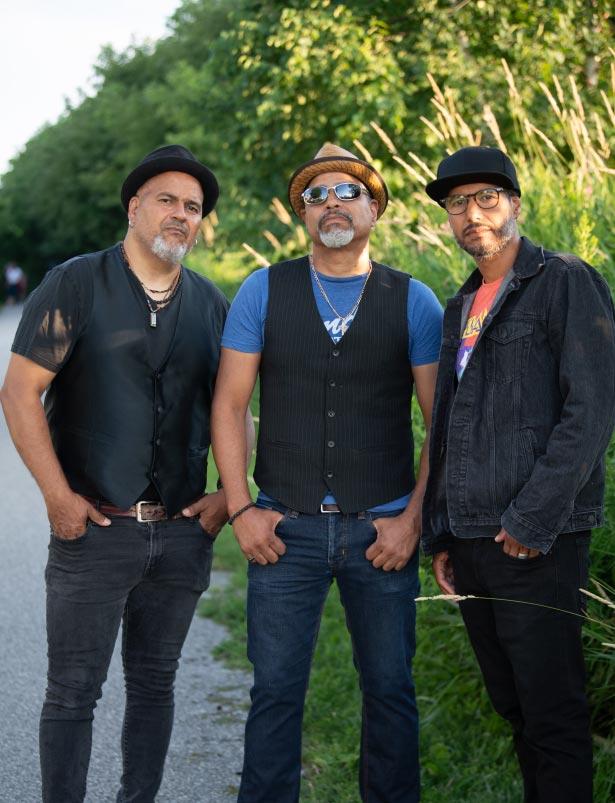
Blackburn Brothers
ALSO IN THIS ISSUE
Al Basile
Cat Squirrel
Puddle Of Mudd
Kim Petras


October
Rock And Blues International

ALSO IN THIS ISSUE
Al Basile
Cat Squirrel
Puddle Of Mudd
Kim Petras

Hello Rock And Blues International readers. I hope everybody had a great September.
Rock And Blues is happy to announce that we have now entered the era of Podcasts. We would really like you to check out our new Podcast Channel - Rock And Blues International - The Podcast. If you like the interviews we feature in our publication, then you will love our Podcast Channel as we feature those interviews in their entirety there. On our Podcast Channel you can actually hear those interviews as they were originally done. Our special guests so far are Coco Montoya, Barry Kerch from Shinedown, Jerry Shirley from Humble Pie, Jim Stapley from Humble Pie Legacy, Kissing Judas,Nick Moss, Devon Allman, Stevie D. from Buckcherry, Chris Henderson from 3 Doors Down, Garnet Grimm from Savoy Brown, Phil Lewis from L.A. Guns, Graham Russell from Air Supply, Robert Jon from Robert Jon and The Wreck, Selwyn Burchwood, J.W. Jones, Chris Henderson from 3 Doors Down, and Warren Haynes from Gov’t Mule. Future podcasts include The Blackburn Brothers, Al Basile, and Wes Scantlin from Puddle Of Mudd. You can check it out on all the major podcast channels as well as at our website at http://www.rockandbluesinternational.com. We hope you enjoy them.
And now on to the October issue of Rock And Blues International. On the cover of this issue you can see The Blackburn Brothers. The Blackburn Brothers have just released their third Blues album, Soulfunkn’Blues. The Blackburn Brothers talked to Rock And Blues International to deliver us all the information on their new release. We will also be having them as guests on the Rock And Blues International Podcast later this month. Be sure to check it out. There are also two more great interviews in this issue. Al Basile talks to Rock And Blues International about his new album, B’s Time, a compilation of his favorite songs from the the last 25 years another fantastic interview in this issue is Puddle Of Mudd. Wes Scantlin talks to Rock And Blues International about the band’s new album Ubiquitous, aw well as about the new tour that starts soon. We’ve also got a great story by Edoardo Fassio about Cat Squirrel. Be sure to check that one out too, it’s very interesting. There are also stories on NIck Landis, Kim Petras, Night Verses, Stephen Marley, Honey Island Swamp Band, High On Fire, and more! As you can see, there are a lot of varied genres of music here for you to check out, or as we like to say, there’s a little of something for everyone here. We have even included the current installment of the novella, “The Biker”. Read it and than email us back with your thoughts on this. So far our readers seem to really like this Blues loving Biker.
I sincerely hope that everybody reading this publication finds something here that they like and I would like to encourage you to let your friends and colleagues know about us. Just look for us every month at http://www.rockandbluesinternational.com. I would also like to encourage you to email us for a free subscription to Rock And Blues International as well. Just email us at rockandbluesinternational@gmail.com and in the subject line simply put “Sign Me Up” and we’ll email you a link to the magazine each month when it is published.
Kevin Wildman Editor and PublisherPage 6
The Blackburn Brothers
Canada’s First Family Of The Blues
The Blackburn Brothers Release Their New Blues Album Soulfunkn’Blues

Page 34
Cat Squirrel
Edoardo Fassio Talks About Cat
Squirrel: Blues from Andalusia, the English Way
Page 20
Al Basile
Al Basile Releases His 25 Year Career



Retrospective B’s Time
Page 36
Puddle Of Mudd
Puddle Of Mudd Release Their New Album Ubiquitous
Wes Scantlin Talks About The New Album, Ghosts, Poisoning, And Losing His House
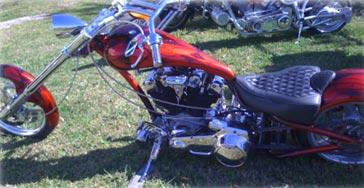
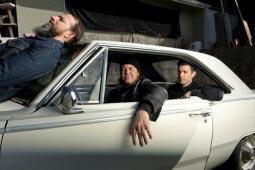
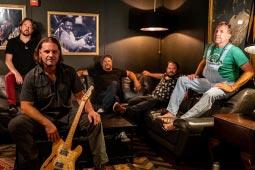
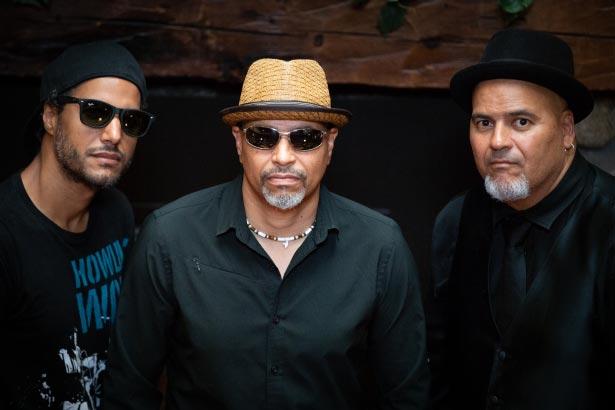 By Kevin D. Wildman
By Kevin D. Wildman
Canada’s first family of the Blues, The Blackburn Brothers, have just released their new Blues album, SoulFunknBlues on the Electro-Fi label. This is the band’s third Blues album and their best one yet. The band just keeps getting better and better with every release. The new album SoulFunknBlues was written during the Covid pandemic and is a real personal album to the band. It was the first time that the brothers were ever isolated from each other in the songwriting process. Normally the band would all gather in a room and work out all their songs together. This one
was done long distance. Long distance in the sense that each brother was writing and doing his own parts separately from their homes in Canada. The new album is just filled up with great hooks, leads, and riffs. Duane’s organ had never sounded so powerful before, Brooke’s rhythm and leads were spot on, and Cory’s drums were all so powerful. Vocals on the album exceeded the band’s expectations, and they were joined by their brothers Robert on guitars and Nathan on bass. The legacy of the Blackburn Brothers goes way back, way back to the days of slavery and the Underground Railroad. They are the descendants of Elias Earls, who traveled the Underground Railroad
to freedom in Canada in 1792. Their existence is an homage to the legacy he leaves behind as well. Their father Bobby Dean Blackburn is a legend in Canada. Starting out performing Rock N Roll in the 50s, Bobby is one of the true originators of the Blues in Canada. He has a legacy of his own that his sons honor with every note they play. The Blackburn Brothers are the First Family of The Blues in Canada.
Now with this new album they show another side of themselves as they get deeply involved in their new album SoulFunknBlues.
continued on next page
These guys put the Funk back in Funky with some of the great songs in this collection. I can visualize Isaac Hayes cruising down the street listening the their fantastic ’70 infused song, “Soul Brother.” I can see people taking notice of them when they break into the riffs of “Let The Devil Play.” With “Freedom Train”, they conjure up the images of a people destined to take control of their lives in a way they never did before. In “Little Sister” they give inspiration to a culture that they put above themselves and pledge to give every brother a helping had. This is more than just an album of songs, it’s a testimonial to a family that has always stuck together by themselves and helped their brothers overcome adversity. This album is a tribute to all the great players that have come before them and will come after them.
I had a chance to sit down with the brothers Brooke and Duane Blackburn and find out everything there is to know about the album, the family and the destiny of this band and it really made for one of the most exciting interviews I’ve ever done, and I’d like to share it with you right now.
Rock And Blues International: Hello.
Brook Blackburn: Hello. How you doing?
Rock And Blues International: Doing fine. This must be Brooke.
Brooke Blackburn: Hey, Kevin, how you doing brother?
Rock And Blues International: Doing good. How about you?
Brooke Blackburn: I’m good man. I’m going to put my brother on the line with us. Okay.
Rock And Blues International: Okay.
Brooke Blackburn: That’s the lead singer.
Rock And Blues International: All right.
Brooke Blackburn: Duane?
Duane Blackburn: Yeah.
Brooke Blackburn: All right, Kevin’s on the phone.
Duane Blackburn: How ya doin’, Kevin?
Rock And Blues International: Fine, how are you doing Duane?
Duane Blackburn: Very good my brother.
Rock And Blues International: All right. So where are you all calling from?
Brooke Blackburn: Toronto.
Duane Blackburn: Toronto, Ontario. Canada.
Rock And Blues International: Canadians. I was actually born in St. John’s, Newfoundland.
Brooke Blackburn: Well Hello. Beautiful. Well, my mother is born in Carbonear, Newfoundland.
Rock And Blues International: Really!
Brooke Blackburn: Yeah man.
Rock And Blues International: Oh cool.
Brooke Blackburn: We’re neighbors.
Rock And Blues International: There you go, there you go. Although I hear the best looking people live in Ontario.
Brooke Blackburn: I suppose I don’t know. So we’re gonna do an interview now with you. Is that cool?
Rock And Blues International: Yeah, you’re gonna do an interview now with me. I have a publication called Rock And Blues International.
Brooke Blackburn: Oh, cool. That’s print media or online?
Rock And Blues International: It’s online. It’s online right now. Can’t afford to
Brooke Blackburn: Yeah. Oh, yeah. Things have really changed.
Rock And Blues International: Well, you’ve got a new album out, “SoulFunknBlues”. I’ve been listening to that lately and it sounds really good. Y’all put the Funk back in Funky.
Duane Blackburn: Yeah, thank you man.
Rock And Blues International: I mean it’s the type of thing that reminds me of Isaac Hayes, Funkadelic, The Isley Brothers, Earth Wind and Fire, that type of music.
Brooke Blackburn: Beautiful. Yeah, a lot of people that we listened to growing up for sure.
Rock And Blues International: Oh, all right. Well, this is your third album?
Brooke Blackburn: The third blues album.
Rock And Blues International: Okay. You’ve done some others.
Brooke Blackburn: Yeah, we did a couple of R&B albums before that. This is the third blues album on on a blues label.
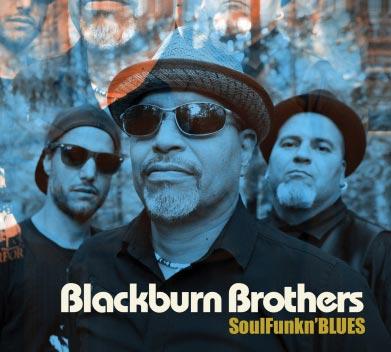
Rock And Blues International: And so what would you say the big differences to you all are between R&B and just the Blues?
Brooke Blackburn: Go ahead Duane.
continued on next page
(continued from previous page)
Duane Blackburn: Yeah, I mean, this CD here, has a more of a funky rock feel to it. The difference? I mean, this is traditional blues, definitely. And a couple other CDs, we put some traditional blues in there and we have some shuffles on this one. Yeah, I think, I think blues you have your traditional end of it. I think you need the modern edge to it, the cutting edge. I grew up on Jimmy Witherspoon, BB King and all the great’s. The reason why this CD has a real funky feel to it is because I think the blues scene is crossing over. It’s going into a little bit of modernizing a bit. We tried to make it a little more crossover so the mainstream public can get a taste of it. I think when it comes to blues, soul and funk, to me it’s all related. We have a song called “Bobby’s Blues”, which is like a minor blues, and might have a funky feel, but it’s built on “A minor” blues kind of kind of foundation.
Rock And Blues International: An homage to your dad?
Brooke Blackburn: Yeah. Yeah. An homage to my dad. Yeah. To our dad, yeah. And so when I wrote that, you know, I was thinking, okay, well, I want to write a slow minor blues and then it’s like, I started writing it and then it felt good and then I did the words and it felt good. Then when we started playing it, it just went into a more of a medium funkier groove.

But it’s still based on a blues progression. And that’s what most of our songs are based on, a blues to R&B progression.
Duane Blackburn: A one, four, five type of thing.
Brooke Blackburn: But they’re rooted in the blues in the sense, because we grew up listening to blues on a soul trip. You know what I mean? Like your Ray Charles, like your BB King or stuff like that. And some of the Blues of Jimmy Smith and Jimmy McGriff and stuff like that, so it was kind of groove based. We all are musicians, so we all kind of grew up with that, but the progression was always basically in a blues progression, and a blues mentality towards it. But still, it was funky and groovy at the same time.
Rock And Blues International: Well tell me a little bit about the first song, “Bobby’s Blues”. It’s an homage to your dad. Tell me a little bit about the lyrics. ‘I did it my way’. What does that mean to you all?
Brooke Blackburn: Go ahead Duane.
Duane Blackburn: You wrote it brother, keep going, you killed it.
Brooke Blackburn: Yeah, well I was just
gonna get Duane to elaborate on the on the ‘did it my way side’. If you asked him that specific question. Yeah, that’s my dad in a nutshell. My dad does everything his way, only his way and that’s the way it’s going to be. He’s been playing since 1955. He’s a very, very confident individual, and very, very strong, and so he’s always basically, if it’s not going to be his way, he ain’t gonna do it, in a sense. I mean, he compromises you know, of course in life, but he wanted to play rock and roll and back in the days of the beginnings of rock and roll in the 50s with Little Richard. and then Fats Domino, which is all blues, based music and with a different groove, with a rock and roll groove, which is like the soul of rock and roll as far as I’m concerned. So my dad is always kind of wanting to do it his way and he’s been doing it now since 1955, his way. And when I wrote the song, it’s a homage to my dad, but it’s also a homage to Ontario and to Canada in the sense of some of the things that the average person might not recognize. Were you were you raised in St. Johns too?
Rock And Blues International: No, not really. I left at early age.
Brooke Blackburn: Okay, so do you remember the Avro Arrow?
Rock And Blues International: No.
Brooke Blackburn: Okay, okay. Yeah, you probably left before that. After that I should say.
Rock And Blues International: I was a kid.
Brooke Blackburn: Yeah. Okay. So the Avro Arrow was a plane that was built in Toronto, basically at the Toronto Airport or the Moulton. I mean, they used to call it the Moulton airport at one point, but it was like the De Havilland back in the day and it was the fastest plane, the most agile warship basically that was ever built. It had a Rolls Royce engine in it and it went under radar and could go over top radar. It was the absolute pristine gunship. I don’t know what you call it.
Duane Blackburn: A plane.
Brooke Blackburn: Yeah, it was a plane. And they canceled it completely because of Diefenbaker. Remember Diefenbaker?
Rock And Blues International: No.
Duane Blackburn: He was the Prime Minister of Canada back then.
Brooke Blackburn: Yeah. Yeah. You left when you were young.
Rock And Blues International: I was really young when I left.
Brooke Blackburn: Yeah, well Diefenbaker was a Prime Minister of Canada at one point. And there was that basically the United States didn’t like the fact that Canada had this super, super plane able to do things that other planes couldn’t do.So they basically had a little discussion with Canada and said, we’re
continued on next page
not too happy with this and if you don’t destroy it, we’re an ally, but yet we might think about something later on. It might be used against you. So they destroyed every little bit of it. The Avro Arrow was a plane that was going to revolutionize the aviation industry in Canada and basically they scrapped everything. So that’s part of the Avro. There’s a couple of books about the Avro Arrow here in Canada and then in 1954 there was a hurricane that hit Toronto. It was called Hurricane Hazel and it hit Toronto in 1954 and I’m sure it hit the states too. It was the only hurricane we’ve ever had here and my dad was an Air Cadet so he had to go into people’s houses and pull them out. He lived in the north part of Toronto. There was a major river in the west and north, a part of Toronto called the Humber River, and Humber flooded. It flooded all these houses and people were literally, they’re caught off guard. So his job being an Air Cadet at that time, was to get people out. So I wrote about that, the Avro Arrow I wrote about, about Hurricane Hazel. And I wrote about my father’s experiences playing blues since 1955 in Toronto, and he opened the original Blue Note in Toronto in 1959. There was a lot of clubs in Toronto where my father was a house band for and right now they don’t exist anymore. The Zanzibar Tavern, he played the Colonial Tavern, all these places that don’t exist anymore. My father was like a staple in Toronto, so I wrote a little bit about that too.
Rock And Blues International: Cool. Well, Duane, I love your piano solo on this song.
Duane Blackburn: Hey, yeah, that was a spur of the moment thing. I was over at the studio, my brother’s studio and he said, you got throw some piano on this and throw a solo on it and I just did I. That was the one take job right there.
Brooke Blackburn: Yeah, yeah it was.
Duane Blackburn: There was a lot of space in that solo, wasn’t to overly, not not too many licks. You know, I like it. I heard it back. And I was like, yeah, it works. Use it.
Rock And Blues International: It’s very tasty.
Duane Blackburn: Yeah, thank you, I appreciate it.
Rock And Blues International: In fact, I really love the organ throughout the whole album.
Duane Blackburn: Yeah, you know what, that’s funny you should say that. All my organ tracks are live off the floor. And you know what, we basically have my brother’s studio.
We go down there and lay down the bare tracks. I actually rehearsed the songs and he set up the mics so they recorded nice and good and the levels are all right. My brother and my cousin Nathan Blackburn came in with the songs and we just sat down and played them. And those are all one take, learning them the same day off the floor and this worked, so we kept it.
Rock And Blues International: Alright, is that a B-3 that you’re using?
Duane Blackburn: Yeah, that was a B-3 with a 750 solid state leslie, so it has a different sound. Solid States a lot different than the analog tubes, 122 leslie, you know.
Rock And Blues International: Right.
Duane Blackburn: That’s what I usually use. But this one here is a, it’s a solid state and it has a different sound and I think I was using the C-3 on that. Was it a B-3 or C-3. I think it’s a C-3.
Brooke Blackburn: Which one, dad’s?
Duane Blackburn: The one we used on this album here? Yeah, we used dad’s one on that one.
Brooke Blackburn: Yeah, it was. I think it was, good question, it could have been a C-3. I don’t know. What’s, what’s the one he has up north now, A-100?
Duane Blackburn: Yeah, A-100 B-3 He has a few of them up there. But yeah, I’m not sure which one it was but they had a different sound. Little muddy, very muddy sound, but it was cool.
Rock And Blues International: Is that C3 as heavy as the B-3?
Brooke Blackburn: It was a little smaller.
Duane Blackburn: The C-3 bigger. I don’t think it was, I think it was... I think it was a M-2 wasn’t it?
Brooke Blackburn: No, that’s the M-3. That’s what I have my house.
Duane Blackburn: No, no, I think the C3. Yeah. I think Brooke, I think it’s a little small. So it’s a little smaller. Yeah.
Rock And Blues International: All right. Let’s talk about he next song on there. “She’s A Heartbreaker”. I know that that was written by Robert, right?
Brooke BlackburnThe oldest brother. Yeah.
Rock And Blues International: Are y’all able to talk about that song a little?
Duane Blackburn: Yeah, yeah, yeah, that’s a great tune. Actually Nathan, my cousin Nathan played bass on it. And Robert like I said, they brought it to the studio and we just... They were working on their parts and I did like the heartbreaker. I said, yeah, this would be nice, put a little bubble on there, a little organ bubble. And yeah, it worked out good. It’s a great little tune. It’s like a good crossover. It has a nice bluesy feel to it too. And I like the one, four, five changes and yeah, it worked, it worked well.
Rock And Blues International: Well, I liked several things on there. I love the lyrics, “she’ll play you for a fool and she’ll tear your heart in two. Was that about a friend of his at one time?
Duane Blackburn: It might have been, I didn’t ask him that, but he’s been married for 30 years, so I doubt it.
Rock And Blues International: Well the horns on this song were spectacular as well.
Duane Blackburn: Yeah, that’s Neil Brathwaite and Ted Peters. Basically over the pandemic, we said hey, listen, these trucks are done. See what you can do on it, sent it to them. They did it in their own place and they sent them back and we just did some edits on it here and there and they came up with some great stuff.
Rock And Blues International: I loved it.
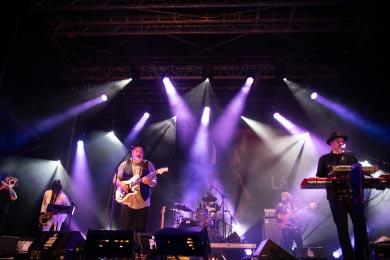
(continued from previous page)
Any song that you had the horns on here were just really good. Yeah, the big things that stand out are the guitars, the horns, and that organ.
Brooke Blackburn: Beautiful.
Rock And Blues International: I don’t know if I’m listening to the right stuff, but that’s what I’m getting.
Brooke Blackburn: Yeah, no, yeah, that’s a big part of our sound. The song that I like to emphasize is “Let The Devil Play”. We had Paige Armstrong playing on that.
Rock And Blues International: Yeah, he did the guitar solo.
Duane Blackburn: Yeah, he did the guitar solo on that. We had maybe about three or four different bass players on this and about three different guitars. Robert played guitar, Brooke played guitar and Paige played guitar. Yeah, we had a lot of different friends and family on this one. Yeah.
Rock And Blues International: A lot of variety.
Brooke Blackburn: Yes, absolutely. What I liked about the guitars is it’s not overly guitar and I’m a guitar player,. It’s not an overly guitar driven blues album. It’s a musical album to me. Songwriting, because I do a lot of that. It’s important that you have good songs that can be played on electric guitar and acoustic guitar, a little piano was sitting in the corner. To me that’s, if not more important than having great guitar solo or piano solo or whatever. So the songwriting I wanted to be as musical as possible and the message to be out on each song.
Rock And Blues International: Right. Well, the guitar solo on the song, “Let The Devil Play”, that was wonderful.
Brooke: Yeah, that’s Paige, a friend of ours, Paige Armstrong.
Rock And Blues International: He did it on the third track also?
Brooke Blackburn: No, he only played on one song.
Rock And Blues International: I’m talking about “Let The Devil Play”, the third song on there.
Brooke Blackburn: Yeah, that’s Paige.
Rock And Blues International: Okay.
Brooke Blackburn: “Let The Devil Play” is Paige.
Rock And Blues International: Okay, well, that was good. That was a really good one too.
Brooke Blackburn: Yeah.
Rock And Blues International: “Let The Devil Play,” what is the devil playing there?
Brooke Blackburn: That’s just a take on, they said that blues music is the devil’s music, and they used to say back in the day, that black men’s music is the devil’s music too. It’s just a little spoof on that basically, that the music played is the concept. They might have called it devil’s music, but that’s music that was contemporary, music that came from the church. They didn’t want it to leave the church. They didn’t want it to be secular. And then people from the church, the musicians, the singers, went into the secular market and played music that they knew, and changed the groove up a little bit and might have used gospel changes, but that changed the groove up a little bit and the church wasn’t too happy about it, because it felt like it was taking away some of the people from the church, but it was just basically bringing it to the masses, introducing
black music in that sense to the masses of people. And then of course, there was a crossover during the Rock and Roll days, so it crossed over and brought black American music to the world.
Rock And Blues International: Okay. I listened to “Soul Brother” on here, the fourth song on the album and I’ll tell you, that sounds like it’s directly out of the ’70s.
Brooke Blackburn: That was exactly what we were going after. Definitely.
Rock And Blues International: Well, I’m picturing Isaac Hayes driving down the road in his Cadillac, listening to that.
Brooke Blackburn: Yeah, yeah, yeah, yeah, Isaac Hayes. Yeah. You know, Isaac Hayes and a lot of people from that time, that era. You know, to me, I’m a little bit older than Duane, but I grew up listening to the music of the 60s and the 70s. I used to have those compilation albums, the Motown compilation, the Atlantic compilation albums and all those compilation albums. So I grew up listening to that funky soul music of that era and I also watched movies from that era. At that time in the late 60s and early 70s, when you saw a movie that had black people in it, that was like a big thing that, especially coming from Canada, is that you finally see a movie with people that look like you. So those movies always had these funky kind of rhythm section type of stuff in behind. So I grew up listening to that and it was like, well, let’s do a funky tune and “Soul Brother”. Our house was full of soul paraphernalia, big hands up, the power, the power hands and it was everything and the blacklight photos, things up on the wall and all 70s. I grew up in that era. I was young, but my parents grew up in the 50s, 60s and 70s and by the time the 70s came it was all about that and the psychedelic funk, like the stuff with The Meters and stuff with bands like that, cuz we grew up listening to Les McCann and that kind of groove and then listened to James Brown. And when you got to like on the one type of funk track, that one is big. That’s that was a big sound of the 70s. And that’s what “Soul Brother” has in it.
Rock And Blues International: How old are you?

Brooke Blackburn. 60, I’ll be 60 this year.
Rock And Blues International: Oh, you’re just kids?
Brooke Blackburn: Yeah. Tell that to my joints when I wake up in the morning, and I gotta get out of bed.
Rock And Blues International: I’m 70. I grew up in the 60s and the 70s. and you’re talking about the blacklight posters. And that was my room.
Brooke Blackburn: Yeah. Yeah. And the lava lamps. Later on was lava lamps was my generation, I guess when I was about 12 - 13. We had blacklight posters.
Rock And Blues International: Yeah, I
continued on next page
had the big Hendrix poster with like 400 colors.
Duane Blackburn: Yeah, those are cool. My cousin Ricky had those in his bedroom.
Brooke Blackburn: I love the 70s man. I mean, in that way, like when you listen to the funk stuff that came out in the 70s man, it was killer. It was killer as far as I’m concerned. When you listen to the soundtracks of the 70s, listen to the TV soundtrack, Sanford And Son, Barney Miller. Killer musicians doing this shit.
Duane Blackburn: Yeah, yeah, yeah!
Rock And Blues International: Well Brooke, you wrote this song, so tell me a little bit about the lyrics on this.
Brooke Blackburn: “Soul Brother”.
Rock And Blues International: Yeah.
Brooke Blackburn: Yeah, “Soul Brother” basically is to me, like I said, watching the movies back in the day and whether it would be a.... They call it blacksploitation movies, but they’re also very powerful movies. And I watched many of those movies and they always had a, like “Shaft” or “Robert Roundtree”. That was a very powerful, strong figure of a black man that basically was a family guy, but he just didn’t put up with the crap that was happening, whether it be the civil rights movement, or whatever. And he had a powerful kind of strength. So that’s when I wrote about a soul brother. The concept of this guy is a guy who is very cool, very slick. He’s got the platform shoes with the fish. You know, like he’s very cool, dressed very hip, very casual, got the hat, might have the Cadillac or their Lincoln back then. And it was like, he still came home to his family. You know what I mean? That’s what we were brought up with. My father always came home. He was always downtown with all his friends, but most of his friends didn’t have the family life like he did. I mean, he always went on the road for months and months at a time, but he always came back and I guess that’s the power of the soul brother. That’s the kind of thing that I wanted to emphasize in that song. That he’s cool. He’s slick. He lives, he does his thing downtown and looks like he’s got the power. But he still comes home and he’s a family guy. It says that in the chorus.
Rock And Blues International: Yeah. I had the platform shoes too.
Brooke Blackburn: Yeah, yeah, yeah, there you go. Yeah.
Rock And Blues International: Well, you wrote the next song too, “Won’t You Let Me Go”. Now, this is a breakup song, isn’t it? You’re breaking up with somebody?
Brooke Blackburn: Yeah, that’s a song that I wrote about a lady that was kind of connected to me and we were together for a minute. And then we became kind of close as friends for a long time, but she was always sort of still had that wanting to be.... It’s about a relationship when somebody is still close and you want to be friends, you want to still keep up that connection, but you go your own way and they go their way, but maybe they don’t go their way. And they still hold on. So basically, that’s kind of a autobiographical song that I wrote which is the blues. It’s a straight blues, that song. It’s kind of funky. It’s kind of a little bit more contemporary, but it’s a straight blues tune.
Rock And Blues International: Was she still holding on to you?
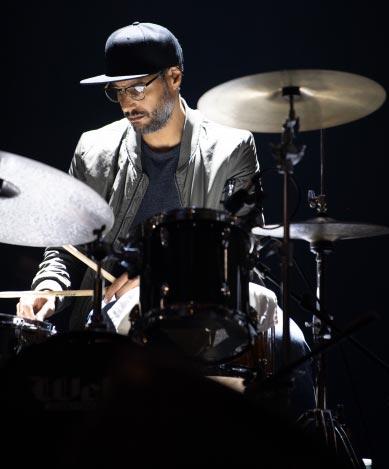
Brooke Blackburn: I’ll keep that to myself. Not really, no, no, no, no. We’re just friends. We’re just friends. Everybody goes their own way, everybody goes their own way. No, no, not holding on to me. No, I have a lady in my life.
Rock And Blues International: Okay, but she was pretty clingy back then?
Brooke Blackburn: Well, you know what it is, man. It’s like, it’s kind of like, you don’t want to be... I want to put this in perspective, but you don’t want to be somebody’s mistake. You understand? You don’t want to be somebody’s for a day. They gotta love themselves before they love somebody else. And that’s basically what the song is about. You got to learn to love yourself before you can love somebody else. And I don’t want to be somebody’s good day. I want them to have a good day and I want to be part of that. You understand?
Rock And Blues International: Right.
Brooke Blackburn: I want to be better than that. I don’t want to be the reason if you’re not with me, your day is not as good as it was yesterday. I don’t want to be that. I want to be just you and you and me and us. I always tell that to anybody, it’s like you got to have your life. They have to have their life and then together you have another life. As far as I’m concerned that’s the way I look at life.
Rock And Blues International: Okay. You’ve got so many great original songs on
(continued from previous page)
here, but then right here in the very middle of everything you’re doing the Neville Brothers “Sister Rosa”, so what made you pick that for this album?
Brooke Blackburn: Basically, it’s a great message. It’s a great groove and it was one of those songs that we play live that a lot of people respond to. So we thought we’d throw it on the CD this time around.
Duane Blackburn: A lot of people asked for it, so we threw it on there. And our message also is very strong in the Civil Rights sort of concept and our family comes from the Underground Railroad, if you know anything about coming up through Kentucky to Canada.
Rock And Blues International: You were like the last stop up there in Canada.
Brooke Blackburn: Exactly. Actually our family has an August 1st Family Picnic and the Family Emancipation Picnic is in the most northern terminus of the Underground Railroad. And so that’s in Owen Sound, Ontario, about two and a half hours north of Toronto. And yeah, so we’re the final stop we should say, in Ontario.
Rock And Blues International: The sax on that song was fantastic.
Brooke Blackburn: The sax, yeah.
Duane Blackburn: Pat Perez. Pat Perez.
Brooke Blackburn: Pat Perez.
Duane Blackburn: Pat Perez at Toronto sector. I think he played with Neil Diamond for a while.
Brooke Blackburn: He played with... not Neil Diamond, Neil Sedaka.
Duane Blackburn: Neil Sedaka, that’s right. Pat does play with Neil Sedaka when he’s
around. There you go.
Brooke Blackburn: I think Neil’s still around as far as I know. I don’t know how much he’s playing these days, but he was with Neil Sedaka.
Duane Blackburn: He’s another reason I like it. He does a great solo on that.

Brooke Blackburn: Great solo. He’s from Niagara Falls, New York, originally, but he’s been in Toronto. We have a music school here called Humber College, which was a very jazz focused school. And a lot of cats in the 80s came up to Canada, like you have your Berkeley and you have your GIT and all these different ones. And that was Canada’s Music School for Jazz and R&B and Funk and stuff like that. So he came out of that. He came from New York to Toronto to go to school there in the 80s. And then everybody stayed, because Toronto really is a Music City.
Rock And Blues International: A lot of clubs, I guess.
Brooke Blackburn: Yeah. Yeah, there was more back in the day and then COVID took a lot out of us. But yeah, we’re starting to build back and there was clubs. I mean, back and even back in the in the 60s, a lot of the musicians used to come up here to play and then in the late 60s, early 70s, a lot of the people who didn’t want to basically die in Vietnam, came up here to play. A lot of American musicians came up here to play so it was pretty crazy. Clubs here on Young Street and are synonymous, Queen Street West is synonymous like the Bamboo is a place that we used to play in Toronto, the Horseshoe Tavern. And then you got Spadina with El Mocambo that is very popular around the world because the Rolling Stones played there when they came here. And there’s The Silver Dollar, so we’ve had very iconic clubs in Toronto, worldwide iconic clubs. The last one that we played in just before close was a place called the Orbit Room
in Toronto, which was a classic, classic, iconic club that closed down to COVID... Live music 24/7.
Rock And Blues International: Now the next song on here is, “Why Do I Do What I Do?” Duane, you wrote that, didn’t you?
Duane Blackburn: Yes, yes, yes, yes. Yes. Yeah, that’s a great.... I think it’s what I call that my cruising tune. That’s a tune you just put on and it has a little cruising vibe to it. Everybody’s been in relationships with somebody they liked and loved or whatever, and they lost them and there trying to get them back. Story of life, right there.
Rock And Blues International: Yeah.
Duane Blackburn: Yeah, I think I like the organ and that nice little organ bubble going down. I love the bass line. The bass line just carries that thing for me.
Rock And Blues International: Well, I was listening to the lyrics and you know she has a man, but you’re gonna wait for her...
Duane Blackburn: Yeah, I know you have a man, but you know, I understand. You know, and I understand. Yeah, if you need me here I am. What’s wrong with that.
Rock And Blues International: Aren’t you kind of poaching there?
Duane Blackburn: Like I said, I ain’t messing with you, I know you have a man. I ain’t messing with you, but if it doesn’t work out, here I am. What’s wrong with that? That ain’t poaching. Poaching is like she’s messing with him, and he’s messing with the woman when she was married. I ain’t saying that. I ain’t saying that at all. I said if that should happen, here I am. What’s wrong with that?
Rock And Blues International: Nothing’s wrong with that. At least you let her know you’re interested.
Duane Blackburn: Absolutely, but go on with your life and still live your life. But if it doesn’t work out, that’s all I’m saying.
Rock And Blues International: Well, was that a true story?
Duane Blackburn: No, no, I just made it up.
Rock And Blues International: Oh, okay. You sure?
Duane Blackburn: Yeah. I was at the studio. You know what? I’m going to put some relationship vibe stuff on this because Robert wrote, “why do I do what I do, and I said “why do I do what I do?” So, okay, let me build off of that. My brother Robert, my older brother.
Rock And Blues International: Right.
Duane Blackburn: Yeah, so I just built off of that. And I took it home and came back the next day. And that’s where we were at. I never can forget you. Everybody has a certain
continued on next page
love in their life and can never forget and that’s just the way life is. I think a lot of people can relate to that.
Rock And Blues International: Yeah. Yeah. Without a doubt. Okay. And Brooke was next on “Be My Wife”. Did you write that for your wife?
Brooke Blackburn: No, no, I wrote that. I wrote that because I was married for 17 years and I was in a very loving relationship and my wife passed away. And later on in life, about 3, 3 or 4 years later after she passed, I met a lady. And she was, ready to commit and have a relationship and have kids and everything and I had my kids. And I was married. I was very happily married. It was like, Okay, well, I can’t marry you. I appreciate it. I love you and all that I can’t marry. It’s just my head space is not there, but I’ll write you a song about it. That’s the best I can do. And that’s what “Be My Wife” was about. So my intentions were there, but it just wasn’t the right time. And it was it worked out exactly the way I planned because now she’s married and she’s got kids and it was just that situation, you know,
Rock And Blues International: So, she’s not your puddin’ pie anymore.
Brooke Blackburn: Not my puddin’ pie, no, not my puddin’ pie.
Duane Blackburn: You like that lyric. We had a good discussion about that lyric for about two days.
Brooke Blackburn: Yeah, we did. I remember that. Because it’s kind of back in the day. like nobody kind of talks that way anymore.
Duane Blackburn: Yeah, that’s old school. That’s real old.
Brooke Blackburn: Yeah, old school. So it’s like, well, you know, I’m an old school writer. I like writing things like that. And I don’t think people even use the word.
Duane Blackburn: I don’t think I’ve ever had a puddin’ pie in my life. What is a puddin’ pie. I’ve never had a puddin’ pie.
Brooke Blackburn: That was chocolate puddin’ pie.
Duane Blackburn: Chocolate puddin’, yeah, I don’t think I’d be eatin’ that.
Rock And Blues International: I had puddin’ pie when I was a kid.
Duane Blackburn: Yeah, you’re just too old, that’s what it is.
Brooke Blackburn: Yeah. have a little puddin’ pie. It’s just means a soft lovable little treat, you know.
Duane Blackburn: Yeah, yeah, yeah, I’m just teasing.
Brooke Blackburn: But it’s a cool song I like the tune. Duane’s singing is so good on that tune.
Rock And Blues International: I really love your writing. I love the lyrics to these songs, they’re very unique. They’re obviously very much you, your family. These lyrics are not the sort of thing I’m getting to hear out of a blues band out of Texas.

Brooke Blackburn: Well, you know, it’s funny, because when people ask me to write, or I’m writing a song, the easiest thing for me to just take it from my own experiences. I could feel a groove, I can write about it, it just flows, because all I’m doing is going back in my memory. If I’m writing something about something specific that I have to research, then I have to research that for somebody else. But you know, when you’re writing for us, for our band, It’s like, well let’s just write about what we know, it’s simple, it’s easy. It might not flow today, but all the memories come back. And then you just write about that experience, and then go on to the next and also, it’s good to write about things. There was a song on our previous record called “I Can’t Go Home.”
Duane Blackburn: Yeah, “I Can’t Go Back Home.”
Brooke Blackburn: That was a song that I wrote about my late wife, because I can go home to the house that we shared, but you’re not there anymore. So it’s not the same home. So all that was medicinal for me to write about basically that kind of thing. This album was basically almost autobiographical in certain things for me, like “Freedom Train”, and certain things like that, certain songs, and “Soul Brother” cuz I grew up in that era. I grew up in the ’70s. I mean, I was 10 in 73. I started playing live and ’78, ’79, live in clubs. So I tasted the 70s, and what you’re going to play live in the clubs in the 70s, and stuff that’s out in that time. So the music of the 70s and the 60s in the 70s was stuff that I played in clubs.
Rock And Blues International: Well, let’s talk a little about “Freedom Train”. You mentioned that. That’s the next song on the album. ‘Time to make a change.’ So what are we talking about there? It sounds like your trying to unite your people.
Brooke Blackburn: Yes, it’s a little bit of that, it’s a little bit of, it’s time to make change in the sense of, to be truly free is to walk down the street, and have that person that is walking the same side of the street have no fear, have no qualms. It’s just another person, another neighbor. Freedom, the true freedom is to love your neighbor, love the people who are with you, because we live in a very multicultural society here in Toronto. It’s one of the most multicultural diaspora’s in the world is Toronto. And it’s just like, you just see people from everywhere, and everybody kind of just gets along and that’s what I think true freedom is. Of course, the freedom of being an enslaved person coming up through the Underground Railroad in the mid 1800s to.... because in Canada, slavery was abolished in 1834. In 1863 or 1865..... 1863 is when they wrote the Emancipation Proclamation in the US, but really not until 1865 did everybody stop being enslaved. That’s why they call it Juneteenth. It was the scenario, so coming to Canada, being free, coming in this modern day with Black Lives Matter with the killing of George Floyd, the way that guy just like felt like oh, yeah, I can do this. I’m not gonna get punished for it. That’s not freedom until everybody is equally punished for whatever they or equally understanding that everybody has got a right to be on this earth. I saw a movie yesterday at the Toronto Film Festival about... It was called “Origin”. Heavy movie. It a situation that everybody’s got to be free in order for one to be free. Like The Untouchables in India. The Untouchables is people that they don’t classify them in the same respect that they do other people and that’s basically what the song is all about. Freedom and the freedom train and the freedom for our people that came up through the Underground Railroad. Freedom that they don’t want to be stopped by police and be labeled as a certain individual before they get a chance to open up their mouth and say hello. I mean, that’s why I wrote that song and with all the things have been happening, since Trayvon Martin got killed, and all these different people
(continued from previous page)
got killed. It was like, it’s not gone, no matter what people think. We still gotta let people know that true freedom is to be loved by your neighbor, is that not to be looked at and just labeled because of this color your skin or or what religion you you decide to practice.
Rock And Blues International: Okay, so this song was a bit of a nod towards, the Underground Railroad also.
Brooke Blackburn: A little bit, a little bit, yeah, because Voices Of Freedom Is where we shot the video. Voices Of Freedom is a park that was a place that was kind of celebrated for people that came up to the Niagara region, to the Niagara River and literally walked across the river at certain shallow spots for freedom. That’s where we shot the video. If you look up on YouTube, lookup “Voices Of Freedom” and you’ll see us singing that song, Duane singing it and us playing it. It really tells you a little bit about what it is in life. You’ve got to remember your past in order to go forward and that’s the
concept of this song. Okay, we want to get forward, wanna live in a free society, wanna live in a society that everybody is judged equally. You’ve got to remember where you’ve come from in order for that to happen, where you don’t repeat the past.
Rock And Blues International: Yeah, there’s a saying, something like those who don’t remember the past are doomed to repeat it.
Brooke Blackburn: Exactly. Exactly. Exactly. Exactly. And we wrote a song, myself and my brothers before, one called “Talk To Me” That’s on a previous albums called “Brothers In This World”, or “Brotherhood” I can’t remember which album.
Duane Blackburn: It’s on “Brotherhood”, “Brotherhood”, “Brotherhood”.
Brooke Blackburn: Yeah, and that’s about the Underground Railroad, stuff like that.
Then I wrote a song called “Africa”, that is on the first album that we ever recorded and that was basically about the “Apartheid”. So if you don’t remember “Apartheid”, you don’t think “Apartheid” ever existed, that the President of South Africa was jailed for like 18 years or 20 years. You know, at one point, Nelson Mandela, then you tend to repeat it.
Rock And Blues International: Right!

Brooke Blackburn: You know what I mean?
Rock And Blues International: Well, I remember all that stuff. But then again, I’m an old fart.
Brooke Blackburn: Anyways, anyways, you’re not that old, seventy is not that old.
Duane Blackburn: 70 is the new 30. There you go.
Rock And Blues International: That’s how I feel.
Brooke Blackburn: It’s all it’s all a state of mind. That’s exactly how it works.
Rock And Blues International: Well, the good thing about my age is I’ve been able to spend the last 50 years in clubs on weekends.
Duane Blackburn: Right on, right on man.
Brooke Blackburn: You’re playing, are you’re playing?
Rock And Blues International: Well. I don’t really play. I used to be in a band when I was a kid, But, but nothing now. Now I’ve just been doing magazines for the last 43 years.
Brooke Blackburn: Excellent. Excellent.
Rock And Blues International: Music magazines.
Brooke Blackburn: So you’re a journalist. You’re a music journalist, basically. Right. You’ve been doing that as a full time gig for 43 years?
Rock And Blues International: Yeah.
Brooke Blackburn: Oh, good for you, man. That’s great. Good for you, man.
Rock And Blues International: Yeah. What can I say? I’m still looking for a job.
Brooke Blackburn: You and me both man. You and me both. I’ve been doing full time music for about probably, I don’t know. 25 years, 20 years. 20 years. I mean, I was always working prior to that. Just before my wife passed I went full time music and you gotta keep hustling, man. You gotta keep hustling. Just like anything, journalism anything, you’re really working for yourself as a freelance.
Rock And Blues International: Well, our next song on here is “Little Sister”. “Everything is going to be all right and change is going to come”. So what is the underlying message to
continued on next page
(continued from previous page) this?
Brooke Blackburn: Oh, well, my brother Robert wrote that one. What he says about it is, rapid change is gonna come. Some people are down. You bump into somebody and you haven’t seen them in a while and they’re not doing too well and you do what you can to help them out. You’re give them positive direction if you can.
Duane Blackburn: Yeah. It’s also, like, we got your back too.
Brooke Blackburn: Yeah, yeah, absolutely.
Duane Blackburn: If you need some help just just reach out, you know.
Brooke Blackburn: Yeah, we grew up in a neighborhood where there’s lots of.... Growing up in the 80s and a lot of people were down on their luck, you know, mortgage rates when interest rates went through the roof and stuff like that. The drugs came in to the scene back then, and a lot of people messed up. So, I think it tells you about that vibe. You can be down but you know, there’s always ‘we got got your back, I got your back.
Rock And Blues International: Okay, okay. And Brooke, you wrote the last song on here, “I Don’t Ever Want To Be Alone”. Do you have a fear of being alone?
Brooke Blackburn: Well, I’ve been told, I’ve been told. A lady friend of mine from my previous life basically said, ‘you never want to be alone’, because I went from girlfriend to girlfriend after my wife passed. And it was like, Okay, well, maybe I don’t. I don’t know, I live alone. I live by myself. So I don’t know about that. But I just elaborated on that and said, I don’t know if anybody really wants to be alone or lonely. But especially through COVID when I wrote that song in COVID. So I was home by myself for two years basically. And when you’re at home by yourself for two years, and you try to keep busy, I wrote a bunch of songs over COVID. A bunch of songs over Covid, and almost an albums worth or an album. It was just like, all these ideas popped in my head, I could have sat at home and watched Netflix, and even get more lonely. But it was like, forget it. I’m not a lonely guy, but I do live alone. When she told me that, it’s like, okay well that’s interesting. I never thought that I ever, that I don’t ever want to be alone. But I just put that in perspective and listened to what she said. And it’s like, okay, well if that’s the point, if I am like that, and I look for relationships like that, we’ll let me write about it. Let me see if that’s true and I guess maybe it was true at one point, especially being alone for two years in your own house here.
Rock And Blues International: Oh, well, I can relate to that. I had been doing a local music publication in Houston, Texas, since 1982. When COVID hit all the clubs shut down. I was out of business. So I’m sitting there and I went through the first week thinking, Well, you know, I could use a little break. By the second week, I was pulling my hair out.
Brooke Blackburn: I gotcha.
Rock And Blues International: So I started this magazine that we’re doing the interview for. So I started in international magazine, because regardless of what was happening in that one location of Houston, there was music happening all over the world. Well, I just, I couldn’t sit still.
Brooke Blackburn: Exactly. And that’s why a lot of the songs on this record were kind of put together through COVID. We might have had the ideas prior to COVID and laid some of the bed tracks before COVID. But soon as COVID hit, it was like, well Duane’s not gonna sit around, Cory’s not going to sit around, I’m not going to sit around, Robert is not going to sit around and Nathan’s not going to sit around. So we just ended up sharing tracks and playing, playing as much as we can, sharing tracks and creating other tracks and writing songs and adding to it. So again, we were alone in our homes. I mean, those who had families are not alone. But, you know, I was alone and is was like okay, I’m wanna send... I’m just to the point that I was sending so many tracks to our producer, that it was like, man, what are you doing sending me all this” I’m like, well, I’m not just sitting around doing shit, I’m gonna sit around and do stuff, I’m gonna send music and I get excited when I send music. I send it to call Duane. I sent it to Cory. And it’s like, check this out, check this out, check this out. Because, I get I get into it and that’s the way I kind of fought my loneliness. was just keep on being creative. And I think that’s the theme, like you started your online magazine, international magazine, at home. You said, I’m not going to sit around and wait for this pandemic to be over, I’m going to do something while I have the time and that was your choice. You could have sat around and watched Netflix for two
years like a lot of people did, gain 30 pounds, but you didn’t and that’s the main thing. You said, Well, what else can I do? And you and I, I mean, you’re only 10 years older as me, but a lot of these things I never thought of ever doing before online ever. You know, I’d wait until we got together, Duane and Cory and I. We had a house gig in Toronto every Thursday for like 12 years and I’d write a song during the week or Duane would write a groove or write a song or Cory would, and then we bring it to the gig, and say, okay, well I’m gonna get it ready for Thursday and then we’re gonna get together, we’re gonna work things out right on on the gig. It was that kind of room that we could do that, but not during a shutdown. So I had to learn how to record and send tracks and send those tracks and use, we transfer, and all these different things that I’ve never done before. And record all these support, record parts that I hear in my mind on different instruments that I hadn’t played that much and then I sent it to Duane and said can you put a real piano track on here? And you send it to a bass player, can you put it real bass track, or vocals or drum track or whatever? Cory sent me a bunch of loops. My baby brother sent me a bunch of him playing loops at his house. So he recorded his own playing, sent it to me, then I put it in a song, send it back to him with that, in that context, and then he would put his whole set of drums on it kind of thing, and then go from there. But it was all organic, and real instruments as much as possible.
Rock And Blues International: See. For people like you and I that was a growing period. If that hadn’t hadn’t happened, we’d probably be still stuck in our old ways.
Brooke Blackburn: Exactly.
Rock And Blues International: But it brought out something we didn’t even know we had in ourselves.

Brooke Blackburn: Yep. Yep, I agree. 100%, 100%. I never thought I would ever send like 10 tracks. Sometimes my brother would send me stuff that I would try to do, but I would never think of building a whole song and
continued on next page
getting it recorded completely. Duane’s on his track, Cory’s doing his stuff, our bass player’s doing his, and then going to the point of ‘this is okay to press’. It’s like, we always play to a rhythm section together all in one room, forever and ever. But if you can’t be all in one room, what do you do? You know, wow.
Rock And Blues International: How far were you all separated?
Brooke Blackburn: I don’t know? Duane.
Duane Blackburn: Yeah, we’re a fair distance, about 20 miles. Yeah. Not bad. I mean, yeah, things shut down. You weren’t allowed to see nobody. So yeah. Yeah. It’s not that we weren’t allowed. We could if we wanted to.
Brooke Blackburn: Canada, Canada and US... Canada had some pretty strict laws.
Duane Blackburn: Not laws. Yeah, I guess you’d call them laws. Yeah, there were laws. Yeah.
Brooke Blackburn: At one point, if that person didn’t live in your house, you can’t see anybody else.
Duane Blackburn: Yeah.
Brooke Blackburn: At all. Period. And you can get fined for it.
Rock And Blues International: Right.
Duane Blackburn: Right.
Brooke Blackburn: At one point in Canada, you know.
Rock And Blues International: We were getting things like well, we don’t want to see you on the streets. You’d better have a good excuse for being out there or we’re taking you
somewhere else.
Brooke Blackburn: Oh, yeah. Yeah. The states was a little bit different than Canada and we were just trying to not let this extend. You don’t want anybody sick. When you’re in your house, you’re in your house. You put your mask on, you go shopping. That’s about as far as you were allowed to go. And the streets were bare man and the grocery stores were bare. Everybody thinking, Oh, I got to go to the Costco, which was this place where you buy big bulky things. And you gotta bulk up to the sense that okay, we’re gonna take all the tissue paper or all the things out of the shelves, and you’re lucky if you could get get flour. You’re lucky if you could get anything. I mean, this happened generationally. Basically, you had the Asian flu. You had a lot of flus that that happened. And sometimes you had, I mean we didn’t really have bread lines in Toronto, I don’t know if they did. But, you know, things happened during the Depression. The Great Depression that started in 1929, October 29, 1929. So you know that that was a pretty heavy time in the 30s.
Rock And Blues International: What really amazed me about the time is so much music came out of that. Your album came out of that, right. Okay, so much new music came out of there, out of the pandemic, it was just unbelievable. All of a sudden, people had enough material for three more albums.
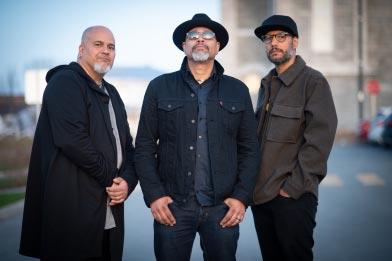
Brooke Blackburn: Yeah, again, sit at home and do what. You might as well sit at home and write music, because usually you’re gigging. Blackburn as a four piece back in the day, when we played more as a four piece than a horn band, we were gigging as much as possible. We had a house gig in Toronto. And then we had corporates and we had this and that, we’d get together sometimes three, four nights a week gigging and it limits the amount of time, you have to write music. So when you actually do have the time to write music, you either do it or don’t. And we decided to do it.
Rock And Blues International: Well, you don’t seem to make it out of Canada too often.
Brooke Blackburn: Go ahead Duane.
Duane Blackburn: Yeah, well so we have this CD and it is the first time we have an American publicist behind us. We’ve been with this record company for two CDs and so basically this is a new adventure for us. We’ve been to shows, and we’ve done a lot of the shows. We need to do more.
Brooke Blackburn: Yeah, we’ve played in Pennsylvania, we’ve played at White Mountain Boogie, which is New Hampshire. We’ve played a lot of Northern US stuff. Yeah. Yeah. Yeah. Another thing is, my lady is telling me that we were just on the the breakthrough of getting all these shows in the US and then COVID hit. And COVID hit so it was like, well, we were just on and everybody’s just getting to know us a little bit and then you had two years of a shutdown. So that was the thing and some international stuff like the Panama Blues Festival, jazz and blues festival. So all these different things were happening for us. And then it shut down completely. So it’s kinda like, we’re getting to know America and places is getting to know us a little bit more. And every time we do perform in the States, they dig it. So they understand our sound, so it’s kind of nice. And when Americans used to come to Toronto, and see us at our house gig, one of the most common things to them was, ‘man, you just brought me home. I’m a year out of my country, out of my city, out of my town, and then the way you guys play you guys, this brought me home.’ So that was nice to hear. Especially people from the South, so it’s nice. And you know, Texas, you’re from Texas. You got Austin, you got the Music City. Yeah, so it’s like in Canada, Toronto is kind of like our Music City. And Montreal was the same, and stuff like that throughout the years through the 50s and 60s with the jazz scene. But we have a Music City here. So we come from the Music City, and we are musicians from the Music City. So we want to spread that all over and with this new push with this album, we’re going to be playing more in the States, we’re going to be playing more in Europe. We’re going to be playing more worldwide, the more that more people like you interview us and and let people know who we are.
Rock And Blues International: I guarantee when you hit Europe, y’all are gonna be stars. All my friends that go and perform in Europe. They say when they get there. They’re treated like kings. I mean they get no respect at home but once they get over to Europe, it’s the thing about that band’s from America, that band’s from Canada, that band’s from wherever, you know, suddenly in Europe, you’re the big stars.
Brooke Blackburn: Right? Yeah. Yeah. It’s a nice feeling that we have yet to feel, being a part of the Blackburn Brothers, but we want to get over there like tomorrow. Yesterday we should have been in Europe in a sense. So we’re really focused on more places in the states and touring more places in the southern states because like I say, 8 to 10 hours for us continued on next page
being from Toronto, it’s a drive. You’re driving to places like Vermont, you’re driving to Vermont. Montreal was saying, come back a lot. So come back, we go south from there, going to Vermont, going to New Hampshire, going to Pennsylvania, going to wherever, the Poconos or whatever we’re playing. So we’re used to that 8 to 10 hour drives, 20 hour drives down farther south a little bit more. So we were thinking flying and in order to fly, you got to do these festivals, they got to get to know who you are, or the Chicago Blues Festival or the Tampa Bay Blues Festival, all these different festivals, they’re getting to know who we are.
Rock And Blues International: Right. Right. So what have we not talked about on the album that we really should have touched on? What have I missed?
Brooke Blackburn: Well, it’s from Electro-Fi Records for one thing, we got to talk about that Andrew, Andrew Galloway, ElectroFi Records and all the people helping us out like Laura Carbone, and Amy Brat and all that played on that CD as well. Go ahead brother.
Duane Blackburn: Yeah, yeah, we’ve talked about that, we’ve talked about... I don’t know.
Brooke Blackburn: We’ve cover it, we’ve covered it. You have us talking about every song that’s on the record, so I don’t know. We’re musicians, we’re family. We’re a family. We’re called the Blackburn Brothers for a reason. My mother, Jean Blackburn and my father, Bobby Dean Blackburn, it’s the same mother, same father, and we grew up in the music business, and our father’s in the music business, been in music business, and been a full time musician since the 50s. So we definitely grew up. but I mean, it’s not an easy road because my mother worked all her life and worked hard all her life and still taking care of the family in any way with her grandchildren and stuff. So, you know, I pay homage to her at the same time. You know, it’s what it is, it’s family. I don’t know what else to say and we’ve talked for about, I don’t know how long. We’ve talked right now for about one hour.
Duane Blackburn: We’ve covered it all. We covered it all.
Rock And Blues International: Your dad’s a big deal in Canada.
Brooke Blackburn: Yeah. Yeah, he’s got a he’s got a Mississauga Walk of Fame, which is in Mississauga, where we kind of grew up as kids. He’s got the Toronto. He’s got Maple Blues Nominations. And he’s got a, what’s that thing you guys did with that Duane?
Duane Blackburn: Oh, yeah. Trailblazer
thing.
Brooke Blackburn; Yeah, Trailblazer that was to the black history. They gave him a basically an award for his work, The Trailblazer and its history in Toronto and Canada. I can tell you one thing, man, I’ve met a lot of people in this world like Dominic Troiano from The Guess Who and The James Gang and all this stuff. And people like Eric Mercury, who was with Roberta Flack, and a lot of these people have come up to me and said, they know your dad’s band. I used to sneak out of my house to go see your dad play back in the 60s and the late 50s, in the 60s and 70s. So I mean, being in a rock and roll band back in those days and getting kicked out of a high school for playing rock and roll, that goes back to the “Let The Devil Play” because people might say that about the blues but they also said that even exponentially about rock and roll. They didn’t like to see people shaking their their hips to this new music. And so that’s emphasized in in the record, so he’s built up his name and still playing by the way.
Rock And Blues International: That’s cool. That’s great.
Brooke Blackburn: He’s only 82 years old.
Rock And Blues International: 82, all right. Well, it has been a pleasure talking to you two. I’ve really enjoyed the conversation and I wish you all the best on this. I hope one of these days you’ll make it down to Texas before I die.
Duane Blackburn: Don’t worry, we will. And don’t worry. We’re going to be trying to get down there as soon as possible. Again, we’ll probably fly. Because it’s not easy. Toronto to Texas is a long, long, long drive.
Rock And Blues International: Oh yeah, well wait till you get to Texas and find out it’s four or five hours between towns. Well, you got the same thing up there in Canada, four or five hours between major cities.
Brooke Blackburn: Yep. Yeah. Yeah, exactly. It’s a big country and just like Texas. Texas is the largest state, isn’t it?
Rock And Blues International: Yeah.
Brooke Blackburn: Yeah. Yeah. Yeah. So yeah. between all the different places, and yeah, definitely. Definitely.
Rock And Blues International: I talked to bands that are out on the road and they tell me that the two hardest places for them to tour is Texas and Canada, because of how long they have to drive.
Brooke Blackburn: Yeah, I believe it. I believe it man. We drove one time 18 hours to get into to get to Gaspe Bay, Gaspe Bay Quebec from Toronto. 18 hours, man just stopped to get something to eat, didn’t get a hotel room, just drove straight. So, it’s a long ways, man, it’s a big drive. Those are adjoining provinces. That’s two adjoining provinces, Quebec and Ontario. If you want to drive out to BC, well I drove out there with my brother and my uncle. It took us three and a half days. We stayed over at a couple hotels, but it is a big ass country. We fly
when we go out West.
Rock And Blues International: Well, I’ll let you all go. I’ve tied up a lot of your time right now. But like I said, I certainly enjoyed our conversation. Y’all were just a lot of fun to talk with and I wish you much success with this album.
Brooke Blackburn: Oh, thank you very much. Thank you very much. And we appreciate you talking to us. And big up to your roots in St. John, man.
Rock And Blues International: Okay.
Duane Blackburn: Yes.
Brooke Blackburn: And when we get out to Texas, well come to us and say hello, definitely.
Rock And Blues International: Okay. That’d be great. We’ll see you later then. I say we’ll see you later. That’s just something we always say.
Brooke Blackburn: Alright, well, hopefully we’ll make that true.
Rock And Blues International: Okay, that’d be great. Well, y’all have a great day and we’ll talk again sometime.
Brooke Blackburn: All right, thank you for this interview. We really appreciate anything.
Rock And Blues International: Okay. Bye bye.
Brooke Blackburn: Bye.
Duane Blackburn: Bye
It was indeed a pleasure talking with Duane and Brooke about the new Blackburn Brothers album’ SoulFunknBlues. I loved every moment on the album. There are so many great moments on this album that it’s hard to keep track of them. By the time you finish one song thinking how good it was, you are greeted by another one equally as good. Let me tell you, there are no bad cuts on this album. There are no filler songs. This album is like a beautiful Blues story book with 11 chapters of great stories told in a wonderful musical style that only the Blackburn Brothers can deliver. I would like to encourage all of you out there to get yourself a copy of this album. If you like Funk, R&B, and Blues, then this is the album for you. Without a doubt, this is the genuine thing right here.
The Blackburn Brothers are Duane Blackburn (lead vocals, organ, piano, and vocodor), Brooke Blackburn (guitars, background vocals), Cory Blackburn (drums and percussion, background vocals), Robert Blackburn (guitar, background vocals), and Nathan Blackburn (bass). Guests on this album include Mark Ayee (bass), Howard Ayee (bass), Roger Williams (bass), Paige Armstrong (guitar), Neil Brathwaite (tenor sax), Ted Peters (trombone), Pat Perez (horns).
Find out more about The Blackburn Brothers at: www.blackburnbrothersmusic.com
(continued from previous page)



Rhode Island Blues musician Al Basile has just released his new album, B’s Time, on Sweetspot Records. Al Basile has quite a rich history. He started off with Duke Robillard’s band, Roomful Of Blues, in which he was the band’s horn player for over 20 years, then he moved on to become a solo artist which he has been performing and recording as for the last 25 years. This is also the 25th Anniversary of his own record label, Sweetspot records with which he has recorded 20 albums with the release of B’s Time. To celebrate the anniversary, Al thought it was time to take a look back at what he has accomplished over his career and he has issued this new compilation celebrating his anniversary. Not only is this a career retrospective, this is also a celebration of his favorite songs that he has recorded. These are the songs that he feels the closest too.

“I have well over 200 songs to choose from, and these are not my only favorites, but these are the ones I feel closest to, for many different reasons,” says Basile. “They show me working with my closest musical friends, like Duke Robillard and his band members over the years, and my favorite guests, like Sista Monica Parker and the Blind Boys of Alabama. They show how broad my range is as a songwriter and arranger, how many different styles I work in, from Swing to Gospel to R&B to soul to acoustic blues and electric blues, even to psychedelic rock. They show how I write in different characters and situations, and how I use my voice like an actor in different styles. They show that my cornet tone is personal, and how my solos always tell a story; I sound like no other jazz or blues trumpet or cornet player. And finally, they show how the teacher in me is always concealing a lesson in my lyrics, for those who listen closely. You can study my songs, or just listen to them while you’re making dinner – there’s something for every level of listener here.”
One thing about this album that is sure to grab your attention, is how contemporary it really sounds. Through the help of famed engineer Glen Halverson, he remastered each one of these songs bringing them up to the standards of today. For a lot of people out there that might listen to this album, they will most likely view it as a completely new album instead of a compilation because of the quality of the recordings coupled with the fact that they probably aren’t familiar with his past catalog of work. Face it, 20 albums is a lot to keep up with and if you have just heard of Al Basile now, then you basically have no idea what this man has accomplished over the last 25 years. Personally, I don’t think Al will mind if you come away thinking this is an album of new work. In fact, he will probably really get a kick out of that. I personally can’t wait for our readers to get a copy of this album and check it out. Al is is the consummate storyteller. He captures your attention from the first bars and his lyrics keep you involved with the music till the song fades out. This new release has 17 great songs or stories if you like to keep you glued to your stereo. Please take the time to listen
to every one of them. They are simply fantastic.
I had the chance to sit down with Al again to talk about his new work and even I learned a bit about him that I didn’t know before, and I have interviewed him before. We talked when he released his last album. So without any further ado, let’s sit back and check out what Al has to say about his new release, B’s Time.
Al Basile: Hello, Kevin.
Rock And Blues International: Hello Al, how you doing?
Al Basile: I’m doing well. How have you been?
Rock And Blues International: I’ve been doing good, can’t complain. How about you?
Al Basile: Same. All as well.
Rock And Blues International: All right. Well, you’ve got a new album out, but it’s not really as much as new album, as it is a retrospective on your career up to a certain point. It didn’t look like you had anything from your last album on there.
Al Basie: No, I’ll tell you why. First of all, this year is significant because it’s 25 years since I started my record company, and I’ve had 20 albums in 25 years, but it’s actually also the 50th year, since I became a professional player. I joined Roomful of Blues in 1973 and amazingly enough, that’s 50 years ago. When I started Sweetspot in the late 90s, it took a while. It took a good 10 years before I got... Even though I’d been doing stuff through Global Art for a very long time, it took a while for me to get known and particularly when I picked up my publicity
continued on next page
(continued from previous page)
presence with having Mark Pucci do my PR. That’s when I really started getting known and started getting the eight nominations that I’ve gotten for the Blues Music Awards. So there are an awful lot of people out there who know me from the last 10 or 15 years, who may not know the first half of my career at all. So I picked most of the 17 songs from the earlier part hoping that in that way it would be for a lot of people like a new album, because it would likely be music that they really hadn’t ever heard.
Rock And Blues International: Well, for me, it was a new album. I hadn’t heard any of these songs before, so it was good.
Al Basile: Well, great, because it’s over a 25 year period. There’s a lot of continuity with the people that I’ve worked with, but it’s also a very large cast of characters to augment. The rhythm sections have been fairly consistent, but I’ve had a lot of guests and a lot of things have changed. And over the course of 25 years, that’s a lot of sessions and different times and with some different people and I have to credit Glen Halverson, who did the remastering. He had to go back in and try to make all these songs sound basically like they were made all around the same time when really, the oldest
songs are 25, 20, 25 years old and he just did a tremendous job, so you can listen to it like a bunch of new songs. The oldest songs don’t sound technically limited.
Rock And Blues International: Right. They don’t sound dated at all.
Al Basile: Right. So I gotta, I mean, part of that is the people that I’ve worked with and part of it is the writing and approach to arranging and things like that, so there is some continuity in terms of my own style personally. But boy, Glen has the best technical resources available today and it’s amazing what remastering can do. I was just, I was really knocked out by how consistently it all holds together given how disparate the sources work.
Rock And Blues International: Well, when you go to in to remaster a project, you start hearing things that you didn’t remember hearing before. It pulls out a lot of little subtleties in there that you just didn’t remember and they mean something to you now.
Al Basile: Yeah, that’s really true. And another part of that was that in all but a couple of the earliest songs I had the original

mixes. In other words, the mastering was done by several people over the course of the 25 years, but I was able to give Glenn the original mixes and you can bring stuff out of mixes with current technology that they couldn’t do when they were originally mastered back in the day, so you’re exactly right. Not only do I hear things that I’d forgotten we did but everybody else is going to hear things that they didn’t hear, even if they own the older records.
Rock And Blues International: And it’s good to have a new set of ears on it also.
Al Basile: Yeah, it funny, I don’t tend to listen to my old stuff and of course I had to do that for this project because I’ve got 225 songs over the course of the first 19 albums. I had to pick the ones to put in this collection, so I basically had to go back and actually listen to my own records, which honestly, I don’t do.
Rock And Blues International: Well, how was that for you? How was that for you to suddenly go back and dig into your own history?
Al Basile: Well, it was a great experience for a number of reasons. So first of all, I’ve been a writer since forever and as a writer writing fiction and poetry and plays, when I go back and look at my earliest stuff, I kind of cringe and say, I’m glad I didn’t start getting published until I was a little older. But with the music stuff, I didn’t put out that first record until I was 50. So the writing was mature, because I was very experienced and I had had songs that Duke (Robillard) recorded, so I had a pretty good idea of what it was going to be like. But there’s still the lingering sense that... you know, any artist, you’re creative. You always like your your newest stuff the best and you always think, well, gee, I improved. Every year, I tried to improve one thing or another and so obviously you go back 20 - 25 years, it’s just not going to be that good. But when I went back and listened, I was very pleasantly surprised that that feeling that you have that somehow you were just starting out, so therefore it couldn’t be as good as now when you’ve got the benefit of all these extra years. It turns out that the personality of the artists is pretty strong and I like all my early stuff, it turns out. Which is a good thing because it would have been hard to pick stuff if I didn’t.
Rock And Blues International: Well, if you listen back to the early stuff and you went, Oh, hell, what was I thinking there, that’d be a little disappointing for you.
Al Basile: It sure can and I’m sure there are lots of people in the business across all genres that maybe got signed in their teens and they had early bands, and then they went on and matured. But there are records of them at... you know, if Billy Joel goes back and listens to that band he was in, Atilla. Hahaha...
Rock And Blues International: Oh, that
continued on next page
(continued from previous page)
has to be a trip for him right there. And think about the child stars, like “Teen Angel” and songs like that from back then. They recorded them when they were 17 and then now at 70 they have to go out and sing them. It’s got to freak the hell out of them.
Al Basile: Yeah, all of that is true. So I mean in that sense, like getting really a late start is, it’s actually a good thing, because I’ve been fortunate enough to keep going for the 25 years, even though I did get a late start. And so I don’t look back and like as a poet, for instance, my first book didn’t come out until I was what, in my late 50s. And so the stuff that I wrote when I was in college and in my early 20s, I don’t have to let anybody see that stuff. And I’m happy about that, so it’s interesting, the perspective. I mean it makes me appreciate even more how lucky I was working with Duke through the whole early part of my career and just as a player and then writing with him. And then having him produce me for the first 20 years of my record company because he always has great players. I grew into arranging my own stuff, so whatever level I was able to function at, he was able to pick up whatever I couldn’t do, he was able to do. And so over the years we started out with him doing of a lot of the arranging and then I started to do more and more and more and write my own horn arrangements and so the last 15 years I’m really responsible for most of the way the records were played, so I had room to grow because I was working with him. I was so fortunate for that.
Rock And Blues International: Well, before we start talking about the songs and the people on here, we got something we need to address.
Al Basile: Sure.
Rock And Blues International: The cover of the album. That is quite an unusual cover. What made you jump at something like that? You’ve got dinosaurs all over it. Are you trying to tell us something?
Al Basile: Well, yeah, what’s the title of the album?
Rock And Blues International: Well, “B’s Time”.
Al Basile: Right. Now I’ve had three or four other records that were B’s This and B’s That. I had “B’s Expression” and “B’s Hothouse”, and so now it’s been 25 years. “B’s Time”, this is a retrospective and if there’s anything that characterizes what we did in Roomful and what Duke has been doing his whole time and what I’ve been doing the whole time is. We’re basing our
values and everything on older music, music that has passed and so we’ve been accused of being dinosaurs for 50 years. When we were doing rhythm and blues stuff in the 70s, that was first done in 1952. Everybody said, ‘What are these? This isn’t rock and roll, what are these kids doing?’ But that was the stuff that we liked so the cover is kind of a joke that I’m a throwback, I’m a dinosaur. And so instead of having a picture of me and my friends, I’ve got dinosaurs.
Rock And Blues International: Well, it was quite unusual. I would have thought normally on an album like this there’ll be a big picture of you holding your coronet but you’ve got a dinosaur here that looks like it’s
on its back and is laughing.
Al Basile: I know. I know. Well, I’ll tell you the story on this particular work of art in a minute. But if you get the CD, the picture of me with my horn is on the back.

Rock And Blues International: Right.
Al Basile: So we did get it in. But I’ve had a lot of my last few records that have had pictures of me on the cover and I just, I wanted to change it up. This painting was done by an artist named Dan Gosch, who was at the Rhode Island School of Design when I
continued on next page
(continued from previous page)
was at Brown in the 60s and I’d stayed in touch with him, and I really liked his work. So when I knew I wanted to do something like this, I said ‘Gee, could I use something that that you did for the cover?’ And he said, ‘Yeah, you look over whatever I’ve got. You’re welcome to it.’ And so I looked through his stuff and when I came to this and saw the dinosaurs, I didn’t have the title yet. That’s what gave me the idea for the cover and for the title, both at the same time.
Rock And Blues International: Well, it’s certainly unusual. I don’t think I’m going to be seeing any more like these.
Al Basile: Well, you know, everybody likes to think that he’s different and stands out from everybody else a little bit. And so I thought I tried to make the cover do that in parallel to what I’m trying to do myself.
Rock And Blues International: Well, I think you’ve accomplished that. It’s great. I mean it really is. All these dinosaurs, some
running, but it looks there’s one here, the second one from the right just looks like it’s laughing and having the time of his life.
Al Basile: Exactly. And if you knew the work of the artist, and what he’s done. We have a big, famous club in Providence, downtown Providence, Lupos Heartbreak Hotel. There have been a number of recordings made, live recordings made there and so it’s known for getting top line artists that come to Providence and that play in clubs. In the window of the club there are giant murals of Jimi Hendrix and Janis Joplin and Elvis. They’re all done by the same artist, Dan Gosch and there’s an element of humor in his work. It turns out even when he’s doing something. This image could have been on the cover of one of those old Life magazines when they would run those those articles about the prehistoric times and so they get an artist to do a dinosaur cover. But that laughing dinosaur, that’s pure Dan, that was him.
Rock And Blues International: Well, I’m looking at this list of people that are performing on here, which is like twice the list of songs on here and looks like you’ve got your usuals in here. Duke Robillard is on everything, but two songs out of here, so he spans 20 something years of your career here.
Al Basile: Yeah, almost 25. Yep.
Rock And Blues International: So what was it like to have him on all these songs?
Al Basile: Well, of course, Duke was my first boss. He offered me my first job in Roomful. And so you know, we’ve been close for for a long, long, I mean, 50 years. And when I started writing, he’s the first artist to release a song of mine on one of his own records and there was a run of records in the 80s and 90s when he would use my songs, or we would write songs together. He often used me as a sideman on his records. I’m on a lot of his records on Rounder and Stony Plain and even Point Blank and so when the chance came for me to make my own record, which was... I told the story, but it was a very unusual happenstance. We were scheduled to make a Duke Robillard Christmas record. This was in ’90, Christmas, just before Christmas of ’97, I think. And we were going to make it. It was going to come out the next year. And so we were going to go into the studio and he was using me as a sideman in the band and he called everybody up, like two weeks before we were going in the studio and said, ‘We just lost the financing for the record, we can’t do it. I’m really sorry but you’ll have to cancel those dates.’ And while I was on the phone with him, I said, Well, wait a minute, how would you like to work for me? And he said, What do you mean? I said, Well, I have more than enough songs to do an album of my own. We’ve already got the studio booked. Would you produce me and we just come in and record my songs instead of Christmas songs. And so he was all for that because that way, he didn’t have to pull the plug on the money all those guys were planning on making. And so that’s how he made the first record. And that was such a good combination. It turned out that he produced the next, whatever it was 16 - 17 records. And so I always used him almost always as a guitarist, and he was producing. It was natural to use the rhythm sections from his band and if you look at the cast list, those are the guys.
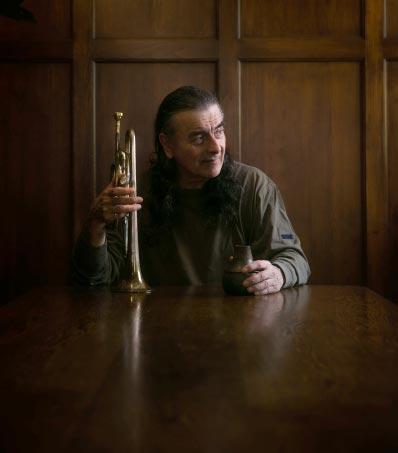
Rock And Blues International: Yeah, let’s talk about them a little bit. I know I’m gonna say a couple of these names wrong. But Mark Teixeira.
Al Basile: Yeah, we say Texera. But really, because it’s a Portuguese name. It’s To Shara but Mark says Texera, he kind of anglicized it. And Mark has been well... still plays with Duke and has playing with him for probably over 20 years. And so it’s natural that I use Mark and then the bass players. There haven’t been many, Marty Ballou, and then it was John Packer and then it was Brad Hallen. And those are the three bass players.
continued on next page
(continued from previous page)
John Packer has since passed. He died. So Marty and Brad are the bass players names that you see. And then the keyboard ones are again people that were playing keyboards with Duke. So Bruce Bears most recently going all the way back to Matt McCabe. You know, they were guys that work with Duke. and so I had a tailor made repertory company all set up then. Because I wanted horns, I had all of the Roomful guys I wanted who had been playing with me on Dukes records already anyway. So that’s how I always have Doug James. On a lot of records I have Rich Lataille, who’s still in Roomful, and “Sax” Gordon Beadle. We got like a little New England musical mafia and I get to draw from those guys. A lot of talented people.
Rock And Blues International: Well, the ones you’ve mentioned are almost on every single song on here. They probably know every nuance of your playing so they’re able to complement it perfectly.
Al Basile: Yeah, that’s exactly right. And when I go into the studio with those guys as often as we’ve worked together, I know exactly what to give them to work with. I know what to put on the demos. I know what to write. I mean, I give the horn players parts that are written out. When we get in the studio, I know what to tell them and they know me. They know my different styles. You’ve listened to the record, there’s a reggae song on this record, there’s a song that really leans towards country. There are gospel songs there. These guys can play all those styles, plus they know me. So we’ve got almost like a little shorthand happening when we go into record.
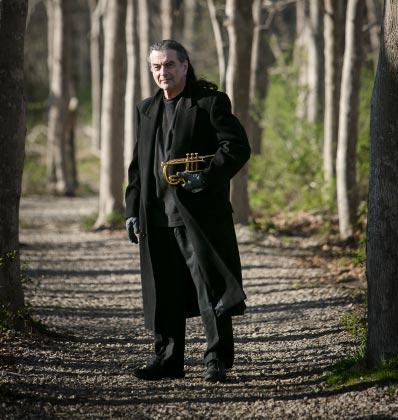
Rock And Blues International: Well, let’s talk about the order of the songs. Also, you didn’t just start out with the earliest recording on there, you jumped around quite a bit when you laid out the the song listing on here when you selected the the running order. So what made you choose this running order? You start off with 2009’s Soul Blue 7’s, “You Showed Me Something” off of that album. And then you go back to 1998, Down On Providence Plantation with “I Really Miss You” and it jumps around a bit. So this being a very personal album to you, what prompted you to start off the song order like this?
Al Basile: Well, let me break it down. Of course, I gotta go all the way back to what made me pick the songs, because first I picked the songs and I made the sequences almost last. And so picking the songs was a matter of, as I say in the booklet itself, I like all my songs. There are very few songs that I wish to go back and do them differently and then I say, Oh, gee, I wish we didn’t do it like this. I really liked them all. So when I was
going to pick a retrospective, I thought, I’m going to pick the songs that kind of mean the most to me personally and that could be for a number of different reasons. So I’m going to end up with different kinds of songs. And so every song on this list is a favorite, but almost every one is a favorite for a different reason. So for example, “You Showed Me Something”, that you mentioned, I like. First of all it goes back to the writing. I have to think that these are among my best songs that I’ve written. And then it’s got to speak to the performance. In “You Showed Me Something”, I really liked the horn arrangement and how that complimented the rhythm section. It’s kind of like swing blues. And that is kind of the way I identify myself from the way that I came out in Roomful. Now “I Really Miss You” doesn’t have any horns, but it’s got two things that made me pick it. Duke has two of the best solos I’ve ever heard him play, certainly on my records. Two long solos, not just one, so that’s great. And the other thing is the vocal on that tune. That was a scratch vocal. I only sang it once and I really liked what I got on that one performance so we just left it. Most of the time you do more than one take of songs and then you pick the best or you might composite to get the best performance. In this particular one, what you hear is exactly the way I sang it and it’s exactly the way Duke was playing it, and so it’s the closest to a live thing that you’re going to get in this collection. Now the next one, “Lie Down In Darkness”. I picked that
because it’s got the Blind Boys Of Alabama behind me on it. That was just one of the great days of my life to sing with them, and it’s a gospel song, but without naming the deity. It’s what I call secular gospel. And the Blind Boys will not record just anything. They look carefully at the lyrics of the song, and they have to approve of the feeling behind the lyric. So when they said they were willing to record this, that told me that I’d done what I wanted to do, which was to give a gospel feel to a song that is inspirational, but not overtly religious. And then singing with those guys was just killer. And the guy that I do the duo back and forth with at the end, Billy Bowers, was their lead guy at the time. He only lived a couple of years. He was in a terrible car accident, and broke his neck and he died like two or three years after we recorded this. So I really, I picked this really as a memorial to him. And so it goes all the way through. But some, like for example, “Jimmy and Johnny”. It’s the writing that I like. I don’t think I could improve the way that I told that story in the lyric. And then “Drive Me Darling” is like the most psychedelic and Duke does his most progressive guitar sounds and in the middle of the bridge, we actually sound like Cream. So I had to put that in because that’s as rockish is I ever get. I’m not gonna go through them all, but that’s why I picked all the songs. Now once you pick them, then I waited until the remastering
continued on next page
(continued from previous page)
was done and then you try to come up with a pleasing sequence that doesn’t think about when the songs were done, but how they sound and what they are as songs and you try to have variety. So you’re going different keys, different tempos, different arrangements, different genres, different approaches to lyrics, and all of that. I have one song “B.D”, which is a jazz tune. It’s an instrumental that features might my cornet playing, and I don’t even sing on it. So as I say, there’s a different reason for every one and I try to make 17 songs as a long sequence. Of course nowadays people don’t even listen to sequences. They listen to an individual song, but I come out of the days when it was important how you ordered the songs on your album. I mean, in vinyl days, you had an opener and a closer on each side.
Rock And Blues International: Exactly. You had to have something like that to keep the people interested in continuing on. You had to be able to have them want to turn that album over and start that next side.
Al Basile: Yeah, exactly. I mean, you
remember Youngbloods “Elephant Mountain”.
Rock And Blues International: Yeah.
Al Basile: The very end of the first side on that vinyl, there’s like a little 20 second instrumental jam playing, and when you look at the list of his songs, it’s called “Turn It Over”.
Rock And Blues International: A Subliminal message there.
Al Basile: Yeah, in print. Anyway, that’s what went into making this sequence. And I hope there will be some people that actually listen all the way through and enjoy how the songs change. I mean, they’re all me throughout different parts of the way I write in the way I’m doing different singing styles. I’ve got a jazz singing style on “While We’re Dancing” which I wrote to be kind of like an old fashioned standard. I wrote that to be the kind of song that Louis Armstrong recorded in the early 50s. And then the playing that I do on it when I go to the very end on the
highest note, that’s what Armstrong used to do at the end of a lot of his recordings. So there’s a lot of homages to the people that I love the most and all kinds of different reasons and “Make A Little Heaven”, I did that with Sister Monica Parker who was just a powerhouse of a singer and a lovely, lovely woman and she died a couple of years after we made that record. So I really put that down as a memorial to her, and so it goes. We’ve got a reggae number “Causing A Joy”. We’ve got “Losing My Cool” with an organ playing on “Losing My Cool” which is by Bruce Katz. I saw the Young Rascals live in 1968 and it just made me think of the sound of the Young Rascals so I had to put that on. “Don’t Wait Too Long” was on Sinatra’s album, “September Of My Years”. It came out when I was 17 and he was 50. And in those days I sang standards and I just always wanted to record that and I have it on a jazz record that I recorded that Duke produced, that he wasn’t on with a jazz band that I had here in New England at the time. And so that got me to do like, that’s my Sinatra tribute. So, you know, it’s just kind of like going through the Al Basile Museum, you see all my favorite stuff.
Rock And Blues International: Let’s talk about a couple of others on here, “Lie Down In Darkness”. What’s that? Tell me a little bit about the message behind “Lie Down In Darkness?
Al Basile: Well, that’s the one that I was talking about, that I did with The Blind Boys. And again, it’s what I call secular gospel. So what’s the message of the song? The song is one of life is difficult. It seems like nothing is ever going to get better. But then the message of the song is it’s going to get better, because after every dark night, there comes a new day. And so the title is “Lie Down In Darkness, Raise Up In Light”. It uses nature as a way of saying, believe in the future, things are not always going to be as bad as they are right now. And there are a lot of gospel songs like that. But I wrote it with just the imagery of light and darkness, and then getting the Blind Boys who are blind. Everybody that sang on that song except for the leader is blind. To have them sing the lyric about darkness and rising up into eventual light was just very uplifting to me and what Billy Bowers does at the end is just so... it was exciting to try to swap phrases with him. Same thing with Monica Parker on “Make A Little Heaven”, which is also gospel-ish.

Rock And Blues International: What about “Tickle My Mule”, I really like that title.
Al Basile: Thank you. A couple of things about that. First of all, a lot of my songs are humorous, but none of the other songs on this collection are humorous. So I wanted to have a funny one, and “Tickle My Mule” we did in 2016. That’s on “MidCentury Modern” and in 2016 Duke had had an operation on his shoulder and he produced the record but he couldn’t play on it, so I had
continued on next page
(continued from previous page)
“Monster” Mike Welch, of course another great New England player. And so part of the reason that I chose that was for the humor. Part of it was because it’s a different guitar player, there’s Mike Welch. Just like on “Don’t Wait Too Long”, it features guitar player Fred Bates who was a great jazz player from around here. And then the other thing is I picked it because blues fans will notice that the arrangement is basically the arrangement of Howlin Wolf’s “Hidden Charms”, except it’s got horns.
Rock And Blues International: Was that intentional?
Al Basile: Pardon?
Rock And Blues International: Was that intentional?
Al Basile: Oh, yeah. Certainly. I mean, the arrangement is not identical, because I’ve got horns on it, and the treatment is different. But it’s exactly for example, what Bob Dylan does a lot of times. He’ll just take the arrangement and then the melody is different. And a lot of times the changes are different. So it’s not a copyright thing, but blues does that all the time. I mean there’s a million recast things of familiar and classic, not just lyrical themes, but musical themes. And you like to give people something that’s familiar. And a lot of people have done that. It’s so happens that I had been listening to “Hidden Charms” and that’s what ticked my ear. I usually get a riff like that, or a bassline sometimes and that’s what’s going through my head when I write the song. And so that tells me that that particular bassline or that particular riff will work when it comes to my writing the song and singing over it and arranging it. Lots of times I’ll have different changes completely, but the groove will be so similar. So it’s all by way of using the tradition you know, I I love the whole blues tradition, and I don’t want to stray too far away from it.
Rock And Blues International: Okay, and “Hooray For Me (and to Hell with You)”. That’s an that’s an interesting title in itself.
Al Basile: Yeah. And the reason for that and I guess maybe you don’t have the booklet actually, I don’t talk about it in the booklet. Normally on my records I have a little paragraph for every song that talks about where I got the idea. But on this particular record, because it was a retrospective, I had a guy do a liner note so that I didn’t have to talk about how good I thought everything was. I let somebody else say that he thought it was good, but “Hooray For Me (and to Hell with You)” is something my mother used to say. And she didn’t say it
directly. She said, ‘You know, there’s a lot of people in the world and that’s their attitude. Hooray for me, and to hell with you.’ And so the lyric of that is all about that. There are people out there that are only thinking about themselves and they don’t really give a flip about you and at the end the lyric says, ‘I tried to go against it and I hope you’re trying too, though it seems like there’s so many and it seems like we’re so few, but the world is too cold if the best a man can do is say hooray for me and to hell for you.’ So like a lot of my songs that tries to teach something. You know, it’s like, don’t be like that.
Rock And Blues International: Okay, “Sleeping Beauty”.
Al Basile: Oh, yeah, I through that in because it’s the least, it’s the farthest from blues of any of those, any of this stuff almost that I’ve ever done. And that’s my second record. And the arranging is unusual. The song of course, the lyric is based on the the legend of Sleeping Beauty. It’s actually because we did it in 2001. I would never. I wouldn’t do a song like this today, because people would probably give me a hard time about the lyrics and how dare you make the woman in this song be helpless and need to be rescued by the man, but it’s a hero legend and so you got a hero and your hero rescues somebody. But musically, it’s just its own thing. It’s got its own style. And so I’ve got very versatile players, but they’re playing in a style that they had to make up just for this song. And so that’s something that I really like about it.
Rock And Blues International: All right. Yeah. Now with society the way it is, you have to be really careful what you’re singing about.
Al Basile: I know. And I’m going to be interested to see if anybody even listens to lyrics. And you know, if I get excoriated, but my out is going to be well, you know, it was 2001. You know, sue me.
Rock And Blues International: Okay, well, you end the album...
Al Basile: I’ve learned better since then. So I wouldn’t do it now.
Rock And Blues International: Right. You in the album with 1.843 million. Tell me about that one.
Al Basile: Well, if you listen to the lyric, and this is something that I’ve done throughout my whole career, is some of the time I write character songs. In other words, in poetry we call them persona poems. In other words you’re using your writing in the character or the voice of somebody but who isn’t you. So in other words when I sing this, I’m acting the part. And the part that I’m acting is of a guy who’s just robbed a bank and got away with 1.843 million bucks and the song is about from his point of view, the robbery and then to get away. He’s trying to get away. And he’s being chased by the police. And so during the course of the song we have sound effects, and you know, you hear the police sirens, and the end of the song, which is also the end of the record is the guy is pinned down by the police and he’s down to his last bullet in the 45 that he’s got. So it’s, it’s like the ending of “Butch Cassidy and Sundance Kid” and he can’t win. He can’t get away. And he says, ‘I got one shell left in this 45, don’t exactly know the way I’m about to die, but I got 1.843 million reasons why. So the song’s got a lot of numbers in it and if you look at the lyric, every line is based on a number that’s an ascending number. So one button in the bank to sound the alarm, two ways to escape and is 1-2-4-8. As as the song progresses, the numbers go higher and higher and then at the end, of course, it’s going to be back down to zero. He’s not going to get away with the money. It’s just, that’s it. It’s like I said, it’s the end of “Butch Cassidy and Sundance Kid”, or like the end of “White Heat” if you know that one. At the end of “White Heat” where Cagney’s on top of the gas tanks and they blow up.
Rock And Blues International: Oh, yeah. Well, then the end of “Butch Cassidy
continued on next page

(continued from previous page)
and Sundance Kid” that was something else, them just running out with the guns.
Al Basile: Yeah, Yeah.
Rock And Blues International: You don’t know what’s happening. You just know there they are, right in your face getting ready to fight.
Al Basile: Yeah, and they just, they’re out numbered like 1000 to two. So you got a pretty good idea that the director is saving you from having to see them get turned into bullet riddled heaps of flesh. But it sure makes for a great legend, that last image of them running out firing. So this is like that. The idea is, it’s a criminal going out in a burst of glory?
Rock And Blues International: Well, I’ll tell you, I found that the subject matter in the songs was really good from song to song. It was unbelievable how much they vary, the tones varied. When I say tones, I mean the subject matter of the songs. I really enjoyed that.
Al Basile: Yeah, well, thank you, because that tells me that you’re listening to the music, but you’re also listening to the lyrics, which means you’re listening to the song. People that don’t listen to lyrics. They’re not really hearing the song. They’re hearing the music. And so I do try to exercise as much variety as I can in writing songs because I’ve written hundreds of songs and you try very hard not to repeat yourself. And then a genre that the cliche of our blues is that, oh, you know, all the songs are the same. Well, I’m trying to show that, no, they’re not. And no two songs are the same, at least if you listen to my things. Everyone is going to be coming from a different place, could be different character, could be a different
musical style. You know, it could be a different message. It could be like a little play. “Jimmy and Johnny” about two friends that... one of them falls in love with a woman and his friend already was involved with her, but the woman doesn’t want his friend to tell them. She just wants to be, she wants to go away with the guy’s friend. And so he’s self sacrificing and he says, Okay, I guess you and I won’t travel together. You’re gonna go off with her. And he never reveals to his friend that he and the woman had a past. It’s like a little play, but I boiled it down to three and a half minutes. So these are all things that I do, because I write plays. And so sometimes my songs are like little plays, and thank you for noticing that because I really pride myself on the fact that all these songs are consistent in the sense that they’re of high quality and performance and the writing and they fit together and they all sound like me basically. But then beyond that, they illustrate different parts of me as a writer and if you read my books of poetry, my poems are like that too. They’re all different. They come from different places. So I just enjoy having the freedom to write in any style and working with the guys that I do. Take “Causing Joy”. It’s a reggae song. I just said, Well, this is a reggae song. They said, Okay, and then they played it and they played great. So you can imagine as a writer how freeing it is to feel like you can basically write whatever you want and these guys are going to make it sound right. That’s a tremendous freedom to have.
Rock And Blues International: Well, that all goes with picking the right people to perform with you.
Al Basile: Oh, yeah. Well, like I said, it really goes back to Duke because Duke plays in a lot of different styles and so he’s always had musicians in his band that could play.
They could play swing. They could play Chicago blues. They can play Texas blues They can play New Orleans blues, because he covers every genre within the blues form. And then he plays jazz too. And so he always has these guys that are really versatile, so that’s why I use so many people that graduated from I mean, being removed for when I was back 50 years ago, it was like going to musical... like I’ve been in a musical doctoral program or something. We learned so much from him playing every night and everybody that plays in his bands. They either come in knowing how to do all that stuff or by the time they leave, they definitely know how to do all that stuff, so I really enjoy using them. And then of course we go back so long it’s fun to get back together with musical friends. That’s it. You can’t discount that either, that’s extra fun.
Rock And Blues International: Well, I really enjoy on here that no two songs sound alike.. They differ very much from song to song, yet with the structure of the tracklisting on here, they blend together seamlessly. But it sounds like a brand new album to me.
Al Basile: Well, I couldn’t hear you say anything better than that, because I was really... the most I was hoping was people would say, well, we’ve heard a lot of new Al Basile songs on this album that were from the earlier part of your career that we just were never introduced to. And we know the more recent ones. But for you to say what you did, that’s great. I hope, from your lips to God’s ear, I hope a lot of people come away with the same feeling.
Rock And Blues International: Well, I hope they do too. I kind of in a way, I wished I’d heard all these albums before. But after listening to this album, it opens my eyes to the versatility you have as a songwriter and a performer and it shows me a very extraordinary album.
Al Basile: Well, I really appreciate that. In my claim because I picked 17 songs out of 225 or so is I could have made 17 other songs to make up this album and you would get the same feeling, which is to say of diversity. And you know the writing is all different. The songs are all different. I could literally take 17 songs in random, and it would give you more or less this feeling. There are literally no songs that sound exactly alike on any of my albums and I consciously try, even when I get into a groove that’s similar to what we’ve done before. We all work very carefully to do something new and something different that makes it not sound exactly like. And so hopefully this will be like a doorway to people that if they look, if you buy the CD on the inside of it, there’s a picture of all the covers, like 19 covers to those albums. And if you were to go back and listen to all those records, they’re all pretty much like this one. Maybe the high calorie content is not quite at the absolute top, because I picked my very favorites. But I could easily pick 17 other favorites and just giving you other reasons for why I picked
continued on next page

(continued from previous page)
him. So you know if people use this as a way to go back and discover that I’ve been doing this for a long time, and I pretty much always sounded like me.
Rock And Blues International: Right.
Al Basile: And you know, so if you liked me now, you got lots of homework you can do.
Rock And Blues International: Well, I’ll tell you, picking out 17 songs out of 225 had to have been a bit of a chore and not necessarily a bad chore but an interesting thing to go through and suddenly listen to 20 albums, front to back. Is that what you did, or did you just happen to remember, ‘well, I liked that song better than I liked these.’ How did the process evolve?
Al Basile: Well, I gotta be honest. For a lot of these songs, there are songs that stand out to me when I think about the record that they’re on. So for example, “You Showed Me Something” is on Soul Blue 7. That has always been one of my two or three favorite songs from that album. “I Really Miss You” from my first record down on Providence Plantation. I did a retrospective 10 years ago, called At Home Next Door that was a little different kind of thing. It was a two record set and one record was all new songs, and the other record was all blues songs. So they were like my favorite blues songs up to that point. “I Really Miss You” was on there because it’s a classic blues. And so when I think of my first record, I always think of that. “Lie Down In Darkness” is from Woke Up In Memphis, which is in 2014. And when we made that record, when I recorded with The Blind Boys. We recorded in Hoboken, New Jersey, which was pretty funny. They were on tour and so they weren’t anywhere near New England and so we had to go to them and find a studio that was close to where they were that day. And so they came in and that was such a memorable day. I loved singing with them and singing with Billy Bowers and then him dying. When I think of that album, I immediately think of that, and so on and so forth. It’s almost always a song that I’ve always thought of as one of my two or three favorites from each album. So I didn’t have to go back and listen to every album, but I did go back and listen to all the songs that I thought of as favorites, which is still 50 or 60 songs, and then pick the 17 from there.
Rock And Blues International: Well, you must have these catalogued pretty well to be able to just put your hands on the original tapes to hand them over to Glen to have him work on it.
Al Basile: Yeah, that was a real challenge and I was talking it over with him and he was saying, Listen, I don’t know if you have access to the original mixes or not. I did in most cases. I didn’t for the first two records, but all the rest of them I had the original mixes and the reason for that is that when we’re working and almost all of these records were recorded at Jack Gauthier’s studio, Lakewest Recording, here in Rhode Island. There were two of them. Two records, maybe three that were made in Duke’s studio, Dukes Mood Room. So for instance, Soul Blue 7 was made in Dukes Mood Room. And Blue Ink’s “Hooray For Me (and to Hell with You)”, that was made in Dukes Mood Room. And in fact, on the rest of that album, that was a Chicago blues album, Jerry Portnoy’s on that whole album. I mean, he plays acoustic on this one cut in this collection. But he had just come from touring with Clapton. He literally got off the plane. He had been playing with him in Europe, and he came to our session. So I really remember that session, partly because of him. So it’s usually a person that sticks out in my mind working with this person or some other thing about the tune that jumped out at me, that helped me make the choices. But I mean, I left off some great guests. I wanted to put on a song that I recorded with Scott Hamilton, who is one of my dearest friends and Scott and Duke and I came up together in the early 70s. But I didn’t think it was one of the best songs even though he was on it. So I couldn’t use it, even though I dearly wanted to have him represented.
Rock And Blues International: Well, if
you had to pick three singles off of here for for release to radio right now, what three would they be?
Al Basile: Wow. That’s a good question.
Rock And Blues International: I mean, with so many to choose from here, 17 great songs, but when you release to radio, sometimes it’s 1, 2, 3, I don’t know. Some of the new bands release everything.
Al Basile: Yeah, if I were just doing three I would do “You Showed Me Something”, “Losing My Cool”, and then maybe “Make A Little Heaven”. It’s gospel, it’s not blues, but the performance is just killer. Monica Parker was just so great and she pushed me... I mean, I’m singing falsetto with a gospel singer, so I think it probably might be those three, but I mean, I could pin the tail on the donkey and come up with three others just as good probably.
Rock And Blues International: All right, well, so what... in another 5 to 10 years, are we gonna see another one of these?
Al Basile: Well, you can do the math. If I started 25 years ago with 50, I’m playing with the house money at this stage. I feel good. And you know, I love doing this. I’m gonna keep doing it just as long as I can. So if we got to, I don’t know, we got to 35. I would think about doing it again. You know, five years.
continued on next page
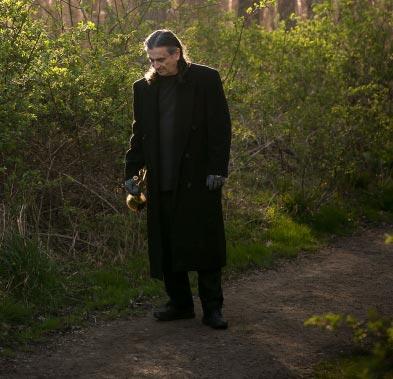
(continued from previous page)
Rock And Blues International: Well, you stopped in 2019 on this, so we’re looking at 2029 to put out the next one.
Al Basile: Well, no, I mean, I have had a record out every year since ’20. Rock And Blues International: Oh, I know. But your selection on here stops at 2019.
Al Basile: Yeah, and really, the only reason it does is because I figure the last few records people have... if they’ve heard anything of mine, those are things they heard. So that’s the only reason why I stopped at 2019. I would have brought it right up to date and put... I might have put, well I know what I would have picked maybe off the last few. But it’s a shame, you got to stop it. I stopped at 17 because of the the disk capacity of a CD. You can really only go up to 80 minutes and so these 17 songs come in about 70, 73, 74 minutes.
Rock And Blues International: Oh, you mean we got we got shorted one song?
Al Basile: Yeah, well, the problem is,
the song that I wanted to add was a song that I wrote back before I started making my own records, and I wrote it for Duke. It’s called “This Dream Still Coming True” and Duke recorded it and he still plays it sometimes. It’s been one of his big jam tunes where he’ll go in to play a gigantic solo and because the groove is so strong, and I’ve actually played it with him. There’s a DVD of his “Live At The Blackstone River Theatre” where we’re playing that song, and I get to solo on it on the video, on on the DVD. So I did my own version of it some years after that, and I really wanted to include it, but it’s like six, six and a half minutes long and there wasn’t room, and I just didn’t want to take any of the other songs that were already there out to put that in. So, you know, it couldn’t be helped. But that’s the one that got away if you’re curious.
Rock And Blues International: Now, with a title like that, that would have been the perfect song to end the album with.
Al Basile: Yes, it would. Well, you know, maybe if I do another retrospective, if I live long enough and stay functional, maybe
you’ve just given me the idea for how I would end that.
Rock And Blues International: I love the title.
Al Basile: Yeah, it’s one of my best songs, it really is and when I wrote it, I was not... I’ve never, I don’t think I’ve ever performed it in public because the bands that I was working with at the time, we were all doing jazz stuff and that wasn’t a groove that we that we played, although it’s kind of like a soul jazz groove if you hear it. So I’ve never done it except in the studio when we recorded my version of it because Duke, of course, had recorded it and he sang it himself. So I think I’m soloing on his version and I’m singing and soloing on my version and he’s soloing on my version. So we’ve done that song quite a lot and I thought I should pull out songs that maybe people haven’t heard.
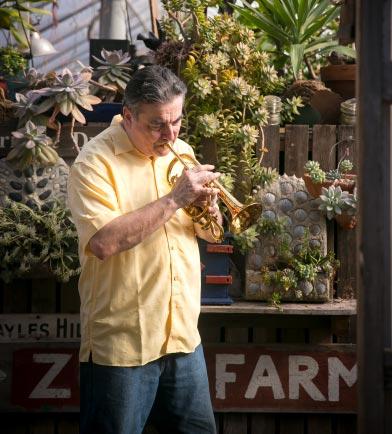
Rock And Blues International: I’ll tell you what, my hat’s off to you. This is just a fantastic album. And really, if I’d had known that it was a collection, I would have thought it was just the newest, most fantastic album I heard you ever do. And I’ve only heard a couple of your albums so that that’s why one reason I’m just not familiar with any of these songs.
Al Basile: Well, you know, the way that I look at that statement is that makes you a really good judge of what it sounds like to somebody that did not grow up listening to all of my stuff. In other words, you have fresh ears. You’re hearing it al for the first time. And so when you say that the songs fit together and sound like they they belong, that’s a message that I take to heart because you’re not conditioned by having heard them over the years in other situations. So that’s good, that’s even more than, as I said, it’s more than what I hoped for. I was hoping to introduce people to some older songs and say, gee, this guy’s been good for a long time. But boy, if you’re kind of hearing me almost for the first time, and you’re liking what you hear, I have no quarrel with that.
Rock And Blues International: I’m sorry, but you introduced me to a whole new album and a whole new side of you.
Al Basile: Well, it’s all back there, if you’re ever curious. And pretty much all of it is on YouTube, so if you ever want to sample stuff, you can see from album to album on YouTube. It’ll show you what album it was on. So if there’s something that you hear on this collection that you like, and you say, Gee, I wonder what the other songs from that album would be like, it would be very easy for you to sample them. I mean, I shouldn’t say that because YouTube is free, but it’s just the truth.
Rock And Blues International: Yeah, that has its drawbacks for you financially.
Al Basile: Oh, yes, it does. It’s not a joke. I mean, it’s a joke. And I’ve said it
continued on next page
(continued from previous page)
before, but it’s not a joke, to joke about how you make a million dollars in the music business.
Rock And Blues International: You start out with two.
Al Basile: Start with 2 million, that that ain’t a joke, sister.
Rock And Blues International: Well, what haven’t we talked about that I neglected to ask you about on this album?
Al Basile: Well, the two things that I would like to touch on are because you know, when you get reviews, I do so much stuff on any album. I wrote the songs. I’m singing the songs. I’m usually playing solos on it. I did the arrangements. It’s like no one reviewer is going to touch on everything because he can’t say anything. You know, it’s just too much. So they usually pick their spots. But what I would like to point out my playing. There’s a lot of interesting playing of mine on this album and because I have been a jazz player, the tune “B.D.” really shows me as a jazz player, and you don’t have to be a jazz fan. But you’re hearing me play in a style that I’m very proud of because I don’t really sound like any other jazz player and so that’s something that I think is worth pointing out and then the soloing that I do on my other songs which are not jazz songs, I’ve had to develop a way of soloing over the songs because most of the blues styles that I work in are dominated by guitar solos, and keyboard solos, piano and organ. And then maybe sax solos, trumpets. You don’t hear too many trumpets in blues, unless you go back to the early days with Louis Armstrong and people like that. So I actually had to learn to play over these different groups that I’d written and I developed a style that’s really not like anybody else. So I would say, listen to the brass playing. That’s one thing. And the other thing is that over 25 years, I’ve really worked in a lot of different vocal styles. So there are jazz styles, like, “Don’t Wait Too Long” is directly the phrasing is right, learned from Frank Sinatra, but then the blues songs, you know, my models for blues singing, they’re not Frank Sinatra. There are other people and so you’ll hear different influences and different styles in my vocalizing over the course of this collection and yet, somehow they’re all me. I think with most singers, each singer has a style and that’s the way you hear her or him most of the time and I’m a little different in that regard. I think that’s probably worth mentioning, although there will probably be people that like one style doing more than another. But over the years, it’s been really fun learning how to sing in say, Gospel style, so I can duet with Monica Parker or in a jazz style, so I can do a Sinatra
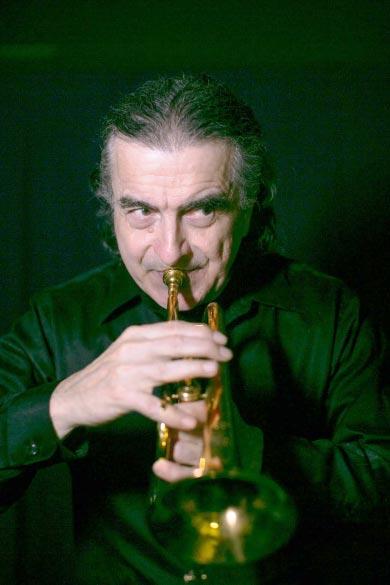
tune, or in a straight ahead blues style, like “I Really Miss You” or it’s like you as a writer, unlike any actor would be, it’s like you do it in a different role. Sometimes you take on a different accent, different voice. So that’s the way that’s what I’d like to kind of come through with it. The reason there’s so much versatility is I’m just like an actor. I’m just doing different. It’s all me, but I’m playing different people.
Rock And Blues International: All right, well, I really enjoyed our conversation about the album. Anything else we need to add to this?
Al Basile: Well, gee I don’t... I can’t think of anything off the top of my head, except that I really like your your reaction, because as I said, it’s, it’s even more than I had kind of planned as a possible outcome. So that’s good. If there are more people like you out there, that not only haven’t heard my early stuff, but you know, I don’t tour, so if you don’t hear me on radio, or audio one way or another, you’re pretty much not going to know me. So people that are coming to me for the first time are going to, if they’re they’re going to hear things the same way you did, I would be very, very happy with
continued on next page
(continued from previous page) that.
Rock And Blues International: But why don’t you tour? Are you still teaching?
Al Basile: Well, that’s a good question. I stopped teaching in 2005. So I taught for 25 years. This is like my, my lifetime. The thing is I taught for 25 years. I played for 25 years before I made my own records. I’ve been making my own records for 25 years. All of that is going on but I picked up with all of my artistic stuff when I stopped teaching because when I was teaching, I spent all my time with my students, paying attention to them because that’s what they deserved. So that’s part of it. But ask the question and remind me why I’m answering with this part of the question, please.
Rock And Blues International: Why don’t you tour?
Al Basile: Oh, why don’t I tour? Yeah, I can say that in two in three words, Roomful of Blues. When I was in that band, we worked 300 nights a year and we were young. And we drove a school bus everywhere throughout the Northeast, and we moved a piano. There was no digital pianos. We moved a concert upright, 600 pound piano in and out of every place we played. We were piano movers before we were musicians. And then at the end of the night we had to move a piano again. I was like, 25. Now I know touring is not like that for everybody anymore but even if at his best touring is grueling and I have to say as much as I love performing, and I really do love performing, it’s just would be too much. I wouldn’t be able to do any of the other things that I do. I wouldn’t have time to write plays. I wouldn’t have time to write poetry. I have a Zoom show, or a monthly Zoom show where I talk with poets that runs once a month. I have to record and edit that. I’m wearing a lot of hats, so touring, it would be too much for me to bite off and try to chew, particularly in this stage of my life when I’m doing so many other things. But I would like doing spot things. I would if I had the people to go out with. I would do a festival, for example. As long as I wasn’t giving up being home for the rest of my life.
Rock And Blues International: Like one show every couple of months.
Al Basile: I wish I could do that. I would consider doing that for sure because I do love performing and most of these songs, I’ve recorded them. But no one has ever heard them done live by anybody, especially me, so I love the songs. I would love performing the songs just the way that I love performing songs by Duke Ellington and Gershwin and Jerome Kern and people like that. That’d be even something about it that I would like even more because I did create them. But it’s the life. The life is so hard.
Rock And Blues International: Now just a Imagine the time just trying to rehearse the songs.
Al Basile: Yeah, that’s the other thing. I would have to go out with the people who made the records, that know them because they’re versatile enough. But at any rate, in the bands that I’ve ever been in, I was never the guy that got the gigs. You know what I mean? Every band’s got to have one of those guys. Especially when you starting out, you got your little blues band, or you got your little jazz band, and there’s got to be one guy in the band that’s a go getter. And he goes out, comes to rehearsal and says, Well, I scored us a gig at x. And then you go play. The rest of us, we’re too busy practicing and trying to get our own shit together.
Rock And Blues International: Yeah, that’s a little rough when you get older.
Al Basile: Yeah, especially if you didn’t come up doing it, if that wasn’t your role, because it’s a good role. It’s a real role and people can do that. There’s a lot of people in bands who might not be the best musically, but they’re performing some other function that nobody wants to do and booking is a big part of it., before you get to the stage where you’ve got an agency doing it for you.
Rock And Blues International: Well, you’re dealing with Mark Pucci. If he couldn’t find someone to do that for you, I don’t know who could.
Al Basile: Well, it’s really never occurred to me as something to do. As I say, because if you knew me at home, at the moment, I’m sitting in my basement. I have my little studio down here. This is where I do everything. I practice down here. I sit down here. I write songs down here. I write poetry down here. I write plays down here. I rehearse. My computer’s here. I rehearse my plays on Zoom down here. It is hard to blast me out of my basement. I’ll tell you the truth.
Rock And Blues International: Oh, I can relate. I’m sitting in my little studio here too, so I know exactly what you’re talking about. I stay pretty busy myself. I got two magazines and a podcast and god knows what else I’m going to come up with.
Al Basile: Yeah, well, so you get it. So I don’t know, like I say, I suppose I’ve made my choices. And right now this is kind of working. But it would be fun to to physically perform in person. I love audiences. I like being on stage. I like playing. I’m not a reluctant performer at all. My poetry readings are among my poet friends. Everybody knows that I’m an extroverted reader of my own work. Everybody comments on what a good reader of my own work I am. And so that’s just an offshoot of being onstage singing and playing my own work. It’s all the
same. I like it. I’m a ham. I’m a ham in the basement.
Rock And Blues International: Okay, well, I guess I’ll let you go. Or we’re gonna stay on the line another hour, because I’m sure we can find stuff to talk about.
Al Basile: Thanks for your time. I really enjoyed this, I have to say.
Rock And Blues International: Well, I always enjoyed talking to you. On our last interview, two, three years ago, whenever it was, I think we were on the phone just as long.
Al Basile: Yeah. Well, you’re a good listener, and you know how to ask good questions and that’s what it takes.
Rock And Blues International: All right. Well, I want to thank you again for your time with me. I really appreciate it and I’ll be taking care of all this for you.
Al Basile: I appreciate that. Thanks very much.
Rock And Blues International: All right. We’ll talk later then.
Al Basile: We’ll speak again one of these days.
Rock And Blues International: Okay, next album. That should be what, in about another year?
Al Basile: I don’t know. The songs are written. I can tell you that.
Rock And Blues International: Well, then it’s time to record them.
Al Basile: Okay, I hear you. I hear and obey.
Rock And Blues International: Okay, I’ll talk to you later. Bye bye.
Al Basile: See you.
I’d like to congratulate Al on a job well done. This is a fantastic album. I wasn’t familiar with even half the songs on this release. To me, this was a new release. The songs sound so fresh and new. It’s really hard to believe that these songs span a 25 year period. They sound like they could have been written yesterday. To top things off, the variety of music and song choices here are spectacular. I like so many songs off this album, I can’t even keep up with them. It truly is a timeless work of art. I would sincerely urge all of you out there reading this to check out the legacy of Al Basile. Look for his songs on YouTube, or just go to his website and see what you can do about ordering a copy of this album for yourselves. That would be even better. You can find out more about Al Basile on his website at www.albasile.com. I would sincerely like to thank Al for doing this interview with me. As always, I had a great time talking to him. Thanks Al!
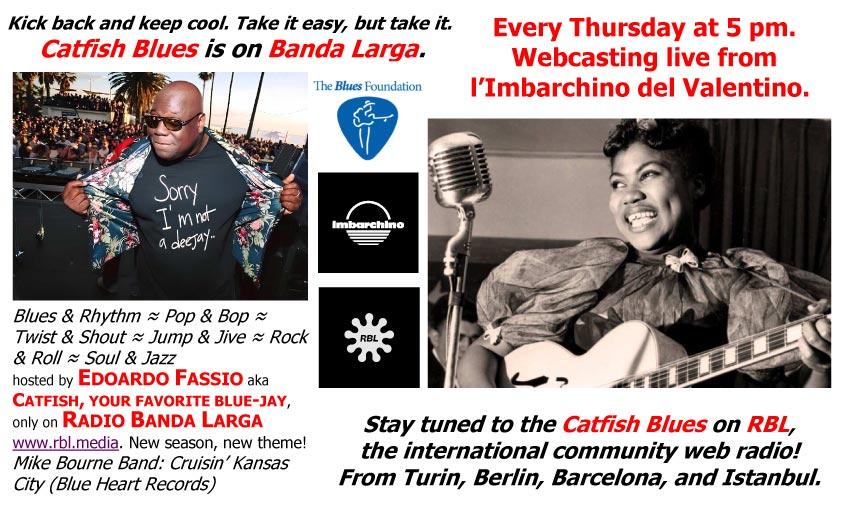

 By Edoardo Fassio
By Edoardo Fassio
Among the main responsible for the spread of blues in England for 61 years, Mike Vernon even gained the support of Queen Elizabeth, who in 2020 awarded him the title of Member of the Order of the British Empire (MBE). Since 2001, the “godfather” of British Blues has lived in Andalusia, in southern Spain. “The rural way of life suits me fine,” says the veteran producer, talent scout and performer. “The hustle and bustle of London is not for me anymore!”

His current residence has not made him forget his old habits. A passionate professional ever since, at the age of twenty, he sat in the control room taking care of his first album, for pianist Curtis Jones, Vernon has forever stood alongside the elite of the blues, both domestic and overseas.
There’s his production behind the records of John Mayall and the Bluesbreakers, including the glorious “Beano” with Eric Clapton. He has worked with Savoy Brown, Ten Years After, Fleetwood Mac, Champion Jack Dupree, Eddie Boyd, Jimmy Witherspoon, Freddie King, Bo Diddley, Lazy Lester, Laurence Jones, and Sari Schorr. Not to mention David Bowie’s early recordings.
With Cat Squirrel, Vernon returned as a frontman; his voice, clear and swinging, is polite and full of humor. He collaborates with a former boy prodigy, the brilliant guitarist Kid Carlos, who also joined him as an author, and with the Sevillian harmonica player Mingo Balaguer, a mainstay of the Iberian blues scene with seventeen albums under his belt. At Mingo’s suggestion, the three expanded to a quintet with the addition of bassist Oriol Fontanals and drummer Pascual Monge
Mike’s decision on the group’s name takes us back to the golden days of blues rock. “Cat Squirrel,” a variation on the Mississippian “Catfish Blues” theme, was recorded, in an instrumental version, by both Clapton’s Cream and Jethro Tull. The original belonged to the incomparable Dr. Isiah Ross, of whom Vernon released an LP on his fledgling Blue Horizon label, recorded in a hotel room in London, in 1965; the reprise of the song, to greet the new CD, issued on the French Dixiefrog, is a sincere sign of belonging.
The unmistakably “the English Way” and somewhat retro sound of Blues What Am opens with “I Feel So Good”, a sign of the persistent affection for the ancient idol Big Bill Broonzy. It includes “Sugaree Sugaree”, or Chuck Berry in a rural dress, a series of valuable shuffles including “Out on A Limb” and the programmatic “What the Blues Will Do.” And bids bye-bye with “Let the Boogie Rip,” an obsessive Magic Sam-style boogie that seems to start a new campaign for the blues. Global, this time, and no longer just “Brit,” like the one invoked in 1967 with Mayall’s Crusade Produced by Mike Vernon, of course.
Tra i principali responsabili del dilagare del blues in Inghilterra a partire dagli anni 1960, Mike Vernon si è conquistato il tifo anche della regina Elisabetta, che nel 2020 gli conferì il titolo di Membro dell’Ordine dell’Impero Britannico (MBE). Dal 2001 il “padrino” del British Blues abita in Andalusia, nel sud della Spagna. “La vita di campagna mi si addice”, racconta il veterano produttore, talent scout e performer. “Il trambusto di Londra non fa più per me!”

La sua attuale residenza, beninteso, non gli ha fatto dimenticare le vecchie abitudini. Appassionato professionista fin da quando, a neppure vent’anni, si ritrovò nella stanza dei bottoni a curare il suo primo album, per il pianista Curtis Jones, Vernon è sempre stato a fianco del gotha del blues, casalingo e di oltremare.
C’è la sua produzione dietro i dischi di John Mayall e i Bluesbreakers, compreso il celebre “Beano” con Eric Clapton. Ha lavorato con Savoy Brown, Ten Years After, Fleetwood Mac, Champion Jack Dupree, Eddie Boyd, Jimmy Witherspoon, Freddie King, Bo Diddley, Lazy Lester, Laurence Jones e Sari Schorr. Per non parlare delle prime incisioni di David Bowie.
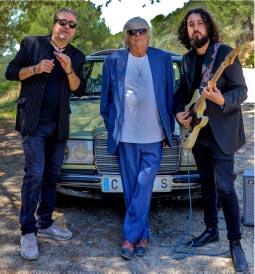
Con Cat Squirrel Vernon si è riproposto come frontman; la sua voce, chiaretta e swingante, è garbata e piena di humor. Collabora con un ex ragazzo prodigio, il brillante chitarrista Kid Carlos, che gli si è affiancato anche come autore, e con l’armonicista sivigliano Mingo Balaguer, una colonna della scena blues iberica con diciassette album all’attivo. Su suggerimento di Mingo, il trio si è allargato a quintetto con l’aggiunta del bassista Oriol Fontanals e del batterista Pascual Monge
La scelta del nome del gruppo, una decisione tutta di Mike, riporta ai tempi d’oro del rock blues. “Cat Squirrel”, una variazione sul tema mississippiano di “Catfish Blues”, fu incisa, in versione strumentale, sia dai Cream di Clapton che dai Jethro Tull. L’originale apparteneva all’impareggiabile Dr. Isiah Ross, di cui Vernon pubblicò un LP sulla sua giovane etichetta Blue Horizon, registrato in una stanza d’albergo a Londra, nel 1965; la ripresa del brano, a salutare il nuovo CD, in uscita per la francese Dixiefrog, è un felice segno di appartenenza.
Il blues inequivocabilmente “all’inglese” e un po’ retrò di Blues What Am si apre con “I Feel So Good”, segno del persistente affetto per l’antico idolo Big Bill Broonzy. Comprende “Sugaree Sugaree”, ovvero Chuck Berry in tenuta rurale, una serie di shuffle di valore tra cui “Out On A Limb” e il programmatico “What The Blues Will Do”, e si congeda con “Let The Boogie Rip”, un impetuoso boogie alla Magic Sam che pare lanciare una nuova crociata per il blues. Globale, stavolta, e non solo “Brit”, come quella invocata nel 1967 da Crusade di Mayall. E prodotta da Mike Vernon, of course.

Puddle Of Mudd fans are going to be happy to know that Wes Scantlin and Puddle Of Mudd have finally released their new album, Ubiquitous. This album has been a long time in coming. The last album of originals for the band was Welcome To Galvania and it was released in 2019. For this album, Wes teamed up with several different songwriters to release a little something different this time around. Don’t get me wrong, this album is without a doubt a Puddle of Mudd sounding album, although it is is filled with a bit of a heavier tinge to it, not to mention some of the most dramatic lyrics they have written so far. The first single released from the album, “Cash & Cobain” has been getting quite a bit of airplay and notoriety for the band so far, while songs such as “My Baby,” “Butterface,” “Dance With Me,” and “U Wrekd Me” will be showing another side to Wes, one filled with a little bit of anger is some parts. Although, as Wes tells us, “ Anger is a gift.” Other interesting songs on the album include “Poke Out My Eyes,” “Candy,” and “Man In The Mirror,” a song about taking your future into your own hands. Yes, Wes is back and ready to hit the road and start performing some of these cool new songs. He tells us that he is preparing setlists already. Don’t think you’re going to hear the same old show from Wes and Puddle Of Mudd. He tells us that there just might be a different set just about every night the band performs when they hit the road.
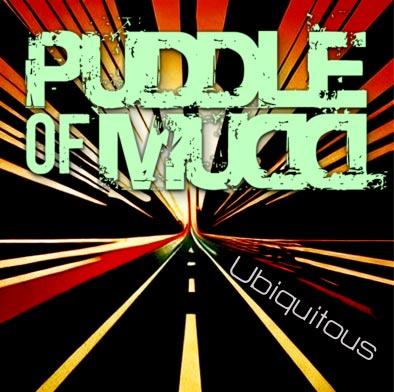
Puddle Of Mudd has been making quite a name for themselves since forming in 1991. The band has already racked up over 7 million units in sales since releasing their first album Come Clean in 2001. In addition to that they have released quite a few charttopping songs, such as “Blurry,” “She Hates Me,” “Psycho,” “Famous,” “Drift and Die,” and “Control.” We throughly expect to see a couple of the songs from this new album become hits as well.
Since their formation, Wes Scantlin has been the voice and the driving force of Puddle Of Mudd. He is the one behind the band’s success and immense popularity. His creativity has led to the release of several wonderful Puddle Of Mudd albums such as Life On Display, Famous, Vol. 4, Songs In The Key Of Love And Hate, and Welcome To Galvania. We had a chance to sit down with Wes recently to find out about the new album, as well as how things were progressing in his personal life and it really made for quite an interview that also brought up subjects such as being poisoned, being haunted, and even losing his house. We assure you, this interview will definitely reveal some things about Wes that a lot of you have never known before, so without any more hesitation, let’s get on with the show and we’d like to present to you, Wes Scantlin from Puddle Of Mudd.
Rock And Blues International: Hello.
Wes Scantlin: Hello. How you doing. This is Wesley.
Rock And Blues International: Hey, how you doing today?
Wes Scantlin: I’m doing all right, man.
Rock And Blues International: What’s the weather like in California?
Wes Scantlin: Pretty damn cool, man. Pretty good.
Rock And Blues International: Great. Great.
Wes Scantlin: Yeah, really nice.
Rock And Blues International: Well, you’ve got a new album out and it just dropped. What, a couple of weeks ago?
Wes Scantlin: Yes, sir.
Rock And Blues International: How’s it doing so far?
Wes Scantlin: Well, I think it’s doing pretty damn good. Everybody’s really, really digging it man. I’ve been doing rehearsals and stuff, getting the new songs down tight and stuff so you can hear them.
Rock And Blues International: Wonderful. When do you expect to go back out on the road with this?
Wes Scantlin: Probably in the next month or something? continued on next page
(continued from previous page)
Rock And Blues International: Okay. Well, I find the album very interesting. It’s, I’ll tell you, some of the lyrics on here, they’re pretty wild. They’re pretty wild. I don’t know how to put it. I don’t want to offend anybody or anything, but it sounds like you were a little pissed off when you wrote some of these songs.
Wes Scantlin: Yeah, yeah. Anger is a gift, I guess.
Rock And Blues International: I guess. That first song, it’s not your typical love song.
Wes Scantlin: Well, I’ve been through a lot of crazy stuff man that’s been wild. Had some wild relationships, I guess you could say. But fortunately they’re all gone. Those ones are all done, so I’m solo these days, man. I’m just chilling solo.
Rock And Blues International: Okay, well, I’m interested in every one of the songs. Let’s start off with the first one, “My Baby”. “I’m never going to be happy until I watch you die.”
Wes Scantlin: Yeah, I wrote that at my old house and the lady that used to live there. She was actually set on fire in the master bedroom and then while she was on fire, she was drowned in her bathtub. I didn’t know her, but that song is about the lady that lived in my old house.
Rock And Blues International: Okay, you didn’t know her at all, but you wrote a song about her?
Wes Scantlin: Yeah. Yeah, I called her
Lily. I don’t know if that’s her real name. Christian wrote that song and the music. I wrote a little bit of the musical part of it, but it was just, I don’t know, just something that came off the top of my head. And so that was about the lady that used to live at the old house, man.
Rock And Blues International: Wild, that was wild.

Wes Scantlin: Yeah, it didn’t have anything to do with me. I don’t know, I just thought like, “my baby’s sold her soul to the devil for rock and roll”. That thought just kind of popped. It’s this little kind of a popping kind of lyric, so I kept that in there.
Rock And Blues International: Yeah.
Wes Scantlin: That’s to catch people’s attention.
Rock And Blues International: Okay, who’s the principal songwriter of this?
Wes Scantlin: Me and Christian Stone.
Rock And Blues International: Okay, is your house haunted now because of all this?
Wes Scantlin: Well, that house, that I no longer reside in, which was basically stolen from underneath my feet... Yeah, it was. It was haunted. It is. It was and is haunted. There’s definitely a lot of paranormal activity there and I got just kind of got used to it. I thought it was kind of funny. I don’t know if you’ve ever dealt with any type of ghosts or anything like that, but there was like ghosts. Not just ghost, there’s like several ghosts. It was pretty, pretty freaky, but kind
of cool. Cool and freaky.
Rock And Blues International: Was this woman one of the ghosts?
Wesley Scantlin: Yeah, she was. Anytime anything would kind of touch me or something or rub, kind of touch my shoulder or something, I would just laugh and be like, ‘Hi, Lily. What’s up,” and that was about it. There wasn’t anything really terrible, anything real, real terrible. I did bring my pastor up to that house probably four or five times to bless the house and try to get rid of the ghosts which worked for a while, but they would come back. I don’t know if they just hid out or something. We’d open all the doors and he would bring this blessed oil and and he would pray, bless the house and ask the ghosts to kindly leave, and so we did that a few times.
Rock And Blues International: Okay, well, that’s very interesting. You said the house was stolen out from under you. How did that happen?
Wes Scantlin:Yeah, man, that was terrible. Well, my ex wife, she was stealing like thousands, hundreds of thousands of dollars from my Puddle of Mudd business account. And I haven’t really ever told anybody or anybody that’s a reporter this but she was taking money out of the American Express business card, putting it into a PayPal account and then putting it into a different checking account that I didn’t really know anything about. She was taking hundreds of thousands of dollars. And for a while for about five, six years I was throwing up every single day profusely. Like every single day. Like about 10 times a day, just throwing up. I thought I was dying of cancer or I had some kind of freaky disease or something. But actually, I was being poisoned with arsenic and pesticide and rat poison and shit like that. So fortunately I got out of that alive. And so unfortunately, since she was stealing so much money, I had to lease the house out. So the tenant that was staying in there didn’t want to leave and he made up all these forged documents and stuff that weren’t even real. He just would not go. So the first time this happened, I had found the original lease agreement, so he had to leave. The second time this happened, there was a lawyer that... It had a lot to do with the same tenant. I wasn’t getting my mail and my business manager that I had at the time was really shady as well. So I wasn’t getting my mortgage payments paid. So I missed like one mortgage payment and then while I was playing overseas for the soldiers in Iraq and Kuwait and Korea and all this stuff, the house went into like... This guy did like a three day quick claim on my house. It went into foreclosure and then it was sold at an auction for $350,000 or something. By the time I got home, I didn’t know anything about it. There was like a 30 foot barbed wire fence around the entire house and I’ve been fighting that. I’ve been fighting that for years and getting arrested for trespassing, whatever, you name continued on next page
(continued from previous page)
it. I actually went down to the county clerk headquarters, and I got the real actual documentation and for years up till like 2021 I was the grantor and then I was basically selling my house back to myself, and then selling the house back to myself and becoming the owner and then selling the house back to myself and then becoming the owner and becoming the seller and then becoming the buyer. So I actually got the documents that was Wes Scantlin. I actually seriously owed the house. I owned the house the whole time. It’s still in my name.
Rock And Blues International: I’ve got to tell you, that sounds a bit bizarre.
Wes Scantlin: Yeah, but you know what, I’m sick of getting arrested and the police don’t care. So actually, the tenant guy is actually a cop.
Rock And Blues International: Oh, so that doesn’t help things any.
Wes Scantlin: No. So that’s a fight that I’ve done fighting. I got a really nice place down here in Burbank. And it’s a nice rehearsal studio/studio/space that I can live in. It’s really nice. I got everything and anything I need all around me. There’s a bunch of nice restaurants and stuff down the street. You got a 711 across the street, and so it’s a pretty good spot. I’m cool. I don’t really want to fight the fight with the police guy.
Rock And Blues International: I don’t blame you. There’s no way to win in something like that.
Wes Scantlin: There is no way I could win, man. The last time I was up there, I got arrested. I actually had those documents, man. And you know, the cops like, yeah, you wrote it in 2005. No, man, I’ve owned this house. I’ve been paying the mortgage for 11 to 12 years. No, sorry, you’re going to jail. It’s like that was my last. That was my last hurrah, my last try for that one. I really thought that those documents would actually shed the light, but the whole place is basically stolen by the cops, so I’m done fighting. I’m not gonna fight with the cops because you’re not gonna win. So there you go.
Rock And Blues International: All right. Well, damn, I wonder if I even should have asked about that. This is, it sounds like a pretty bad situation.
Wes Scantlin: It’s all over now man. Like I said, I’m done. I’m done. There’s nothing I can do to to get it back. That’s just the way the cookie crumbles, man. So I’m happy. I’m alive. I’m cool. I’m single, rolling solo and enjoying my life and everything’s
fine. I got plenty of money to be comfortable and stuff, so I’m cool.
Rock And Blues International: So you’re burying yourself in your music now?
Wes Scantlin: Yeah, basically, that’s basically all I’ve been doing. I’ve been making this really cool table, constructing this really cool table and it’s coming along pretty good. I like to make different kinds of art pieces and so the first one this time was this really cool, really cool workspace table. It’s really cool man.
Rock And Blues International: Well, if I ever need a table, I’ll give you a call.
Wes Scantlin: Yeah, give me a buzz man. I’ll go down to Lowe’s and get a big old slab of wood. You know, build a huge table. Eight by five or whatever.
Rock And Blues International: There you go. That’ll work. Yeah,
Wes Scantlin: I got it on speakers and road cases and it’s built from road cases, from old road cases and it’s a huge slab of wood. There’s gonna be a lot of cool rock and roll type stuff. I got some platinum records and different kind of like plaques and stuff like that and then I’m going to lay plexiglass over the top of it. I’ve stained it and it looks like redwood. It’s got like these black, cool streaks and stuff, but it’s coming along really good. It’s actually pretty, pretty cool looking.
Rock And Blues International: Oh, Alright, let’s get back to the album. The next song on there “Dance With Me.” Tell me a little bit about “Dance With Me”.
Wes Scantlin: Yeah, that song was just kind of cool. groovin’ you know. I wrote that with Tony Bataglia, this really cool, cool guy. Great songwriter. Great, great producer.

Rock And Blues International: What was his name again?
Wes Scantlin: Tony Bataglia. Bataglia, with a B. Really cool guy. I haven’t talked to him for quite a while. I was just feeling a little groovy and it was kind a little message to the label. It was like, save me a spot at the top, like come on man, let’s dance. Let’s do this, you know. Let’s get down record label.
Rock And Blues International: Kind of a subliminal message to the record label.
Wes Scantlin: Yeah, yeah. Come on, man. Let’s dance. Let’s do this. And I like to dance anyway. I dance all the time. I say a little ‘Our Father’ prayer to God. At the end of my prayer to God, I always say ‘dancin’ for the lord. Hallelujah. Spirit Vegas. Father, Son, Holy Spirit. Hey, man. I started dancing and stuff. I look like a complete goofball.
Rock And Blues International: Okay, well, I think your first single off the album is “Cash and Cobain”, Johnny Cash and Kurt Cobain. So what made you decide to write about them?
Wes Scantlin: Well, me and this producer, engineer, songwriter, Mr. Colin Britton. We wanted to write a song that was a lot of different genres and cameoing a lot of different genres, musical styles, and, continued on next page
(continued from previous page)
cameoing a couple of big names that kind of just popped out and people to connect to. That was kind of like his idea. So, I was like, okay, okay, that’s cool and we just thought we’d write it about the good times. Good old time lyrics and stuff like that and we’re throwing a lot of different styles in there.
Rock And Blues International: Right, I could hear the variations on it.
Wes Scantlin; Yeah, there’s some Alice In Chains and some Rage Against the Machine type riffs. There’s a little Nine Inch Nails. You know, me and Colin, like two of our favorite bands are Nine Inch Nails and Rage Against the Machine and also Alice In Chains. And there’s a little bit of Collective Soul in there, sort of. We tried to throw a little Collective Soul in there. We’re just we’re just having fun with that song man and, and it turned out to be pretty freakin’, it turned out to be really, really fun and I’m glad that he was the mastermind of it. I was coming up with different riffs and stuff and I came up with a beginning riff. little funky kind of country sound kind of deal. So we made a little country, a little rock and roll, as a little throw out there to Donny and Marie Osmond. You know, we kind of hijacked that. A little bit of country, some old time rock and roll. Yeah. We were just trying to get out. We’re just trying to connect with people.
Well, I think it is connecting, so it’s good.
Rock And Blues International: Well, I hear it’s getting pretty good reception.
Wes Scantlin: Yeah, I’m very pleased about the reception. I guess our little trick, I guess you could say a trick. I guess our little trick is kind of working and we we had a really, really good feeling about the song when we were finished with it. I mean, it’s catchy. Well, it’s a catchy jam, dude.

Rock And Blues International: Oh, yeah. Well, I know who Cash and Cobain are but it says “rolling down the mountain on a one way street listening to Bradley”. Who’s Bradley?
Wes Scantlin: Bradley is the singer, songwriter for an awesome band called Sublime.That was a little cameo to Bradley from Sublime. He’s no longer with us, god rest his soul. Wonderful songwriter, great singer, guitarist, everything, and we threw that out there for Bradley.
Rock And Blues International: Well, that was good.
Wes Scantlin: Yeah, he’s a skater. He was like a skater punk. I’m a skater punk. I’m a former skater punk. I’ve already broke and wiped out so many times. I wasn’t like the greatest. I don’t really skateboard anymore.
But yeah, I used to skateboard every day.
Rock And Blues International: Okay, the next song is “Butterface.” At first, I had to listen to the song a couple of times before I really figured out the hidden message in there. But her face, everything but her face. I really liked that one.
Wes Scantlin: Well, I’ve had people say, ‘Hey, man why don’t you write a country song.’ That was in the hospital or in the rehabilitation hospital. I don’t know if it was just a joke. And it was just really catchy and a lot of people that I could, I would sing that part too. They’d go, Yeah, you should make that a whole song. It’s about going to the Country Bar and getting onto the dance floor and running into a really, really good looking gal and going back and getting it on and having a good time. A lot of times when you take a chick home, sometimes they roll over. It’s a little bit surprising. It’s happened to, I’m sure every guy once in their life. Dance floors can be a little deceptive with all the lights and stuff like that and it’s dark, but actually the chick really turns out to be beautiful actually, so that’s the optimism of it. I’m taking a little stab back at she’d been looking at everything but your face as well and then they fall in love at the at the end of the song and it doesn’t really matter about her face. You know, she’s a beautiful person.
Rock And Blues International: Yeah, “we were screaming and moaning till the break of dawn”.
Wes Scantlin: Yeah. Yeah, buddy. So at the end of the song there, they are both madly in love with each other and probably spend the rest of their life together and live happily ever after. That’s the whole idea, the whole song.
Rock And Blues International: Oh, right. And who is “Candy”?
Wesley Scantlin: Candy is Christian Stone’s ex-girlfriend and that song I wrote on piano. We were all pretty, pretty... we were on a good one. I just sat down at the piano, a little bit out of tune and I just started playing that and then I just started singing that part. I made the song up in a few minutes. They were like ‘how the hell did you just do that’? I was like, I don’t know man, and I really suck at playing piano, but I I was just singing right along with whatever I was coming up with and that’s what I came up with. I wrote a song about his girlfriend at the time right in front of their faces.
Rock And Blues International: How did that go over with him?
Wes Scantlin: They loved it, both of them. They were just kind of in shock that I could write something that fast. That was that kind of cool.
Rock And Blues International: Is there a little message in here that I might not be catching? I see “Candy, can you sing for all continued on next page
(continued
the boys? Everybody wants to hear your lovely voice?” Was she a singer, or is that some tongue in cheek type thing.
Wes Scantlin: She wouldn’t ever sing. We would ask her to, but she wouldn’t ever sing, so I was trying to get her to. It was trying to get her to sing so she wouldn’t sing for us. We’d love to hear your lovely voice Candy. She still hasn’t sang for us, but that’s okay. I think she’s married to the lead singer for Rancid. So, that didn’t work out for Christian and her, but the Rancid guy’s cool. I’m pretty sure he’s probably a pretty cool guy. I’d never met him, but I’m sure he’s pretty cool.
Rock And Blues International: The next song is “Running Out Of Time”. “So don’t you put me down. We’re all on the same side. No one can stop us now. They can’t see the truth because they’re blind.” What are we talking about here?
Wes Scantlin: Oh, man, it can be about anything on that one. Well, could be a lot of different things. Maybe like you’re running out of time on this leg. I don’t know, whatever you’re going through in your life. That could be a could be a marriage or something. It’s like, we’re gonna have to make this work because I’m running out of freaking time and I’m running out of freakin patience. That’s kind of the message of that song. You know, just, this better start working, or else I’m gonna have to bounce. I’m gonna have to get lost and go just go do something else.
Rock And Blues International: Yeah, “we all can’t run forever. You can’t hide forever. It’s all never.”
Wes Scantlin: Yeah, now or never man. How much longer is it gonna be before we’re gonna release another record. It’s also another little message to the label. Like, it’s been a long time, man. I had to come to a decision where it’s like, I don’t give a shit what everybody says, I’m releasing a record. I’ll release it by myself if I have to.
Rock And Blues International: Are you at odds with your label, or is that something we can’t talk about?
Wes Scantlin: Not now. They’re lovely, but I didn’t know when they were gonna want to get this thing flying again. The fans too. Basically it something to do with the fans too. It’s all they’ve been saying for a long time. When are you going to put out a new music, when are you putting out something new, you know, like, when are we going to hear the new record, like you’ve been talking about it forever. And it’s really like the fans are saying they’re running out of time. Like,

we’re about to give up on your guys’s asses.
Rock And Blues International: Yeah, your last album was 2019 something like four years ago.
Wes Scantlin: Yeah, but the one before Welcome To Galvania was the first record out since like 10 years before? So at least this one was only four. You know what I’m saying.
Rock And Blues International: Yeah, the one before that was Songs In The Key Of Love And Hate. You’re dealing with love and hate again.
Wes Scantlin: The last one that I did was the cover record the Re(disc)overed record. That has all the cover tunes on it.
Rock And Blues International: Right. That was 201 when you did that one.
Wes Scantlin: That was the last one we actually put out.
Rock And Blues International: Yeah, but it was cover songs. The last original one was 2009. I think people want to hear hear from you.
Wes Scantlin: Yeah of course, believe me, there were some songs that were done but the person that I was working with didn’t think that they were very good. They were very good songs. That was his opinion and everybody’s got one. Unfortunately he was kind of in charge and managing and stuff and I had to break away from him. So now I’m just gonna keep writing and releasing records a lot quicker and not have to really worry about somebody that doesn’t think it’s the right timing, and he doesn’t think the songs are good. If I think they’re not good enough, then then we won’t do that, but believe me, there’s always at least a nice, nice batch of songs that are that are just great. They’re really good enough and people will enjoy them and fans will enjoy them and there will be hit songs. You know my nickname is ‘The Hitman.’ I write hits man and some of them
aren’t. But I’ve heard other artist’s records, iconic artists and I won’t name any names, but there are songs on some epic records that I don’t think are hits and they never were hits, but there were big hits on those records. There’s some songs on this last record, this last Ubiquitous record, that possibly aren’t hits. They could be hits. A lot of people like a lot of different ones. This person over here is digging “California,” “Complication” and “Candy.” Then these people are digging this and these people are digging, “U Wrekd Me”, which is one of my favorite songs on the record, and then “Dance With Me”. I mean that’s pretty freakin’ catchy man! Even “Running Out Of Time” is kind of cool, you know what I’m saying. So, yeah, “Poke Out My Eyes” is even cool. That’s a super old Puddle of Mudd song, but it’s super cool, man. You know, it’s really cool.
Rock And Blues International: That was a little of an unusual song though. “Poke Out My Eyes”. The lyrics are pretty short on there. “Make me blind. Fuck the law. It’s my mind. I’ll find the cure.”
Wes Scantlin: Yeah. That song is about suicide, really? Yeah, that was O.G., old school from the beginning Puddle Of Mudd. It’s heavy man. It’s heavy. We were super heavy man back in the day. Anyway, it’s just good to shed a little light on the old school Puddle Of Mudd. I don’t really know what the hell it’s about, I don’t know. “Poke Out My Eyes. I think it was from that Christmas story. You’ll shoot your eye out like the Christmas Story movie. So it was just they also refer to The Three Stooges too, like poking his eyes.
Rock And Blues International: The first verse on here is “you don’t understand what I’m saying, staple my mouth and censor me, switch little words with lies and poke out my eyes.”
Wes Scantlin: Yeah, I don’t know. Maybe it just rhymed. I didn’t write all those continued on next page
from previous page)Photo by Barbara Papageorge
(continued from previous page)
lyrics. That was a combination. Me and Jimmy Allen, the original guitar player from Puddle Of Mudd. Yeah, We were just throwing stuff around there just seeing how how far we get ourselves under people’s skin. So I don’t know. People that like heavy, heavy jams will definitely enjoy that.
Rock And Blues International: I like “Man in the Mirror” too. It sounds like a more of an introspective song for you.
Wes Scantlin: Yeah, that song is basically about the only person that can save yourself is yourself. That’s the whole message. Wake up man, look in the mirror, ultimately at the end of the day, it is you that has to save yourself from addiction and stuff like that. That’s just pointing at the area of addiction, and the disease of addiction, and alcoholism and drug addiction. That’s definitely all about alcohol, alcoholism and drug addiction. That’s exactly what that song is about and the only the only person that can save you is yourself. At the end of the day you have to look at yourself and go, ‘I got to change, man, I have to make a change.’
Rock And Blues International: Did you write all of this yourself or did you have a cowriter?
Wes Scantlin: Yes, I did
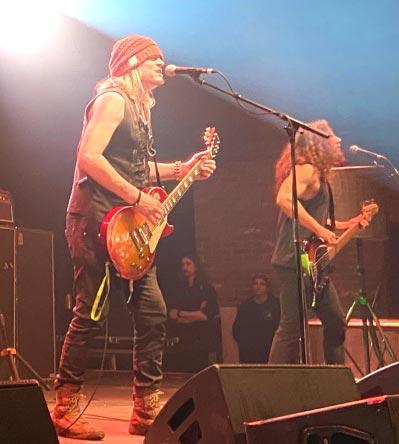
Rock And Blues International: So this is a very personal song to you then.
Wes Scantlin: Yeah, you know what, Tyler, from Theory, actually, is a co-writer on this song, Theory Of A Deadman. Wonderful, dude. And yeah, he had a couple of phrases in
there. I think it’s like, ‘if I don’t, I’ll go insane’. Yeah. So he was there helping out and we’re kind of passing the guitar back and forth and it was really fun to work with him. We’re still trying to figure out the publishing splits. Everybody puts out his hand and says fill my hand with this amount of money and then somebody else does. The next thing you know, they got their hand out. Then they take both their hands and open up their pockets and ask you to shove more money down there in the pockets.
Rock And Blues International: Are you inundated with people that want to help?
Wes Scantlin: I’m fair with everybody that collaborates on any type of musical composition with me, super fair about it. Sometimes even too fair most of the time. Everybody when they hear hits man, they come running for more percentages.
Rock And Blues International: Everybody’s got their hand out. Yeah, I like the last verse on here. “You’re never going to bring me down and I’m not your little silly clown. No one’s going to save me now but the man in the mirror.”
coke, heroin speed, all in one fucking huge shot. They put olive oil in between each drug, like a little bead of olive oil, like, shit. You know, when those type of people come in man, they gotta go into what they call detox. And they have to go to detox for like a little over a week or something like that just to just to wean them off the drugs and all the benz. Benzos are really bad, the benzos. I’m sure you might know what I’m talking about.
Rock And Blues International: I have an idea.
Wes Scantlin: But the beauty of it is which is not beautiful in the beginning, but just to see these people that are nearly basically on their deathbed come back to life and see like the color come back into their faces and see a smile, an actual truthful and honest smile and happiness, what God gives us, the feeling of happiness just like normal people that have like a good time with their family, or have a good time just talking and laughing about stuff and having a good conversation, not doing, you know, sadness, shooting up heroin and speed all all day long and meth and shit like that and cocaine and whatever the fuck. I have never shot up, but it’s really special to see and be able to help help out with some lost causes, as they might say, right? They’ve come back to life. It’s really special with a special couple of moments that you get to experience when there’s some really, really, really f@#ked up people that come in.
Rock And Blues International: Okay, the next song “U Wrekd Me. Who is U?
Wes Scantlin: That would be my exwifey poo. And my, my ex-baby mama. Not so baby anymore. He’s a grown man and awesome. But yeah, just that little, little stab at a couple of gals that weren’t so nice.
Rock And Blues International: Well, it sounded like you didn’t want to see them with “I never want to see your face again. I’m stuck in confession committing a sin.” Why are you stuck in confession committing a sin? What does that mean to you?
Wes Scantlin: Because I was promising. I was promising the angels that I would never mess around, I would be sober forever. So, I’m basically making confessions and at the same time committing a sin, like tricking, I’m tricking God and I’m tricking angels. And they don’t like that man.
Rock And Blues International: I guess not.
Wes Scantlin: Yeah, that’s right, poking poking at the devil man, poking out the little addiction, the little addiction devil. Yeah, it exists, man. It is a disease. Unfortunately it’s a disease and some people... believe me, I’ve seen some people that are way out of balance in my life. One of the really funnest things about just going to rehab a couple of times, is that when there’s some like, you know, some people, the shooters man, like the meth and they like do meth, continued on next page
Wes Scantlin: They do not like that,so it’s better to be honest with God and your guardian angels.
Rock And Blues International: You said you were in rehab. Should I ask what for?
Wes Scantlin: Yeah, that was mostly
(continued from previous page)
alcohol and basically alcohol and cocaine, probably yeah, mostly. At one certain point there for a while I was doing a combination platter of things. But yeah, I’m way, way, way better now, man. I’m really, really happy. I’m happy to not be throwing up every day, like throughout my body just trying to get all the poison out of my body. So yeah, that didn’t help either. That wasn’t me doing that on purpose.
Rock And Blues International: Right. Well, you know, when you get involved in something like that, sometimes it’s a little hard to shake it.
Wes Scantlin: Yeah. Yeah. But everything’s good now man. Yeah, everything’s good now man, I’m in a good place right now. I’m happy and I don’t think that I have to have a significant other for a little while right now.
Rock And Blues International: Is that the theme that crosses over into the next song “Complication”? “What’s the situation? What’s the complication? You’re the one who’s changing. I’m tired of being the one who is chasing.”
Rock And Blues International: Yeah, that’s what that song is absolutely about man. Yeah. A lot of times in relationships, people want you to change and there’s really no reason to change but they’re changing while they’re trying to change you. They’re changing themselves right in front of your face and it happens like clockwork every time. And it never ceases to amaze me that it happens every time like that. Somebody always wants you to change, but the thing about it is that I’m usually never around anyway. So, it’s usually like, I feel bad because I’m not really, at home ever. Every woman loves their man to just come home from work and be with the family. But I’m not that typical kind of guy, I’m always on tour. I’m always playing shows and unfortunately, stereotypically I’m banging whores and shit every night, you know what I’m saying.
Rock And Blues International: Okay.
Wes Scantlin: That’s not the case man. That’s absolutely not the case, but that’s the stigma that you get. That’s the whatever you want to call that. That what every woman believes is going on, that you’re doing, but it’s not.
Rock And Blues International: That’s people’s perceptions of rockstars.
Wes Scantlin: Yeah, yes, exactly. The girls that you become involved with, in the

back of their minds are caught... The wheels are spinning and constantly thinking about that and they really think that you’re seriously f@#king whores every f@#king night backstage. And if you come backstage to any of my shows, it is so boring. It’s like, we’re not doing anything. There’s not even ever any groupies really at all. There’s probably chicks that would die to get into the dressing room area, but there’s none. It’s just me and three other three other people talking, you know?
Rock And Blues International: Well, I understand. I spent almost my entire life involved in the music business. I’ve probably spent more time backstage than in front of the stage and let me tell you, sometimes backstage is just boring as hell.
Wes Scantlin: In my opinion, I don’t really mind it being boring. You know? I liked it. But it ain’t like there’s a bunch of bitches like wandering around naked having sex with everybody. it’s kind of boring. Really! It really is. The outsider looking in is of course. Yeah, it’s fun. It’s fun. Yeah, but there’s nothing really going on. People are eating, catering or something and making maybe a sandwich.
Rock And Blues International: Oh, yeah, it can get pretty damn boring back there. It’s just the way it is. I mean, it’s not people’s perceptions of it being like Sodom and Gomorrah, the people back there just having orgies the entire time. But actually, a lot of times, they’re just sitting there trying to warm up and get ready to go on stage.
Wes Scantlin: That’s exactly right, bro. That’s exactly what’s going on. That’s what I
do backstage. Every single night I’m warming up before I even get to the backstage from my hotel room.
Rock And Blues International: Yeah, it’s not a girl in your hands. It’s a guitar.
Wes Scantlin: Yeah, most of the time. We wouldn’t even be able to get our warmups done with some chick in your face, I’m trying to like warm up man. That’s why most of the time there aren’t any chicks or anybody at all backstage is because people are warming up and want to perform well.
Rock And Blues International: And if you don’t come out sounding good. People get really mighty upset sometimes. Yeah. Well tell me about this one verse on here. “She paints the sky, a child forever. She paints my eyes and child forever. It’s all on you.”
Wes Scantlin: I have no clue. I think those were the wrong wrong lyrics. That might have been my sister. writing them down wrong. She’s making up her own lyrics.
Rock And Blues International: Well, who wrote this song with you?
Wes Scantlin: What is it?
Rock And Blues International: “Complication”.
Wes Scantlin: That would be... I think that’s freaking Doug Ardito. Doug Ardito, my original bass player on the “Come Clean” record.
continued on next page
(continued from previous page)
Rock And Blues International: Okay.
Wes Scantlin: I think he wrote that guitar part. I think he wrote that entire musical composition. I know he did. Yeah. I just don’t know, sometimes we’ll just start flowing and songs will just tend to start flowing. Sometimes songs man, you don’t even know what the hell they’re about until years later. Then you finally go, oh, okay. Yeah. I mean, I’d have to listen to it again. I know what you’re talking about.
Rock And Blues International: right. Well, how about “California”? The song “California”.
Wes Scantlin: That song is mostly about me basically getting kicked out of California by the cops.
Rock And Blues International: Wait a minute, they kicked you out of a state?
Wes Scantlin: It almost seems like that, like kicking me out of my house and taking my house. And I think the ex-wifey poos was hooking up with a cop. I know she was. So yeah, sometimes I felt like I got kicked out of my, basically my house, like I was getting kicked out of California.
Rock And Blues International: Man, I’m sorry you had to go through all that. That’s that’s definitely terrible.
Wes Scantlin: Yeah. Weird, man. That was a weird time of life, but at least I got through it. I’m happy about that. Yeah.
Rock And Blues International: Being able to put down an album like this. Is it a little cathartic for you to be able to vent this, to let some of these emotions out, where other people can hear him and hopefully understand them and benefit from what you’ve been through?
Wes Scantlin: Yeah, I hope so man. I don’t know.
Rock And Blues International: Okay.
Wes Scantlin: I don’t know, I hate saying this,but I read it in the Bible, man. God even says, I prefer you to not get married. Don’t don’t get married.
Rock And Blues International: Okay.
Wes Scantlin: And I’m like agreeing with him. It shouldn’t be. Marriage shouldn’t be the way it is. It should be just people, a couple of people that are in love with each other that want to start a family with each other. But they don’t necessarily have to sign
like paperwork and shit you know. It should just be like a kind of a spiritual type, it should be spiritual. It shouldn’t have anything to do with money and life insurance policies.
Rock And Blues International: I think once you sign the paperwork, things go to hell sometimes.
Wes Scantlin: When you sign the paper, once you sign the paperwork, maybe. Five days after I was married, there was a life insurance policy guy in my kitchen.
Rock And Blues International: Really, that’s that’s not a very good omen.
Wes Scantlin: I know, it was like, we just got married. We were already wanting a life insurance policy. Hmm.
Rock And Blues International: Well, now you’ve got a plan on your death.
Wes Scantlin: Yep. Yeah. No, I don’t feel like I’m dying.
Rock And Blues International: But the insurance guy knows something that you don’t.
Wes Scantlin: Yeah. Well.
Rock And Blues International: What have we not talked about on this? What do you want to talk about? I mean, I’ve asked you questions about all the songs on here. What’s important. What do you want to talk about. What’s happening in your life? What’s happening with the album? What’s the important thing right now for you?
Wes Scantlin: You know, the most important thing is just I just want to to be happy. I’m having a great time during these rehearsals and it’s fun and what I’m really desperately doing here is I want to play new songs off of previous records and this record today live for the fans. That’s my goal. I don’t want to play the same exact set over and over and over again, so I’m changing the set and I’m making up other sets, so the fans can hear basically B-sides. They deserve it and hell, man, I deserve it. So I’m basically happy right now relearning songs I have to frickin’ practice myself, for me and the fans. So they can, they can hear some freakin new material and they can hear some other old material that they love. My manager and I have been going through stuff in the past that are more listenable to than other things, or whatever on the interweb. So that’s what I’m working on right now is just having new different sets, playing different songs for the folks and that’s it man. That’s it, it’s making me happy and I just want to be happy and be happy enjoying my life and staying clean as much as possible, not not getting too far out of bounds and not getting too far out of control and stand between the lines, walk and walk a nice line and yeah, man, just live life and being happy, man.
Rock And Blues International: Well, I hope I hope everything lightens up for you
with having to deal with losing the house, not to mention the ghosts in the house. You know, ex-wives and all of that stuff. Yeah, it’s time for a little, a little, how can we put it, a little peace in your life.
Wes Scantlin: Yeah. It is already like that. I am already like that. And yeah, you’ve got to watch out at your business and who you do business with,
Rock And Blues International: Right? Well, speaking of business, do you still have Matt Fuller or Dave Moreno in the band?
Wes Scantlin: Yeah, I’m not really switching anything. I’m actually doing the side project thing. So while I’m doing the side project thing, I’m just kind of like, refreshing, refreshing my own mind as I go along with my side project, which I’m calling Pro Project. So that is my other little band that I’m creating right now.
Rock And Blues International: What’s it called?
Wes Scantlin: Pro Project.
Rock And Blues International: Pro Project. Okay.
Wes Scantlin: Yeah, so those guys are cool. Everything’s cool with those guys.
Rock And Blues International: Well, good. It’s gonna be nice to see you back here in Texas. I’m based out of Texas, Houston. And Puddle Of Mudd played in Houston so many times that for a while, I thought you were going to become a local band. You were playing down here all the time. Well, if there’s nothing else, I’ll let you go unless you got something you really want to get off your chest.
Wes Scantlin: Yeah, I love all my fans and we’re coming with a badass new couple of sets and different song options and that’s about it.
Rock And Blues International: All right. Well, thanks for calling. I’m looking forward to seeing you back in here in Houston one of these days.
Wes Scantlin: Man, we’ll see you brother.
Rock And Blues International: Okay. Bye bye.
As you can see, Wes is ready to hit the road and start performing these new songs for Puddle Of Mudd fans out there. Wes has been through quite a lot as you can tell from the interview that you just read, but the future looks bright for him as he gets ready to start performing again. We’d like to urge everybody out there reading this story to pick up a copy of Puddle Of Mudd’s new album Ubiquitous. We really think you’re going to like it. That’s right, Puddle Of Mudd is back and ready to rock!!
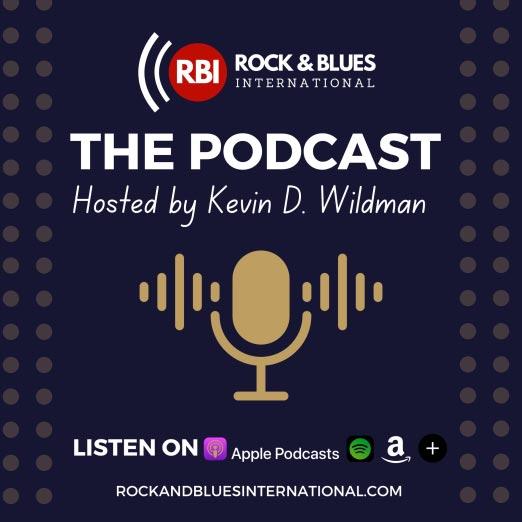

When a team of four mastering professionals were asked at a Recording Academy (Grammy) technical meeting what mastering was the panel members smiled and with tongue in cheek replied that no one was quite sure what the exact definition was but you can bet it’s there when you hear a great piece of music. Basically, that’s correct because in the simplest terms when you hear something that the instrumentation is not over powering the vocals you can bet that it’s the mastering that set the levels. The bottom line is that mastering is an art form, results rely on the ear of the person doing the mastering work. Enter Nick Landis, protégé of the world famous Jerry Tubb. Landis’s credits range from symphony music to country to Americana to rock and more including the sound track credits such as can found in “Sin City A Dame To Kill for”. The foundation of Nick’s experiences can be traced back to his uncle’s influence while in his formative years. His uncle would crank up ZZ Top’s Eliminator album and Nick would think wow this is really great. He credits these experiences as the original foundation of his love of the guitar but that was far from the end of it. Young Nick started piano lessons in kindergarten additionally church choir through elementary school then saxophone in school band starting in 5th grade finally circling back to guitar, classical guitar, starting in 8th grade. Yet his thirst was not quenched so he joined marching band and on top of that jazz band in high school. Originally he lived in Wooster Ohio then they moved to Toledo until Mom got a full scholarship that took them to SMU in Texas. After his formative years in Toledo they would live in Texas and all of his coming of age experiences including his increased passion for music would develop even more. He had been learning the guitar and could not get enough so much so that this inherent desire moved his level of understanding far beyond normal expectations and with this came a well earned degree. In his freshman year in college he majored in jazz guitar and this is when the roots of becoming a sound engineer took shape. In fact it was his first audio job with the One O’Clock Lab Band at UNT that moved his interests rapidly toward transferring into the highlyselective Sound Recording Technology program at Texas State. This would lead to Nick meeting the world renowned mastering expert Jerry Tubb at Terra Nova.
Nick received a great honor as he was chosen to intern for the great master himself. Nick would go on to become an integral part of the Terra Nova team and was actively involved in beta testing the new mastering compressor

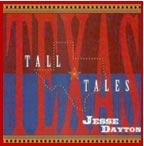 in Houston
in Houston
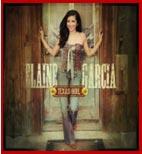
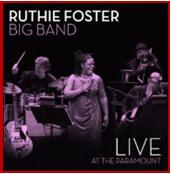
 Nick Landis
Nick Landis
designed by Rupert Neve and his team at Rupert Neve Designs. Today, with these experiences behind him he is a revered expert on all phases of recording and mastering at his studio in Austin, Texas. His collection of studio projects shouts of a who’s who in music including Willie Nelson, Ruthie Foster, Dale Watson, Elaine Garcia, Jesse Dayton and more. But it doesn’t stop there, the man also gives credit where credit is due to other professionals on his website. For example, if another studio records the artist/band and he is contracted for mastering duties he lists their credits on his site as well as any others that could be mentioned. On another front the man continually educates those that are looking for industrial level support on rising technologies such as Dolby Atmos (he’s certified by Dolby). However, the education is not limited to new technologies but also encompasses existing technologies that many independent artists do not fully understand. A prime example is the topic of metadata. Without the proper metadata in place radio stations that spin the song cannot submit the spin to the chart tracking companies. Therefore the song is not going to chart even if it’s gaining strong radio play. Nick shares, “This happens way too often, but it doesn’t have to happen. It’s a simple fix but it must be done before the product is submitted to radio. (Some of this is automatically addressed when submitting to streaming platforms, they have the artist fill out a form with all the metadata during the submission.) In this instance, metadata like the ISRC (International Standard Recording Code) is used as a unique identifier much like a more well-known identifier called a bar code. It’s easy to place when mastering, but without it preferred results on the business side are limited. This information should be as descriptive as possible removing any barriers to identify anything about the recording in question. Tags like album artist, track title, album title, and genre are all common but frequently left off; other tags like ISRC and IPI, used for publishing rights, are less common but can be very important. The end result is that these tags help identify all kinds of information about specific recordings and without them, information gets lost.” At times artists wonder why a song seems to be doing good but no money is coming their way. Could it be it’s the improper listing of the metadata or possibly there isn’t any tag at all. Learn more at www.NickLandis.com
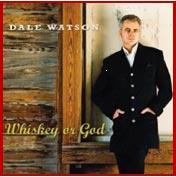

Adding to the excitement ahead of her Feed the Beast World Tour, GRAMMY winning international pop sensation and critically acclaimed songwriter Kim Petras has unexpectedly released her long-awaited album Problematique as a surprise for her fans via Republic Records/ Amigo Records. LISTEN HERE to stream / download.
Previously shelved after partially leaking and leaving fans clamoring for more, Problematique has been unearthed from the vault as 10 tracks of euphoric escapist pop inspired by French house music and Parisian soundscapes. Shimmering with magnetic, laissez-faire confidence and giving Kim even more new music to perform on her upcoming global tour, Problematique features stand out track “Treat Me Like A Ho,” a bratty flex that brims with untouchable, sugar baby confidence. The album also features starry-eyed, funk banger “Born Again,” a defiant, selfassured burst of fun in title track “Problematique,” sultry, smooth bop “Deeper,” and “All She Wants” – a materialistic, tongue-in-cheek anthem featuring the iconic Paris Hilton.
Kim also recently shared reimagined, symphonic, 7-piece string ensemble performances of fan favorites from her acclaimed debut album Feed The Beast – a declaration about being willing to be consumed by pop music, her biggest passion in life, that was inspired by the euphoric Eurodance hits that she would lose herself in growing up. CLICK HERE to watch three unforgettable performances of fan favorites lifted by Kim’s powerful, polished vocals that include a dynamic, melodic rendition of diamondselling hip-hop icon Nicki Minaj’s iconic verse from powerhouse single “Alone,” a yearnful, heart-wrenching version of “Minute,” and a powerful, stripped-back sonic reinterpretation of “Claws.”
The North American leg of Kim’s upcoming Feed The Beast World Tour, produced by Live Nation, kicks off September 27 in Austin, TX, bringing her largerthan-life live show to major cities coast to coast, including Boston, Brooklyn, Chicago, San Francisco, Los Angeles, Nashville, Houston and San Diego, as well as Canadian stops in Toronto, Montreal, and Vancouver. Kim will then embark on a UK/European run of shows beginning February 13 in Birmingham, UK which will bring her to cities overseas including Manchester, London, Brussels, Paris, Cologne, Amsterdam and Milan. The tour also offers a variety of different VIP packages and experiences for fans to take their concert experience to the next level. Packages vary but include Meet & Greet and photo op with Kim, early entry into the venue, and limited-edition merchandise. Please visit KimPetras.com for tickets, VIP packages, and tour info, and watch the
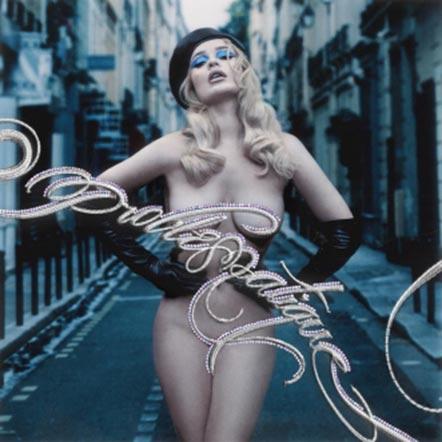
tour announcement video here at https://youtu.be/OwKJRNsi0r0
Having recently performed at festivals around the world including Governor’s Ball in NYC, Osheaga in Montreal, and The Town in São Paulo, Brazil, Kim is also slated to perform at Life is Beautiful in Las Vegas on September 24 and Corona Capital in Mexico City on November 18.
Kim is continuing a milestone year that has included winning her first (and LGBTQ history making) GRAMMY Award (for “Unholy”) alongside Sam Smith – who she just jumped on stage with at The Forum in Los Angeles for a surprise live performance –attending the Met Gala as a guest of Marc
Problematique tracklist: Side A
Problematique
Je T’Adore
All She Wants (featuring Paris Hilton)
Born Again
Something About U Side B
Treat Me Like A Ho
Confession
Deeper
Dirty Things
Love Ya Leave Ya
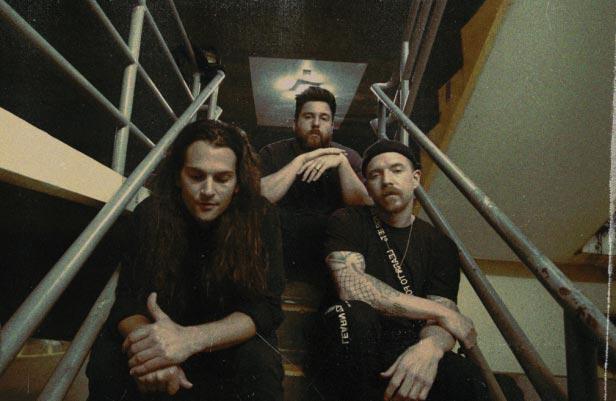
Prog metal voyagers NIGHT VERSES have dropped Part 1 of their phenomenal new double album ‘Every Sound Has a Color In The Valley Of Night’ today via Equal Vision Records. The release has been long-awaited by fans and critics alike and is the band’s first in over 5 years. Its highlighted by focus track and album opener, ‘8 Gates Of Pleasure’.
Speaking on the long-awaited release of Part 1, NIGHT VERSES collectively share:
“It’s kind of a weight off our shoulders to finally release this album after writing for so long, if we’re being honest. We started writing these songs before we even released our last record in 2018, so it’s been a long time coming. That being said, we genuinely needed all of that time to get this record to where it’s at. We wrote and rewrote these songs a million times. We wrote tons of parts and songs that we loved but just didn’t make the cut. Between the 3 of us, the most important thing was that we were 100% satisfied that we made the best record we could. As of now, I think we accomplished that.
“Between 2012 and 2017 we put out records and toured around non-stop. That part of our lives still has a huge impact on us, and we talk a lot about certain landscapes and specific drives - how we’d purposefully create playlists that matched the moods and feelings we had while essentially driving around the world together. That influence ended up being an underlying concept for this record. There’s a ‘map’ included in the vinyl artwork that shows all the locations that correspond to the songs, and where they are meant to be listened to (to hopefully express themselves to the fullest extent, as those are the locations we were channeling when writing the songs.) Ultimately we want the listener to absorb the album however comes natural to them, but if we can act as a guide to assist it with the locations - then that’s just an added bonus, in our minds anyway.”
The band have released two singles prior to the album dropping. Their comeback single “Arrival” ( https://youtu.be/ eK8ogOTQOb4 ) which heralded the end of their hiatus and “Karma Wheel” ( https:// youtu.be/7KCTKlYRFHk ) which offered a second glorious expedition into this boundary-pushing new era of NIGHT VERSES. Speaking on the inspiration behind today’s focus track, ‘8 Gates of Pleasure’, the band continue
“With ‘8 Gates Of Pleasure’ (and all of our album openers), we’ve always had two sort of ‘requirements’ we apply. 1. It needs to feel like a thesis statement of the entire record, a song that hints at all the pieces of the rest of the album. 2. It needs to be immediately unpredictable, something that keeps you from knowing what’s coming next.
Quinten Tarantino said a good story needs to unfold without you knowing what to expect. We get a lot of influence from films and other art forms outside of music - and
that concept specifically has always stuck with us. We definitely tried to lean into it when we were developing this song, especially once we knew it was going to be the album opener.”
‘Every Sound Has a Color In The Valley Of Night’ will be released in two parts. Part 1 is out today and Part 2 will be due out in early 2024. Across both parts, the album features a star-studded cast of guests including Tool bassist Justin Chancellor, Author & Punisher, Incubus frontman Brandon Boyd and Circa Survive’s Anthony Green, ‘Every Sound Has A Color In The Valley Of Night’ sees NIGHT VERSES tear up the rulebook with a kaleidoscopic vision and truly living up to the accolade given to them by Noisey who referred to the band as “the Salvador Dali of Progressive metal”.
Fearless as ever in their exploratory vision, NIGHT VERSES once again raise the bar for creativity and innovation in heavy music.
Hailing from Fullerton, CA, NIGHT VERSES first galvanized listeners with their 2012 EP ‘Out Of The Sky’, merging prog, alt-metal, post-rock and ambient electronica into their own intoxicating strain of cinematic metal.
They continued to hone their bold songwriting and genre-bending musicianship on their debut full-length, 2014’s ‘Lift Your Existence’. After the mass critical acclaim
that followed, they returned in 2016 with the full-length ‘Into The Vanishing Light’ produced by legendary producer Ross Robinson (Slipknot, At The Drive In). The album was the band’s first release after signing with Equal Vision Records, and marked their last album with a vocalist.
The band released their first instrumental album 2018, with the critically acclaimed ‘From The Gallery Of Sleep’, which cemented them as fearless, genredefying innovators. Dubbed “The Salvador Dali of prog-metal” by Noisey / Vice, the album was hailed as “boundary-breaking prog” (Revolver), “ambitious and creative” (Exclaim!) and “a layered prog masterpiece” (Distorted Sound).
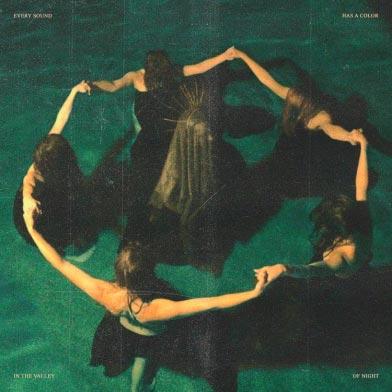
Now after a 5-year wait that’s felt like an eternity, NIGHT VERSES are back to reclaim their rightful place at the forefront of progressive heavy music. With over 15 million career streams and unanimously glowing critical praise for their first four releases, the stage is set for NIGHT VERSES to ascend to even greater heights.
1. 8 Gates Of Pleasure
2. Arrival
3. Rose Wire
4. Karma Wheel
5. Love In A Liminal Space
6. Bound To You
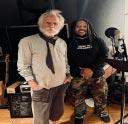
Stephen Marley has just unveiled “Winding Roads,” the latest single from his highly anticipated album Old Soul, out digitally, September 15th via Tuff Gong Collective/UMe/Ghetto Youths International. Bob Weir of the Grateful Dead and singer/ songwriter Jack Johnson join Marley on the new track recorded at Bob Weir’s TRI Studios with his Wolf Bros band, including Don Was and Dead & Company members Jeff Chimenti and Jay Lane. Preorder the new album and listen to “Winding Roads” now here at https://stephenmarley.lnk.to/ OldSoulAlbumHERE.
“Winding Roads,” metaphorical of life’s journey, struggle, and eventual salvation, soulfully closes out the newOld Soul LP with interlacing guitar and vocal trade-offs fromWeir, Marley and Johnson, creating an unforgettable bluesy classic and the only song from the album recorded with a full band.
I’ve seen the paved highways, But none of them is headin’ my way, How long must we drive these windy roads? How long must we drive these windy roads?
You struggle so hard, oh good people, I’ll help you carry your load, How long must we drive these windy roads? How long must we drive these windy roads?
The release of “Winding Roads” follows two previous singles, “Old Soul” and “Cool As The Breeze.” A retrospective music video for the album’s title track, “Old Soul,” released earlier this summer, features unseen family images and a montage of Jamaican musical heritage. A warm acoustic narrative, the song carries listeners through Stephen’s evolution, intertwined with the Marley legacy. Lyrics such as “April 1972, my mom and poppa brought me through, back then I was the favorite, so they say,” give a nod to his lineage and early years. Originally penned by Jamaican artist Omi, Stephen adapted the song to reflect his personal journey, suggesting a familiarity with past life experiences. Echoing his father’s sentiments, Stephen’s core message promotes mental freedom and unity.
His first full-length project since 2016, Old Soul comes as a complete revelation. While grounded from the road during the COVID lockdown, Stephen set up a new studio on a remote family farm in the Florida countryside, holding nightly jam sessions in a converted garage. With a stripped-down ensemble comprising binghi drums, bass, acoustic guitar, and flute, Stephen played whatever he felt like — ranging from original compositions and reggae rarities with deep personal meaning to classics recorded by Ray Charles, Frank Sinatra, and The Beatles. “Irie vibration,” Stephen says of the sounds made together on the farm. The lion’s share of Old Soul was recorded during these “unplugged” jam sessions.
The latest single from Marley’s upcoming album ‘Old Soul,’ which also features Eric Clapton, Ziggy Marley, Damian “Jr. Gong” Marley, and more ‘Old Soul’ Available Digitally now via Tuff Gong Collective/UMe/ Ghetto Youths International continued on next page
(continued from previous page)
Old Soul explores a musical palette that spans a variety of cultures and genres alike, with hand-selected special guests furthering the spiritual journey that encompasses the album. Stephen and his elder brother Ziggy collaborate on “There’s A Reward,” a heartfelt tribute to Joe Higgs, the man who mentored young Bob Marley, Peter Tosh, and Bunny Wailer when they were all aspiring singers in Trenchtown. Meanwhile, Stephen’s younger brother Damian “Jr. Gong” Marley features on “Cast The First Stone,” a powerful, thought-provoking tune set to an ominous groove that sounds like something from a lost spaghetti Western soundtrack.
Stephen enlists his old friend Buju Banton on the ska-flavored “Thanks We Get (Do Fi Dem),” a Lee “Scratch” Perry composition made famous by Junior Byles that explores the idea that no good deed goes unpunished. And Kyle McDonald of Slightly Stoopid joins on a verse on “Standing In Love,” a beautiful ballad that hearkens back to reggae’s sweet rocksteady era.
Eric Clapton laces up tasty lead guitar riffs over a powerful acoustified version of Bob Marley’s “I Shot The Sheriff,” a song Clapton originally helped to immortalize.
“We definitely did want some different sounds,” says Stephen. “We never want to come with the same ray ray ray. We try to make some of them something you can’t really identify. Ah, just music.” Among the more unexpected selections embedded on Old Soul are a disarmingly sweet cover of Sinatra’s “These Foolish Things (Reminds Me Of You),” as well as Marley’s take on The Beatles’ perpetually pleading “Don’t Let Me Down.”
The song selection on the new album demonstrates Stephen’s courage to defy expectations. “You have to be true to yourself,” he says. “I refuse to be put into any category. I am inspired by everything. So if I feel like I want to play some jazz music, I will go play some jazz music. Who dig it, dig it.”
In celebration of the new album, Stephen Marley will embark on his ambitious Old Soul Tour -Unplugged 2023 this Sept 8 - Oct 22. (Following the Old Soul album’s track listing, the fall tour dates appear at right.)
Stephen “Ragga” Marley is a world-renowned singer, songwriter, and producer whose work has earned no fewer than eight Grammy Awards. Born into a musical family, Stephen is the child of reggae legends Bob Marley and Rita Marley. He began singing professionally at the age of 6, touring the world with his elder siblings Ziggy, Sharon, and Cedella in The Melody Makers. In 2008, he released his first solo album, Mind Control, which won the Grammy Award for Best Reggae Album. His subsequent solo albums include Mind Control Acoustic, Revelation Part I: The Root of Life, and Revelation Part II: The Fruit of Life. On September 15, Stephen releases his forthcoming full-length album, Old Soul, via Tuff Gong Collective/UMe/Ghetto Youths International. The new album is a departure from his previous Reggae repertoire, showcasing more of his bluesy, acoustic soul side, as evidenced by the first single, “Old Soul.” Stephen is also an acclaimed producer, working closely with his brother Damian “Jr. Gong” Marley on the massive crossover hit Welcome To Jamrock. In addition, Stephen continues to champion charitable endeavors centered in Jamaica as a co-founder of the Ghetto Youths Foundation, along with his brothers Damian and Julian Marley. ?In 2017, Stephen established Kaya Fest, the annual music festival, which features special guests and rare family performances, all with the larger purpose of raising awareness around the benefits of cannabis, guided by the mantra “Education Before Recreation.” This summer, Stephen embarked on his annual, hugely successful Babylon By Bus Tour, and this week, he commences his Old Soul Tour Unplugged across the US.
STEPHEN MARLEY: OLD SOUL [Digital, CD & 2LP]

Don’t You Believe Cool As The Breeze
Cast The First Stone – Feat. Damian “Jr. Gong” Marley
Thanks We Get (Do Fi Dem) – Feat. Buju Banton
Don’t Let Me Down Georgia On My Mind Let The Children Play Old Soul
There’s A Reward – Feat. Ziggy Marley This Time
These Foolish Things (Reminds Me Of You)
I Shot The Sheriff – Feat. Eric Clapton
Standing In Love – Feat. Slightly Stoopid
Winding Roads – Feat. Jack Johnson and Bobby Weir & Wolf Bros.
STEPHEN MARLEY: OLD SOUL TOUR UNPLUGGED – FALL 2023 TOUR DATES
Thu Oct 12 - Beverly, MA - Cabot Theatre
Fri Oct 13 - Plymouth, NH - The Flying Monkey
Sun Oct 15 - Glenside, PA - Keswick Theatre
Tue Oct 17 - Englewood, NJ - Bergen PAC
Wed Oct 18 - Silver Spring, MD - The Fillmore
Fri Oct 20 - Norfolk, VA - NorVa
Sat Oct 21 - Columbia, SC - The Senate
Sun Oct 22 - Atlanta, GA - Center Stage

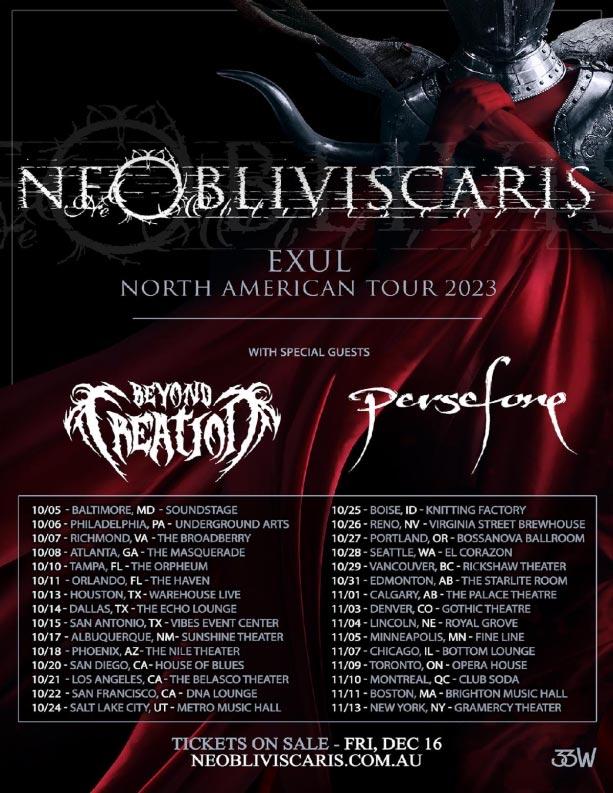
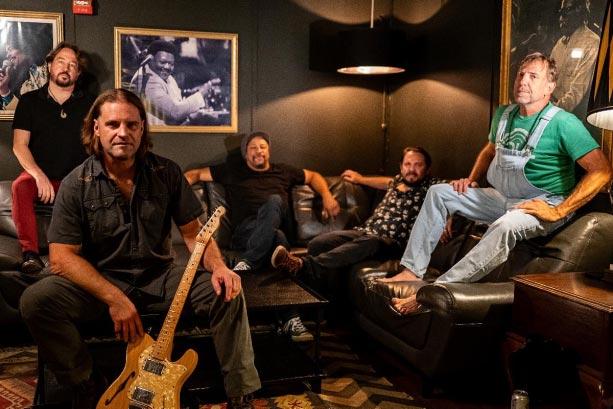
Press Here To Listen @ https://add.colorredmusic.com/gone
Press Here To Watch Official Music Video @ https://www.youtube.com/watch?v=-n0BXX-6n3c
FOLLOW HONEY ISLAND SWAMP BAND: Website @ https://www.honeyislandswampband.com

Facebook @ https://www.facebook.com/honeyislandswampband
Instagram @ https://www.instagram.com/honeyislandswampband/ X/Twitter @ https://twitter.com/i/flow/login?redirect_after_login=%2FHISBNOLA
YouTube @ https://www.youtube.com/channel/UCB07oINgK8OJdnOobqm44UA
Spotify @ https://open.spotify.com/artist/3NrgJjsUdXDR6HVKjPrZ7k
Press https://hypeddit.com/ld2fjg to pre-save on DSPs
Press https://color-red.com/products/pre-order-honey-island-swamp-band-custom-deluxe-lp to pre-order vinyl
Press https://color-red.com/products/pre-order-honey-island-swamp-band-custom-deluxe-cd to pre-order on CD
(continued from previous page)
Acclaimed New Orleans-based blues-roots-rock quintet Honey Island Swamp Band has released their new single “Gone” and announced their sixth studio album, Custom Deluxe, will be released on Friday, October 27th. “Gone,” the first track recorded for the new album, was tracked at Eagle Wind Sound studio in Winter Park, Colorado, owned by the Alan Parsons’ Project’s singer, PJ Olsson.
“‘Gone’ was a really fun tune to write and always a pleasure to perform,” shares front man Aaron Wilkinson. “I love songs with clever lyrics and a lot of them. Singing these harmonies with the guys in the band never gets old.”
Of the new album, Wilkinson adds, “In the years it took to make this album, we all went through unprecedented changes. It seems like ages since we released a new record, so we are just thrilled and feel extremely blessed to finally share these new songs with the world. And getting to put this out through Color Red is such a bonus. Not only is Eddie Roberts a personal friend, but he and the entire team are among the finest musicians and creative talents we have ever had the pleasure to work with. We are proud and extremely thankful to be a part of the Color Red family.”
“Honey Island Swamp Band are longtime friends and collaborators,” says Color Red label head Eddie Roberts. “From first meeting Chris Spies when I was living in NOLA and we played the legendary Maple Leaf together, or the time the band brought me on stage for their Jazz & Heritage Festival set, which was my first time playing the famed fest, there’s always been a strong musical connection between us. Not to mention that we tracked a couple of the album’s songs at our Color Red studio. It was an obvious decision to bring the band on board for this great album release on Color Red.”
Custom Deluxe marks the most satisfying, consolidative album to date for Honey Island Swamp Band and the follow-up to 2016’s Demolition Days. Songs like the kinetic “High River Rag,” authoritative “Wildfire” and blues-rocking “Sugar for Sugar” display these musical omnivores at a new zenith. The 10 songs on Custom Deluxe, produced by Jack Miele and Wilkinson, were recorded at various studios around the U.S. during off days amidst a heady touring cycle, including on top of a mountain in Colorado and a lengthy session in the Big Easy. Previously released single “Second Son” https://open.spotify.com/track/4z5kvWH3Yz7gwpDwiCmy1H was recorded at Color Red’s Denver studio with Roberts accompanying on the song.
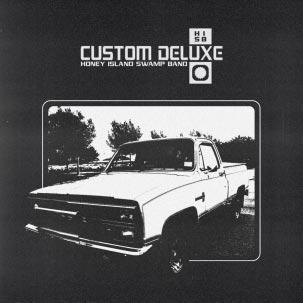
Hney Island Swamp Band will head out on the road this fall in support of Custom Deluxe including various shows in New Orleans and select festival appearances. The band will officially celebrate the release of Custom Deluxe on Saturday, October 28th with a hometown album release party at Maple Leaf in New Orleans with The Lucky Strokes. See below for upcoming dates and visit www.honeyislandswampband.com for more information.
Since forming in 2005 in San Francisco after their displacement from New Orleans via Katrina, and subsequently relocating back home, Honey Island Swamp Band has evolved to embody contemporary roots music. The fivesome —
bandleader and multi-instrumentalist Aaron Wilkinson, guitarist and vocalist Lee Yankee, bassist Sam Price, keyboardist Chris Spies, and drummer and vocalist Garland Paul — is a thrilling, eclectic band that defies genre conventions, renders song structures elastic, and wholeheartedly stresses that the song reigns supreme. Their music is melodydriven, vocal-driven, and lyric-driven, with influences that range from Jason Isbell, John Prine, Little Feat, Junior Wells and The Meters to Fleetwood Mac, Taj Mahal, Iron and Wine, Peter Gabriel, and Beck. Throughout their storied career, Honey Island Swamp Band has performed at the New Orleans Jazz & Heritage Festival for 15 consecutive years as well as appearances at Bonnaroo, Outside Lands, Americana Fest Nashville, Thunder Bay Blues Fest, Jam Cruise, and many more, and have toured and/or performed alongside the likes of JJ Grey and Mofro, Leftover Salmon, Trombone Shorty and Orleans Ave, Soul Rebels, Galactic, Karl Denson’s Tiny Universe, Derek Trucks Band, Anders Osborne, and North Mississippi Allstars.
As a whole, Custom Deluxe shows the Honey Island Swamp Band to represent the best of two worlds: a band capable of sharp, solid writing, who can also bend and stretch the material live in the spirit of Van Morrison or the Allman Brothers Band. After so many years together, the band is more capable than ever of surprising you and sticking in your craw.
HONEY ISLAND SWAMP BAND TOUR DATES
October 13 – Fairhope, AL @ Wynterfest
October 14 – New Orleans, LA @ Crescent City Blues & BBQ Festival
October 19-20 – Grass Valley, CA @ Sugar Pine Music Festival
October 28 – New Orleans, LA @ Maple Leaf *Album Release Party
November 4-11 – Spanish Fort, LA @ Big Easy Cruise
December 2 – Ocean Springs, MS @ Silent Light Fest
December 3 – New Orleans, LA @ Saints Pre-Game Concert
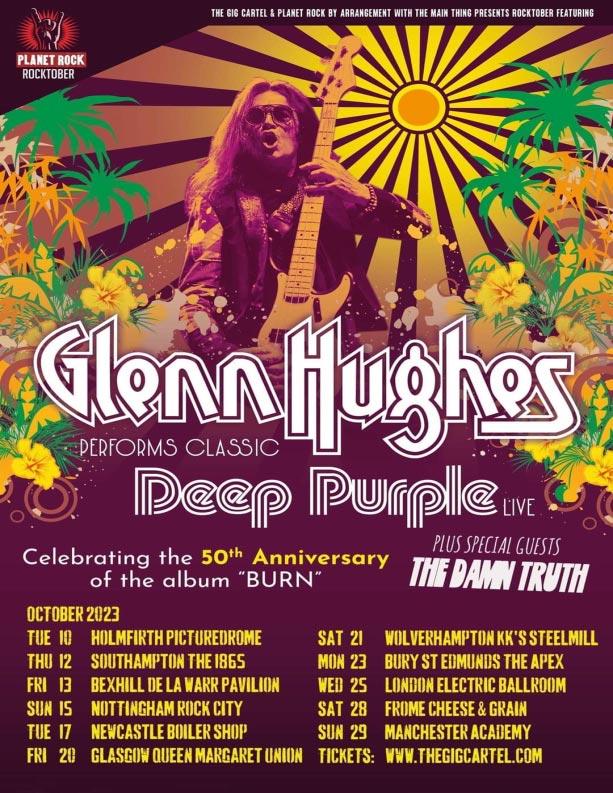
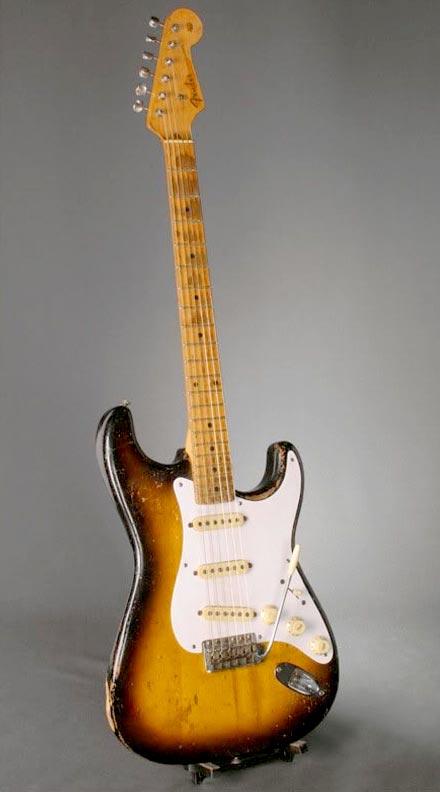

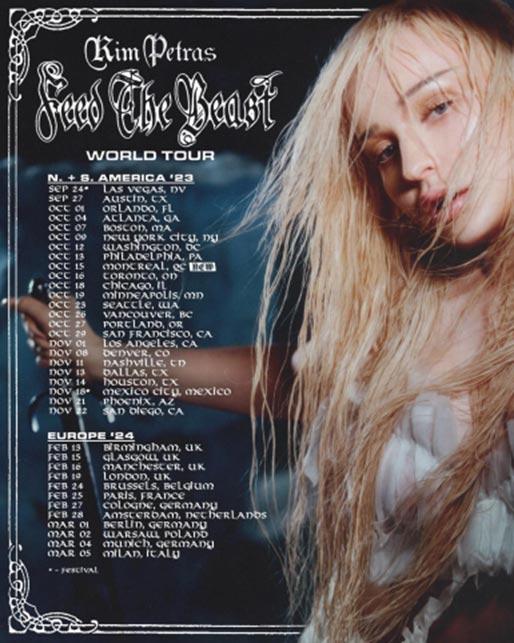
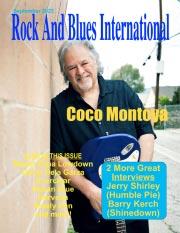
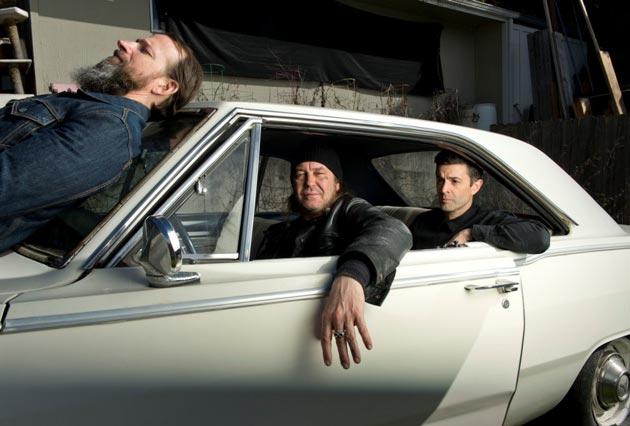
Iconic U.S. rock band, High on Fire, celebrates its 25th anniversary in 2023 and today the GRAMMY Award-winning group, featuring bassist Jeff Matz, guitarist/vocalist Matt Pike, and new drummer Coady Willis (Melvins, Big Business, Murder City Devils) announces U.S. tour dates centered around its showcasing appearance at Austin’s Levitation Festival. The weeklong run will launch on October 26 in Dallas, Texas and hit multiple cities in Colorado and California before wrapping on November 4. Support
on the High on Fire tour will be provided by Pallbearer.
”Who is ready to rip it up?!”, said the band in a statement. “High on Fire is primed and ready to rock and continue celebrating our 25th Anniversary with family, friends, and fans. See you at the shows!”
High on Fire has completed work on its new, untitled ninth studio album and successor to 2018’s ‘Electric Messiah’. Recorded in Salem, Massachusetts with longtime pro-
ducer Kurt Ballou, the new album is the first to feature drummer Willis, who joined High on Fire in 2021. An early 2024 release date is expected via MNRK Heavy. See below for sneak peek looks at the band creating the new LP.
Universally recognized as one of the most potent acts in music today, High on Fire creates dynamic metal that merges primal fury and aggression, hesher bombast and hall of fame
continued on next page
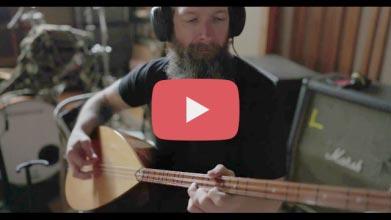
(continued from previous page)
heaviness. Described as “a supersonic exercise in conquest by volume,” High on Fire has rewritten the hard rock rule book since its formation in 1998, forging a style and sound that is both critically celebrated and unique. The group features vocalist and cult guitar hero Matt Pike (also a founding member of the famed underground band SLEEP) singular bassist Jeff Matz, and powerhouse drummer Coady Willis. High on Fire’s most recent studio album, ‘Electric Messiah’, was released on October 9, 2018, and won a GRAMMY for Best Metal Performance, placing High on Fire among the ranks of groups such as Black Sabbath, Motorhead, and Metallica as winners of the prestigious award, presented by The Recording Academy to recognize achievements in the music industry. at Action! Public Relations.
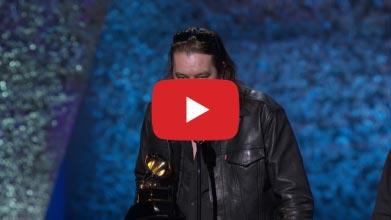
October 26 Dallas, TX @ The Factory
October 27 Austin, TX @ Stubb’s (Levitation Fest with Uncle Acid & the Deadbeats)
October 29 Fort Collins, CO @ Washington’s
October 30 Denver, CO @ The Summit
October 31 Colorado Springs, CO @ The Black Sheep
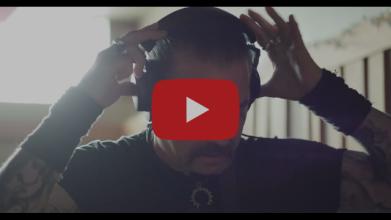
November 2 Garden Grove, CA @ Garden Amp
November 3 Fresno, CA @ Fulton 55
November 4 Berkeley, CA @ UC Theatre


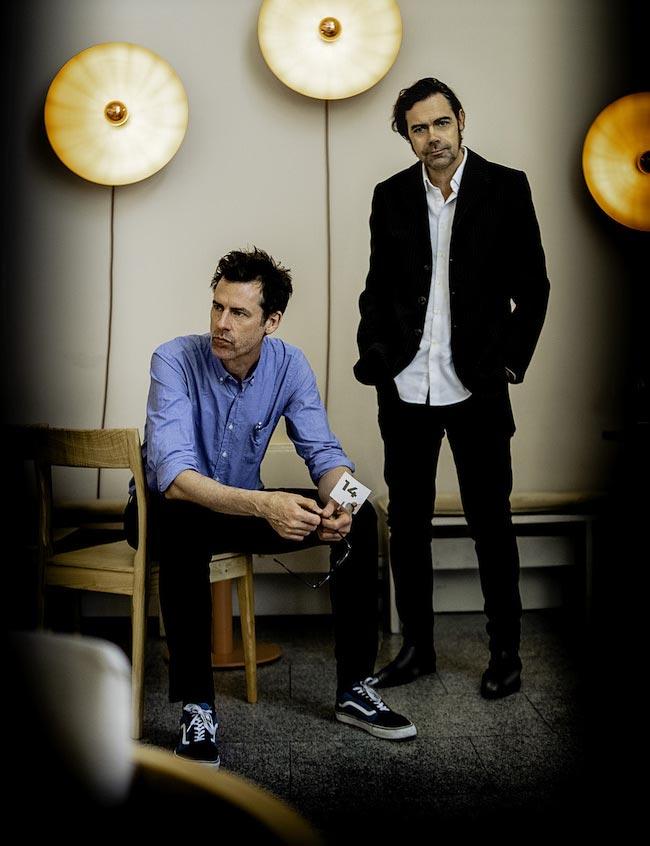
The Conscience Pilate play guitardriven pop music that combines the energy of CBGB’s post-punk with the texture of 80’s alternative. The new single “Blue Shadows” marks the return of Toronto indie art rockers The Conscience Pilate and the start of their new collaboration that will see new singles arriving monthly for the remainder of 2023. After a 25 year hiatus, Edward Pond and Neil Leyton decided to reunite and immediately wrote new music over a bottle of Rioja. The Conscience Pilate started in Toronto in 1995 when songwriting duo Edward Pond and Neil Leyton finished university. As with most urgent rock projects, TCP self-destructed after just one album, but Pond and Leyton remained brothers. One night in November 2022 Neil said, “We have some unfinished business. Let’s make another record.” Two songs were written that night alone in Montreal. Reflecting on the new single “Blue Shadows” Leyton said, “ I come from a broken family, or rather, three. This is a song about the important things that can often go wrong in life. I’ve made some poor decisions along the way, and you have to reconcile yourself to yourself and hopefully also to the people concerned. Make amends. At the end of the day, life is short and we should recognize that no one is perfect - and then one day it is all over and you haven’t taken nearly all the right steps…”
“Blue Shadows” began with a painting Edward spotted over the toilet at his local coffee shop. The kind of painting you study for a moment as you use the facilities. “On the canvas there’s a little town with blue shadows on the snowy ground. I jotted that detail down along with its opposite — golden rays. I also have this recurring nightmare of the sun going black, leaving a dark disc in the sky against the stars. Neil dug both, so we packed them together into a lyric.” Getting the third in their series of singles proved to be more challenging than the first two. Pond recorded his bass tracks and vocals from a hospital bed in Toronto. As recording began, he was rushed by ambulance for an emergency appendectomy and spent two weeks in the hospital hooked up to a cluster of IV lines. Then he was discharged just in time to film a video for the song. Stacy Stray (Die Mannequin, The Valhounds) plays lead guitar on Blue Shadows. Stray was in the Conscience Pilate in 1997 and Leyton and Pond are thrilled to team up with him again on their new tracks. Stacy’s guitar will power several new songs in the coming months.
It takes a village, so while Pond and Leyton remain the core of the band, many of their musical cohorts from across the years are stepping up to play drums, guitars, record and pour synergy into this project. The band reunion happened because Pond had been storing 300 of Leyton’s vinyl records for the last 12 years, when Leyton moved to Lisbon. Finally Leyton came to Montreal (for the M for Montreal conference) and brought a set of
three purple suitcases to stuff with vinyl to take back on the plane to Lisbon. They had piles of records on the floor of the hotel parking garage when Neil said, “Okay, we need to make our own record now.” They wrote Army of Devils that night. Starting in the summer of 2023 The Conscience Pilate will release a new single each month, beginning with “Army of Devils”, “Bloom” and now “Blue Shadows”.
Twitter: https://twitter.com/TCPyyz
Website: https://www.theconsciencepilate.com
Facebook: http://www.facebook.com/theconsciencepilate
Instagram: http://www.instagram.com/theconsciencepilate
Spotify: https://open.spotify.com/artist/ 0dfNztpYBt2fTT5A9n7oyk?si=sQ5VejawTkmd8zD2XPLFng
https://theconsciencepilate.bandcamp.com/track/blue-shadows
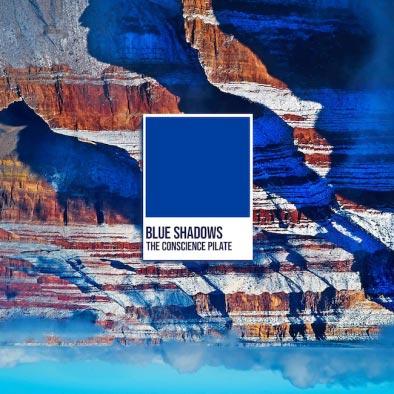
https://www.youtube.com/watch?v=zZwm7fevg_s
https://music.apple.com/pt/artist/the-conscience-pilate/1276135110?l=en


Up-and-coming German hard rock band WUCAN have signed a worldwide record deal with the SPV label, Long Branch Records. The quartet from Dresden recently entered the German album charts for the first time in their career with their latest album Heretic Tongue, followed by impressive performances at numerous European festivals.
“WUCAN expands our artist roster as a highly motivated and promising group that knows how to win you over, especially live,” comments Long Branch Records label manager Manuel Schönfeld. “WUCAN innovatively merge the most diverse rock genres to create a legendary sound for today’s time.”
WUCAN manager Karl Walterbach adds: “With Long Branch Records / SPV, WUCAN has now found a label partner that is perfectly positioned internationally. This allows us to make optimal use of the global networks of our booking agent, MAD Tourbooking/Berlin. The first result will be a small UK tour in October 2023. We are looking forward to the upcoming cooperation.”
WUCAN are here to break up ossified genre conventions. Using 1960s rock rubrics, the band reaches past that traditional Anglo-American heritage, leaning instead, into the rock history of East Germany. Who out there can recall East German hard rock bands such as Babylon, Berluc or Blitzz? It is legendary names like these WUCAN pay homage to, and with virtuoso bandleader Francis Tobolsky, deliver the freshest new spirit in the German rock scene.
WUCAN will bring their energetic live show back to the stage in September and October. After the four-piece represent in their hometown of Dresden on September 21st, they will, for the first time, head to the UK to perform in London, Glasgow & Newcastle Upon Tyne.
WUCAN are: Francis Tobolsky - Vocals / Guitar / Flute / Theremin, Tim GeorgeGuitar, Philip Knöfel - Drums, and Alexander Karlisch - Bass
WUCAN Live:
06.10.23 NL, Tilburg - Little Devil
07.10.23 UK, London - The Black Heart
08.10.23 UK, Glasgow - Audio Glasgow
09.10.23 UK, Newcastle Upon TyneTrillians Rock Bar
WUCAN online: FACEBOOK @ https:// www.facebook.com/wucanmusic INSTAGRAM @ https:// www.instagram.com/wucantheband/ WEBSITE @ wucan-music.de

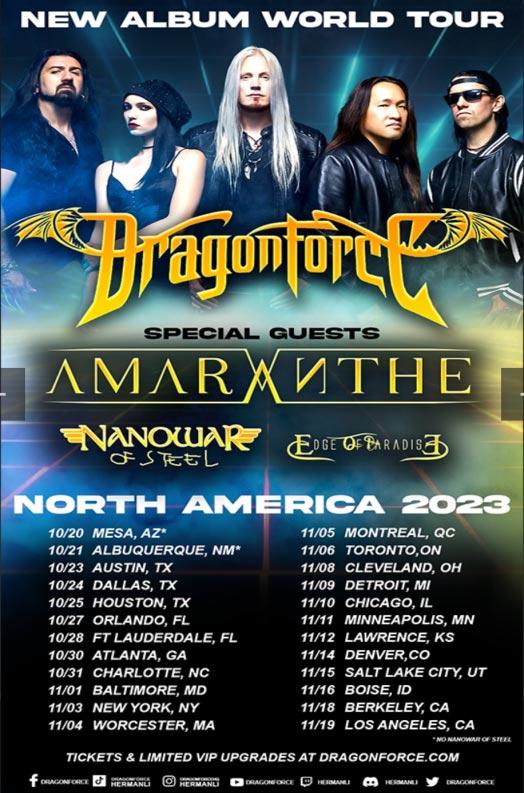

ROBBEN FORD ONLINE: Facebook @ https://www.facebook.com/RobbenFordOfficial/ Instagram @ https://www.instagram.com/robbenfordmusic/ Website @ https://www.robbenford.com/ Youtube @ https://www.youtube.com/channel/UClomWf9eUI74Uox9sikbeaA
“If a live recording really represents the best of you – that’s a real, and even rare success.” —Robben Ford

Robben Ford is, without doubt, one of the most exquisite blues guitarists of all-time, with a resume of collaborations reading like a veritable “who’s who”of musical greats. It is for this very reason he can call upon some of the finest musicians out there to create a band that serves the music so well. That’s why every album release is greeted with such excitement. Each listen is a musical journey undertaken to discover the wonders of his latest opus.
As a live performer, he is revered, pouring heart and soul into every note that travels from stage to audience. On his latest release Night In The City, this master of his craft is presented like never before. Recorded at City Winery, Nashville in 2021, it was Ford’sfirst performance after the COVIDlockdown —something which only added to the excitement and expectation from both band and crowd. As Fordstated,”It had been so long since playing a significant, live show that expectations were very much heightened. There was an edge that kept us all on our toes and the audience was hungry for a good time. They were very supportive, which was great, because we needed that.”
The superlative musicianship throughout is a joy to behold and something Fordin his role as bandleader was able to reflect on, saying,”The fact that I had such a great band is what made the evening for me. Each musician was the perfect man for the job and that helps a band leader relax. All the guys are top, in-demand players.”
With a set list that covers material old and new, an exceptional evening was captured to be enjoyed by all. You can already dive into it, as the previously unreleased track “Anto’Nate’n’Tate”is available everywhere as you read these lines. Night In The City will bereleased on December 1on earMUSIC as CD-digipak, 180g black vinyl in a gatefold sleeve and on all digital platforms.
Night In The City Tracklisting:
CD: ”Go”
”Blues For Lonnie Johnson”
”Cotton Candy”
”Balafon”
”Anto’Nate’n’Tate”
”Just Another Country Road”
”Pure / White Rock Beer…8cents”
”At The Apollo”
LP:
SIDE A: ”Go”
”Balafon”
”Pure/White Rock Beer”
SIDE B:
”Cotton Candy”
”Blues For Lonnie Johnson”
”Anto’Nate’n’Tate”
”Just Another Country Road”


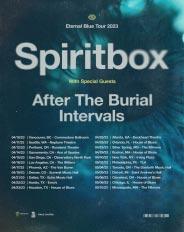
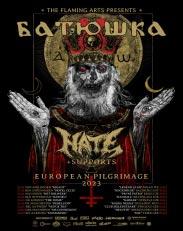
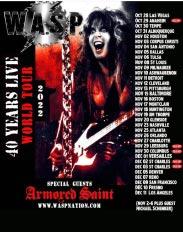
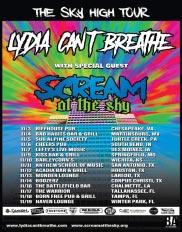
Extreme Metal Band SIGLOS Will Have Their Debut Performance at LA’s Gates of Metal Festival Spanish Black Metal, Doom, and Industrial Metal Band SIGLOS Will Perform For The First Time in Front of a Live Audience on October 15th
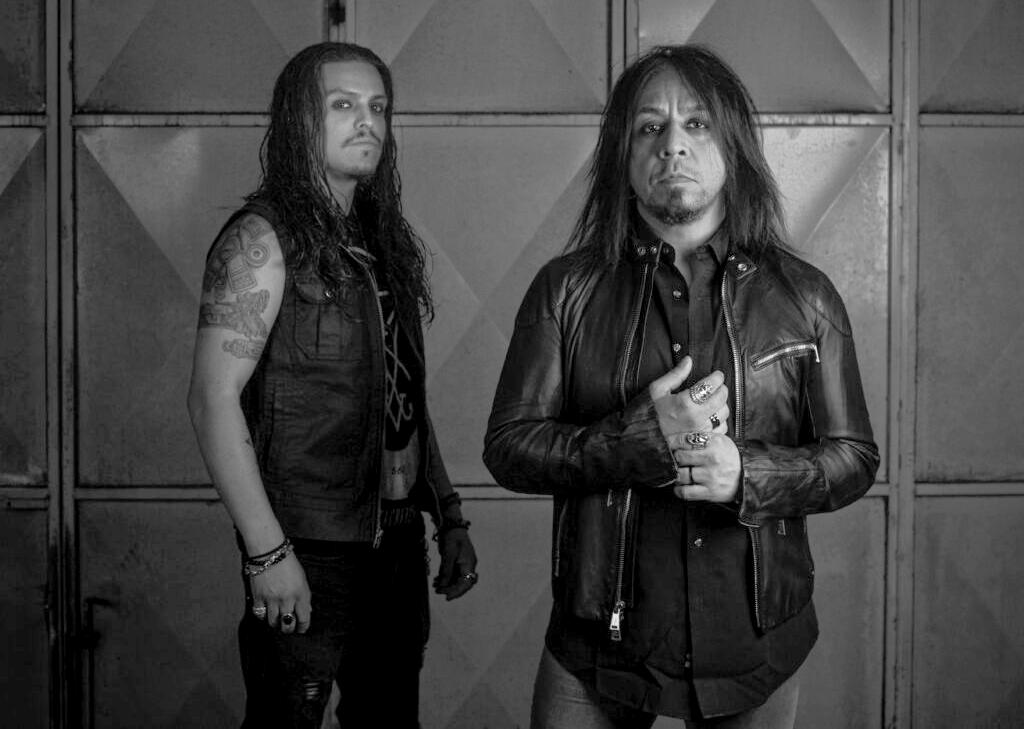
SIGLOS - Morir Para Vivir (Official Video) @ https://youtu.be/2PNj7MUnfjE
SIGLOS “Por Los Siglos” @ https://youtu.be/4CE4Bl4Ka9w
Listen to SIGLOS on Bandcamp: at https://siglos.bandcamp.com/
For more information on SIGLOS, please visit Instagram @ https://www.instagram.com/siglos_music/ Facebook @ https://www.facebook.com/SiglosMusic/ Spotify @ https://open.spotify.com/artist/0eBkSmbyXhGp8JgIP6OoXD YouTube @ https://www.youtube.com/channel/UCwJw_HIDQtrxqPEaiXt1Agw
(continued from previous page)
Based out of Los Angeles, California, SIGLOS combines extreme classic metal with Black, Doom, and Industrial Metal to evoke a raw and visceral listening experience. Band members include two-time Grammynominated guitarist, Sin Quirin (ExMinistry), and insanely powerful vocalist and member of Transtorno, Pedro Sanchez. Though they have established themselves a devoted fanbase and reputation in the metal world, SIGLOS has yet to perform live in front of an audience. This will all change on October 15th, thanks to the LA’s Gates of Metal Music Festival, where SIGLOS will perform live for the very first time in front of an audience, along with many other amazing names in heavy metal such as Sadistic Intent, Heathen, Evil Dead, Anger As Art and more. The festival will start at 1:45 pm at the Garden Amphitheater in Garden Grove, CA and will include two stages (a fanfriendly, open-air stage and an indoor stage), not to mention, countless metal merchants, vendors, bars, and food options all presented in an all-ages European Style Heavy Metal Festival. SIGLOS will be on at 3:00pm on the open-air stage for their first-ever live performance.
Gearing up excitement for the performance, SIGLOS released their new EP titled “Rituales Sagrados” in January of this year, and its unique sound gave metal lovers an immersion into their own spirituality, along with a deep dive into an intense, extreme, and evocative sound. By blending their Mexican and Spanish heritage into ritualistic lyrics, SIGLOS creates a dark atmospheric, and raw intensity, unlike the vast majority of modern metal bands. The combination of Pedro’s unstoppable vocals along with a deep-rooted exploration of the human condition in their lyrics take listeners on a journey through self-reflection and discovery. With new material on the way, their performance debut will only

be the beginning of an amazing fall for the band – hopefully with more live shows to come!
Sin Quirin expressed his excitement and gratitude for their ability to perform at the festival and shared, “It just hit me how real this is. Something about seeing our name on the ticket just made me flood with emotions. The last time I played onstage with a “heavy” band was 4 years ago. FOUR YEARS AGO. The ups and downs that I’ve gone through in these past four years is something that has forever changed me as a person. This show means a lot to me for so many reasons. I honestly thought I would never be back onstage with this type of band. So many people and things that have tried to keep me down, so many obstacles, and of course my own self-doubt. I am beyond excited and grateful for everyone that has joined me on this journey and can’t wait to unleash our style of Metal”
Pedro Sanchez says “I am very
excited to manifest on stage what we have been working on in the studio for some time, and honored to perform at the LA’s Gates of Metal for our first appearance. We have been working very hard on this album “Rituales Sagrados’’ and are excited to bring something new to the world and to the music industry with Sin’s guitar riffs, with my lyrics and vocals, with our message, our essence and spirit of this new entity we have created called “SIGLOS”. -
SIGLOS is a heavy metal band combining aspects of Black Metal, Doom Metal, and Industrial Metal. The group features lead guitarist Sin Quirin, formerly of Ministry, Lords of Acid, American Head Charge and Society 1, and lead vocalist Pedro Sanchez of Transtorno. The pair blend their Mexican and Spanish roots into the dark undertones, psychedelic, selfreflective lyrics and chanting rhythms, creating a dark, raw, and honest portrayal of the human condition.

It’s been ten years since the release of Avicii’s iconic album True and generations of fans are still singing along to the melodies. In honor of the album’s 10th anniversary, Pophouse and UMe are proud to announce a remarkable tribute to the music that has touched hearts and inspired a generation, through the release of unfiltered footage of the album’s creative process, including never-beforeseen clips.
True is the groundbreaking debut studio album by electronic dance music pioneer, Tim ‘Avicii’ Bergling. Released in 2013, the album seamlessly blended electronic dance music with elements of folk, country, and soul, creating a unique and genre-defying sound. Featuring hit tracks like ”Wake Me Up” and ”Hey Brother,” True showcases Avicii’s ability to transcend musical boundaries and connect with a wide range of listeners. The album’s innovative fusion of electronic beats and acoustic instruments has left an enduring impact on the music industry, solidifying Avicii’s legacy as one of the most influential house producers of all time, and his music is considered the soundtrack of a generation.
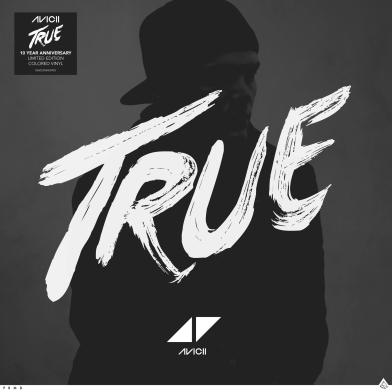
On September 13th, the same date as the album’s initial release, a wide array of content was be offered to fans, ranging from short-form pieces tailored for TikTok and YouTube Shorts to indepth, long-form content that provides an intimate look into the album’s creative process.
As an example, footage from the ”True Tour” was be released, letting fans re-experience a memorable act seen from the audience’s point of view. In another segment of the celebratory tribute, unfiltered footage of the making of ”Addicted to You” was showcased, including never before seen clips.
Fans worldwide can also join in the celebration of Avicii’s seminal and record-breaking album through the announcement of two new limitededition vinyl formats*. True will be reissued on an exclusive new color, whilst the remix album True: Avicii By Avicii is releasing on vinyl for the first time.
The story behind the album is notable. In March 2013, Avicii unveiled new music from the upcoming album True during a highly anticipated performance at the Ultra Music Festival in Miami. Fans were excited to hear the follow-ups to hits like “Levels,” but Avicii surprised everyone by bringing out a live band to perform a bluegrass
and soul-inspired project. Initially, the crowd was unhappy, and Avicii received loud boos. The sound was not the typical progressive style that the audience had come to expect. However, Avicii took a bold risk and premiered the first versions of “Wake Me Up” and “Hey Brother.” Despite the negative feedback, Avicii had a vision for his music that he knew would resonate with his fans, and he
stuck to it.
His vision paid off, as the album peaked at number one on the U.S. Billboard Dance Charts and went multiplatinum in various locations. True was a game-changer for the dance industry, and it solidified Avicii’s place as one of the greatest DJs, music creators, and producers of all time.


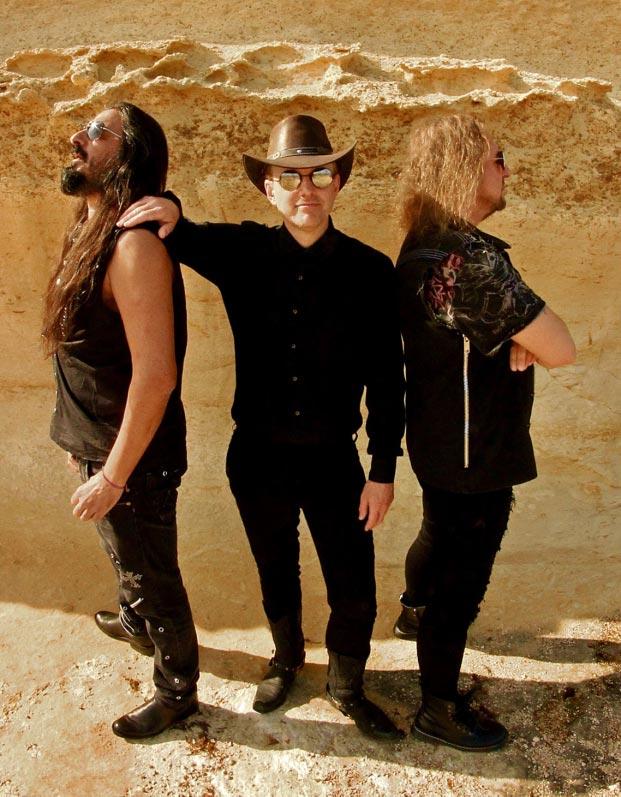
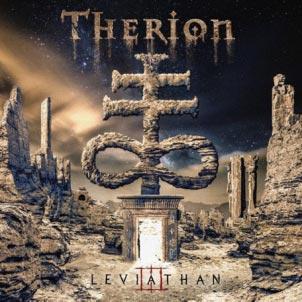
Swedish symphonic metal legends THERION have unveiled the first single, “Twilight of the Gods”, off of their upcoming album, Leviathan III, out December 15, 2023 via Napalm Records! With the new album, THERION return to deliver another masterpiecefulfilling the Leviathan trilogy. With more than 35 years under their belts, the band around mastermind Christofer Johnsson is considered one of the most style-defining acts of symphonic metal. Down to the present day, Johnsson claims Swiss Celtic Frost and their way to combine opera vocals and orchestral instruments in the late 80s as one of his main influences back in the days, leading to THERION’s Symphony Masses (1993) and Lepaca Kliffoth (1995) to set the stages for the genre in the early 90s, followed by symphonic metal milestone Theli in 1996.
“Twilight of the Gods” delivers the finest of epic and symphonic metal, finding a harmonious and balanced blend between guitars, choirs and orchestra. Join THERION on their versatile and style-melding musical journey, and watch the brand-new official music video for “Twilight of the Gods” below!
The album sets off with the powerful “Ninkigal”, catapulting the listener directly into the dramatic universe of THERION with skillfully crafted compositions and operatic female vocals by Lori Lewis, alternating with grim growling and pleasing melodies. It’s followed by “Ruler of Tamag”, enchanting with a gentle acoustic guitar intro and lingering female vocals that open up to a fairytale-like scenario of old times. This then bursts into a heavy track with gloomy parts, building up to a fascinating score-like symphony. THERION once more draw charm from the courage to mix styles ranging from gothic parts to melodic death metal and neo-classical elements to power metal in a complex and versatile way, thus challenging their listeners. The songs are quickly engaging and skillfully employ catchy melodies, as witnessed on uplifting tracks like “An Unsung Lament” and “Baccanale”. Advancing melodies are combined with rock elements, captivating lyrics and choir parts, while lively “Maleficium” is structured around a duet between Thomas Vikström and Lori Lewis. Stomping “Ayahuasca” is a true musical journey featuring a male choir and psychedelic elements, while speedy “Nummo” offers splendid hard guitar explosions and the finest classic vocals and choirs.
Overall, the compositions lean towards the magnificent and theatrical, offering a high variety of musical styles while deftly blurring the boundaries of metal and classical music. With their newest opus, Leviathan III, mastermind Christofer Johnsson proves his incredible talent once more, and that THERION have perfected their very own combination of versatile styles - resulting in the creation of a symphonic league of their own.
THERION are:
Christofer Johnsson – guitars and keyboards
Sami Karppinen - drums
Nalle “Grizzly” Påhlsson - bass
Thomas Vikström – lead vocals
Christian Vidal – guitar
Lori Lewis – vocals
Leviathan III tracklisting:
1 Ninkigal
2 Ruler Of Tamag
3 An Unsung Lament
4 Maleficium
5 Ayahuasca
6 Baccanale
7 Midsommarblot
8 What Was Lost Shall Be Lost No More
9 Duende
10 Nummo
11 Twilight Of The Gods
Leviathan III will be available in the following formats:
6-Page Digipak CD
2LP Gatefold in Black
2LP Gatefold Silver LTD to 500 copies
Die Hard Deluxe Edition Gold / Black Marbled Album Cover Slipmat, Covert Artprint & Alternative Album Cover Artprint LTD to 300copies
Digipak Bundle Pendant, Cotton Bag, Patch
Digipak & Shirt Bundle Shirt
Die Hard Deluxe Edition Gold / Black Marbled Vinyl + Album Cover Slipmat, Cover Artprint & Alternative Album Cover Artprint – ltd. to 300copies
Pigs Pigs Pigs Pigs Pigs Pigs Pigs
Shares New Song “Terror’s Pillow”
From Upcoming Album Live In New York
Out October 27th Via Missing Piece Records Returning to The U.S. for Select Dates this Fall
Listen to “Terror’s Pillow” (Live) at https://youtu.be/2g3828t5J44
Live performance video of “Terror’s Pillow” at https://youtu.be/Gh2IcMi-Yxo
Stream/order Land of Sleeper available at https://pigsx7.ffm.to/landofsleeper Available for pre-order here at https://lnk.to/Pigsx7_LiveinNewYork
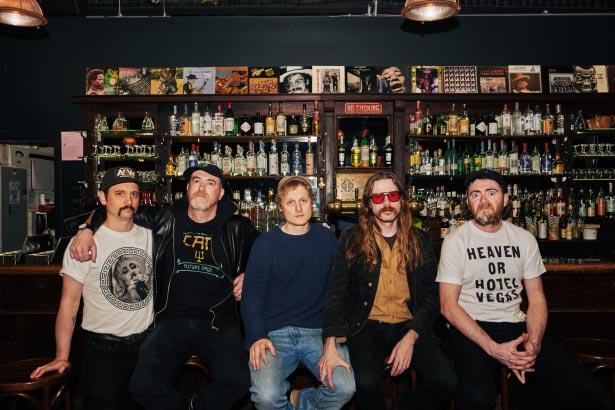
Pigs Pigs Pigs Pigs Pigs Pigs Pigs – Ultimate Hammer (Official Video) at https://youtu.be/8RrCPlTiyJQ
Watch the video for “Mr Medicine,” at https://youtu.be/hKjoURaktGw
(continued from previous page)
The Newcastle, UK-based group Pigs Pigs Pigs Pigs Pigs Pigs Pigs shared their new track “Terror’s Pillow” (Live) from their upcoming live record, Live In New York. The album showcases their fiery live show from their April 2023 performance at New York City’s Mercury Lounge, on their recent tour in support of the acclaimed LP Land Of Sleeper. Live In New York will be released via Missing Piece Records.
The group also recently shared the newly emerging fan favorite “Big Rig” from the album, a spiraling metal odyssey which oscillates between hard driving space-punk thrash and sludgeladen, tectonic riffs.
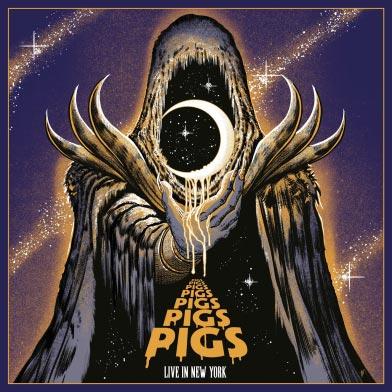
Drummer Ewan Mackenzie says “our show at Mercury Lounge in Manhattan NYC was the last date of our North American tour, and the final chapter of a wonderful musical adventure for us. We had already had the privilege of playing at St. Vitus in Brooklyn at the start of the tour, and so returning to NYC again felt like a kind of homecoming. The atmosphere was electric that night, there was magic in the air and a special connection among everyone in the room.”
Mackenzie continues, “‘Big Rig’ is such a joy to play, like a journey in itself, with big changes, breakdowns and tangents: you feel like you’re hanging on for dear life as the song sweeps you into another mind-bending section.”
Live In New York comes in the wake of tours across the UK, Europe and North America, festivals across the UK, Greece, Norway, Latvia, Belgium, Netherlands and Germany and the release of their killer live KEXP session. The band’s 2023 album Land of Sleeper
(currently available on vinyl and streaming services) has been praised by Pitchfork, Clash, The Line of Best Fit, and more. Videos were released for the coruscating “Ultimate Hammer,” a highoctane sonic ride that melds classic riffage with the group’s predilection for offbeat chaos, and “Mr Medicine,” the audio equivalent of sticking a fork in plug socket. They also previously released a blistering live performance video of the track “Terror’s Pillow” at https://youtu.be/Gh2IcMi-Yxo
Land of Sleeper is the heavypsych/garage-rock band’s fourth studio album and follows 2020’s Viscerals, which Under The Radar described as a “sense bludgeoning amalgamation of metal, punk, and experimental noise at its most brutal,” while Louder declared it “Utterly enthralling.” Kerrang writes, “melding the fuzzed-up, stripped-back
muscle of heavyweights like Black Sabbath and Motörhead to progressive sludginess, then pouring on a generous helping of the wryly abstract humor of IDLES, this third album is a strange, unruly offering.”
Live In New York Tracklist:
01. Mr Medicine (Live)
02. Rubbernecker (Live)
03. Ultimate Hammer (Live)
04. World Crust (Live)
05. Big Rig (Live)
06. Terror’s Pillow (Live)
07. GNT (Live)
08. A66 (Live)
U.S. Tour Dates:
10/29/23 - Austin, TX - Hotel Vegas
10/31/23 - Troy, NY - No Fun Festival
11/01/23 - New Haven, CT - Space Ballroom
11/02/23 - Boston, MA - The Sinclair
11/03/23 - Brooklyn, NY - Elsewhere
11/04/23 - Washington, DC - Atlantis
Follow Pigs Pigs Pigs Pigs Pigs Pigs Pigs Online At: WEBSITE @ https://www.pigsx7.com/
FACEBOOK @ https://www.facebook.com/PigsPigsPigsPigsPigsPigsPigs
INSTAGRAM @ https://www.instagram.com/Pigsx7/ TWITTER @ https://twitter.com/Pigsx7
YOUTUBE @ https://www.youtube.com/channel/UCRExiGCI3MEEEjTVv-c1mFg
SPOTIFY @ https://open.spotify.com/artist/1F7QDWyZTLGzkyGLgFjEhU
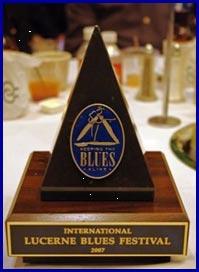
You would have to be living under a rock not to know who Dr. John was, he’s gone now but his music remains. The man could lay down the blues and he did it for an entire lifetime. His call to fame was both his gravely voice and his masterful tempos on the piano. With Dr. John you felt the blues more than just listened to them and that is exactly how it is supposed to be. The man was cool to the max. Today there’s somewhere around one hundred blues festivals in the U.S. alone and when it comes to Europe well the Europeans know how to treat blues artists. The blues is universal and to think that about seventy years ago leading into the sixties it was known as race music. Forward thinking recording studios and record labels such as Chess Records in Chicago let the genie out of the bottle with my good friend Max Cooperstein booking black acts on Dick Clark’s American Bandstand. It was unheard of but once that sound made the main stage on television Katy bar the door music lovers wanted more. Years would go by and people like Keith Richards and Mick Jagger would praise the works of such blues artists as Muddy Waters and many others. Their on stage presence was effected drastically and years later they would perform with one of their idols John Lee Hooker. It’s simply because the blues be talkin’ to me, talking to me, you and literally millions around the world. Max shared with me that Muddy was not sure of going to England to perform, he wasn’t sure the nation would accept him. Other Chess artists convinced him it was a good move and finally he gave in. When the plane landed it pulled up to the steps so the performers could exit the plane and there was this bright red carpet waiting for them along with literally hundreds of fans. Muddy was blown away and extremely happy that he could see their music being appreciated by throngs of Brits. It continues, today the Lucerne Blues Festival in Switzerland sells out the very next day after their current event ends and that is without anyone knowing who the performers will be the following year. The blues world has what is known as The Blues Foundation which resides in Memphis. The blues is so popular worldwide that they have over one hundred blues societies around the world. Blues festivals now exceed over one hundred shows annually both here in the states and abroad. Literally hundreds of radio stations are either dedicated to the blues alone or
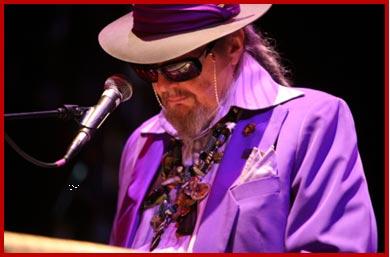
continued on next page
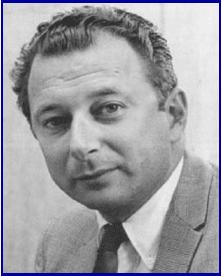
host blues show hosts once per week. One such station is KPFT which presents twelve hours of all styles of blues every Sunday. People tune in digitally from around the world.

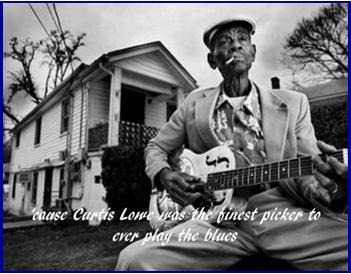
Just about every artist in every genre will tell you that they started out with the blues. It touched them and still does. It’s rather unique that young people may think that the blues is something for their Mom and Dad until they learn how many of their favorite artists and bands are laying down the blues. ZZ Top as one example presents a driving down home beat with lyrics that reflect on life such as can be found in their famous song “La Grange”. In his early days Jimi Hendrix traveled to Chicago just to watch Buddy Guy lay it down and came away totally blown away. Buddy’s creations include “Damn Right I Got The Blues” and much of what you hear is not only his original style but pieces of what he picked up from the previous generations. No doubt that Janis Joplin could present what was in her heart as she performed on stage after stage. Yet for young music lovers, even though they love these artists most do not know they are enjoying the blues. The bottom line is that the blues be talkin’ to me and to you and it hasn’t stopped. Today aspiring talents such as blues rocker Clay Melton, Ally Venable, Anika Chambers and many more are welcomed with open arms by the stars of today including Janiva Magness, Diunna Greenleaf, Kenny Wayne Shephard, Trudy Lynn and a host of additional high demand artists. Why is this happening is the question? Because the blues is in their heart, in their soul. As I travel around the United States on two wheels I meet the coolest, hippest people on God’s green earth in blues clubs from city to city. The blues scene can be a bit sultry as it attracts all kinds including all sorts of down to earth souls and the good news is all are welcome. The famous song “The Ballad of Curtis Lowe” is a prime example of a young white person finding the blues in an older black gentleman who would play the blues everyday for spare change. The young man was intrigued with this man’s music so much so that he would go and collect pop bottles, turn them in just to give Curtis some money to play the blues for him. You feel the blues and you can feel it at any age. The blues isn’t just blues rock or slow blues or any one kind of style, it’s just the blues. Europe’s Maria Daines sings a song titled “Low Down Dirty Love” and she delivers it brilliantly. Her presentation is believable, it’s like she’s been there done that although maybe she hasn’t but she can relate. If you have ever fallen in love with the wrong person you know it’s a low down dirty love but you just can’t give it up. Some blues numbers are delivered rather tongue in cheek. Take for example Lonnie Mack’s song about being addicted to Oreo cookies. Too funny and yet rather believable because whether it’s Oreo cookies or Harley Davidson motorcycles or something else that fascinates
continued on next page

you it is indeed a humorous addiction. One that can’t hurt but is there. Blues is true American roots music. Janis sang a song that included the verse “nothing left to lose and nothing ain’t nothing unless it’s free”. A song about being with someone you love and yet being free. Me, I hang with my scooter and together we meet all sorts. My lifestyle doesn’t have to be this way but it’s that low down dirty love of being free, of being a free soul that allows me to experience people and regional cultures. The Allman Brothers coined it right in the song “Midnight Rider” with the lyrics “some ole bed I’ll soon be sharing”. This lifestyle can be lonely especially when you see couples and families with pets and kids. A person cannot have those things for very long on the road. Yet I meet ladies that have it together who are alone too and we bond sometimes for a night,
sometimes for a week but we both know that one day when the sun rises one of us will say adios. I run into an exotic dancer that moves around too. I see her every once in a while in different cities. I’ve never asked her why nor has she asked me why but we have a soft spot for each other in the most bizarre way I suppose. Just as I can listen to slow blues and get lost in the music the same goes for a woman who is classy enough to present an alluring stage presence. Sometimes a blues rocker performs and lights up the night and his or her performance is top shelf, that sets me free as well. I would imagine there are things that set you free or perhaps you have put yourself second due to traditional upbringing and values. Listen to me; once in a while you got to let the badger loose because you are only going around once. Right now, today, set yourself free - at least a little bit. Pour a cold one, go to You Tube and choose a slow blues album, and sit back for awhile. If you can’t get away then arm chair it. Let your mind relax, dream, be unaware of the rigors of daily life even if it’s just for a short while. You will come away smiling, maybe even refreshed. The blues baby can do that for you, go on, you know you want to and who knows maybe one day you will set yourself free for a weekend and take in a blues festival. Hundreds of others that you don’t know. That could be cool. A lawn chair maybe with someone you love, a cooler and a good attitude. It can do wonders for the mind. So many interesting people in the world many of them just like you and me. If you do get away and you see a red chopper with a long rake on the front end ask the owner if he writes a column about the blues and getting away. See you down the road…
